9 things I learned in my first 6 months RVing full-time

Almost four years ago, my husband JT and I gave up our apartment and sold or donated almost everything we owned. Then, we hit the road as global digital nomads . We didn't have a home base for about three years while globetrotting. But, when we returned to the U.S. amidst global lockdowns last March, we had nowhere to call home.
We initially self-quarantined in a family member's unoccupied lake condo. And then we spent a few months living with family members. But as the pandemic continued, it became apparent we wouldn't quickly be resuming our global travels. So, we knew we needed a place to call home.
Put in the same situation, most people would have rented an apartment or booked month-long hotel stays . But after relocating an RV from Los Angeles to Dallas last July, we decided to buy the same RV model in August. And then, we moved into the RV full-time on Sept. 1, 2020.
Before our rental over the summer, we'd only done one previous RV relocation for $1 a day . So we had a lot to learn about RVing . Today, I'll share nine things I learned in my first six months of full-time RVing.
Get the latest points, miles and travel news by signing up for TPG's free daily newsletter .

There are many ways to RV
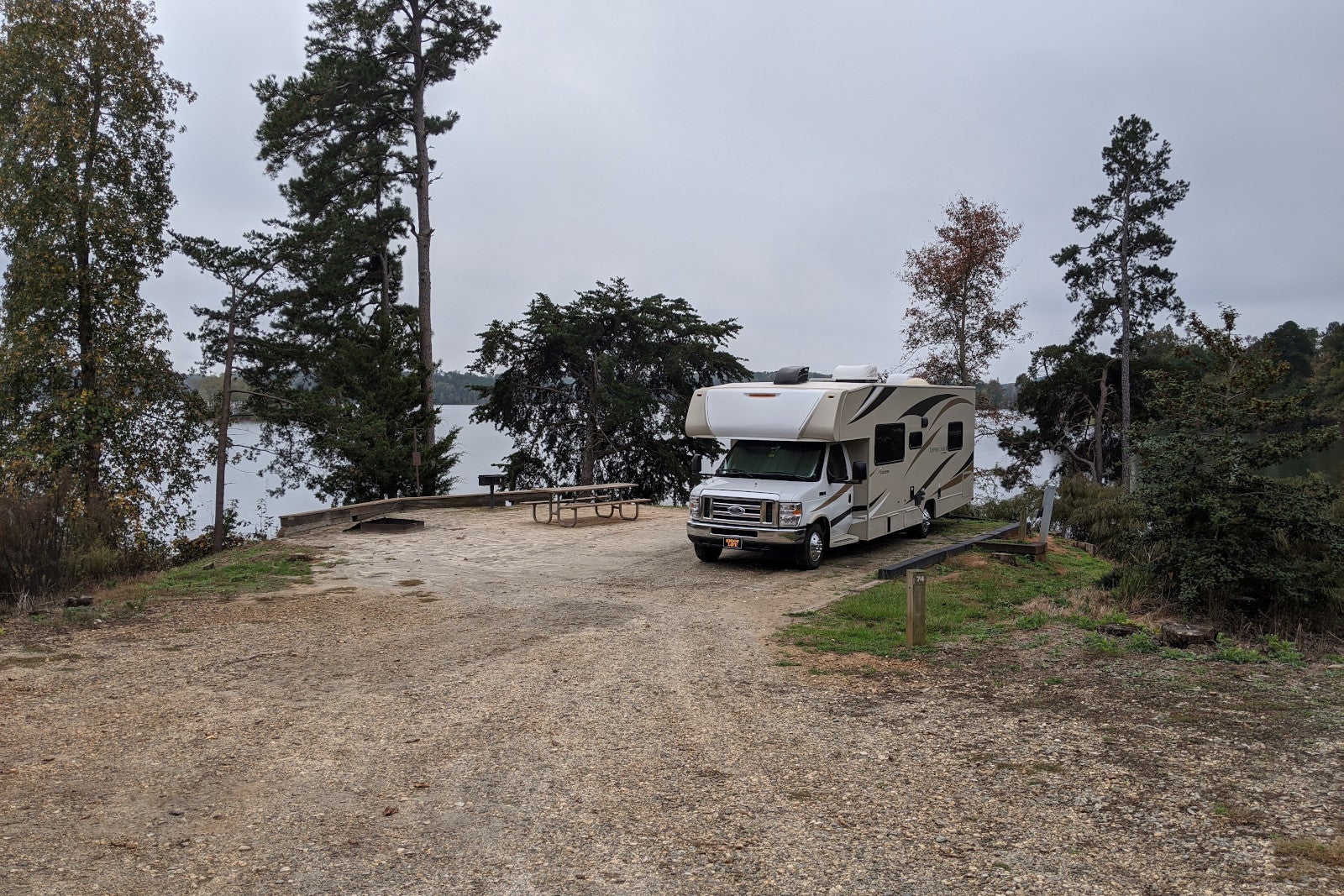
Before we started living out of our RV full-time, I had some preconceived notions about RVing. But, I quickly learned there are many ways to RV. And, what works best for one traveler may not be best for another.
For example, there's no set price that you should pay for campsites. Sure, it's possible to pay very little for campsites. After all, you can often camp on national lands for free or cheap. And some businesses such as Cracker Barrel and Walmart may allow you to park overnight for no fee. But, on the other end of the spectrum, some RV campsites cost more than $100 per night and offer hotel-like amenities . And of course, there's also a middle-ground of campsites that cost between $20 and $40 per night.
Likewise, there are many types of RVs. Walking around most campgrounds, we typically see luxury campers , pop-ups campers, converted school buses, fifth wheels, trailers, camper vans and vehicles with roof-top tents. Some of these RVs cost under $10,000 while others cost more than $200,000. And each type of camper is suitable for a particular kind of traveler.
Finally, there are many different RV travel styles. Some campers move each day while others stay at the same campground for an entire season. Many campers have outdoor furniture, while some trailers look like they could pull out at any time. And some RVers plan out their travels a year in advance to snag desirable reservations, while others book campsites as they go.
Related: Enter to win prizes by writing about your camping experience on national lands
Flexibility is key
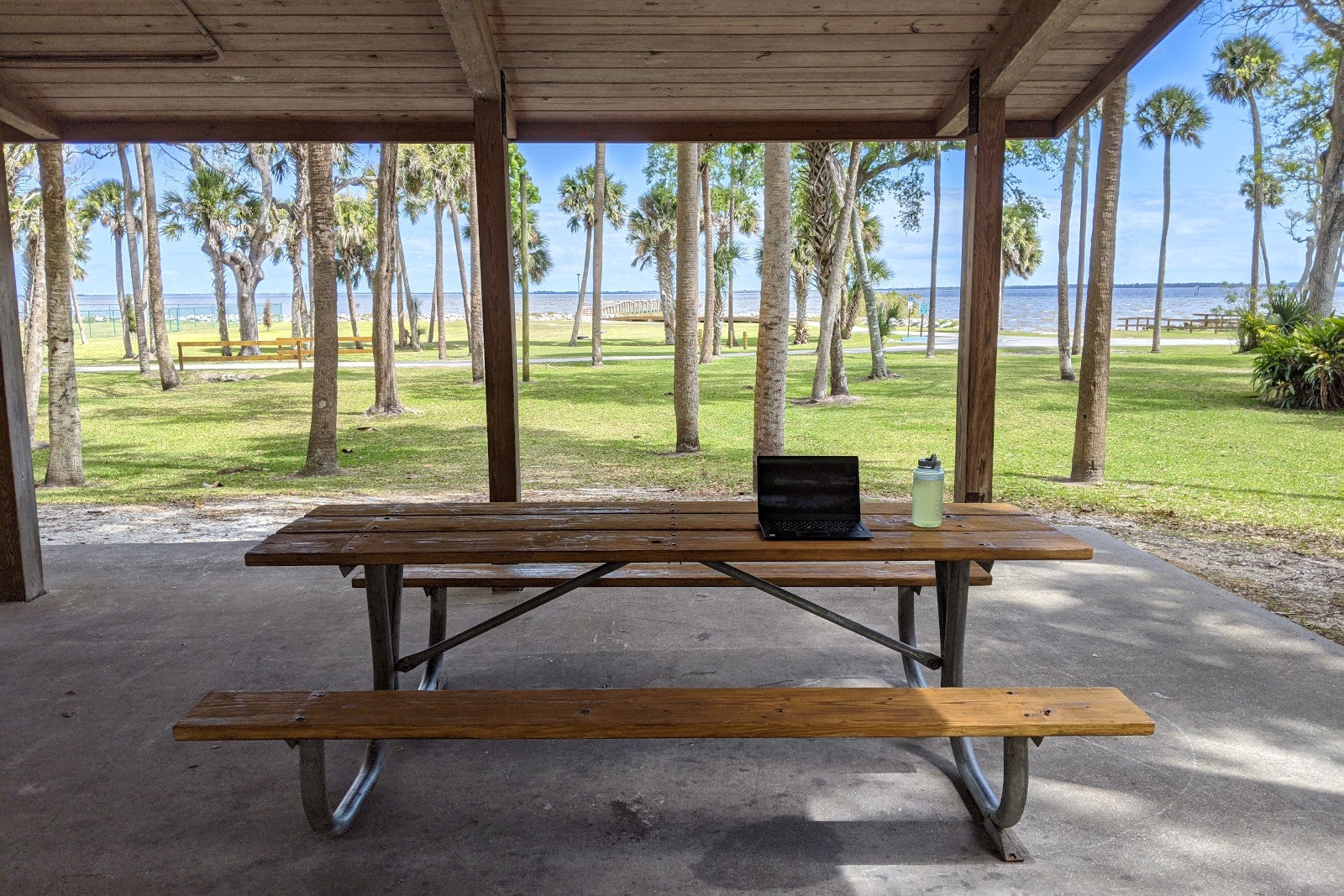
For us, embracing flexibility has been critical in our first six months of RVing. We're naturally planners: we have spreadsheets of hotel reservations that go back years and forward into 2022 . But, we've found that we prefer booking campsites as we go. And, as we start to take one-off international trips by plane this summer while still living part-time out of the RV, I expect this flexibility will become even more critical.
Flexibility is also critical when living and working remotely in a small space with another person. I frequently work outside at our site's picnic table or a campground pavilion. But RVing inherently means you'll spend a lot of time together with your travel partner(s). This togetherness has been relatively easy for us since we were already used to living and working together as global digital nomads . But, from talking with other campers, being together all the time is a struggle for some people.
Related: 6 things you should know before you rent your first RV
High-speed internet isn't a problem
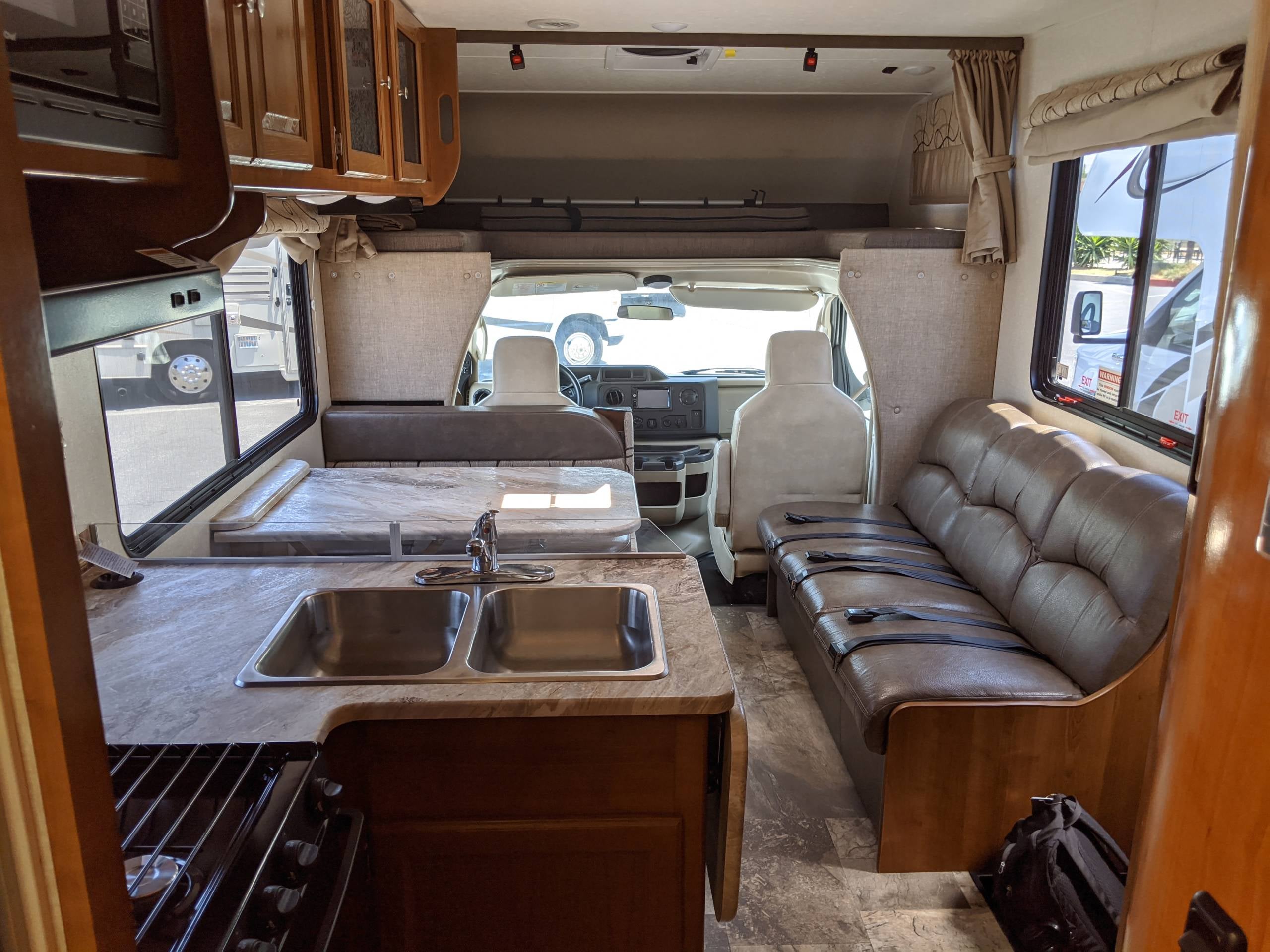
When we decided to live and work from an RV, I assumed high-speed internet would be a struggle. We don't need a lot of data since we each only use about one GB per day on our laptops. But, reliable and relatively quick internet is necessary if we want to work effectively.
Some campgrounds offer Wi-Fi. But, campground Wi-Fi is typically slow and often unusable. So, we primarily hotspot data from our phones to our laptops. We each have a Verizon Get More Unlimited plan, which gives us each 30 GB of 4G LTE hotspot data each month and unlimited data on our phones. So, I do all most work video calls on my phone. We also have a T-Mobile backup hotspot, but we haven't needed to use it yet.
We also bought a cell booster to help in areas with weak cell service. But, we've mostly avoided using the cell booster by using online resources to filter out campgrounds with poor Verizon cell service. For example, Recreation.gov includes cell coverage strength ratings for Verizon, T-Mobile, Sprint and AT&T as part of its review system. And for other campgrounds, I check Campendium. By using these two resources, we haven't experienced any significant connectivity issues.
Related: Use these cards when paying your cellphone bill
Know what you want before buying
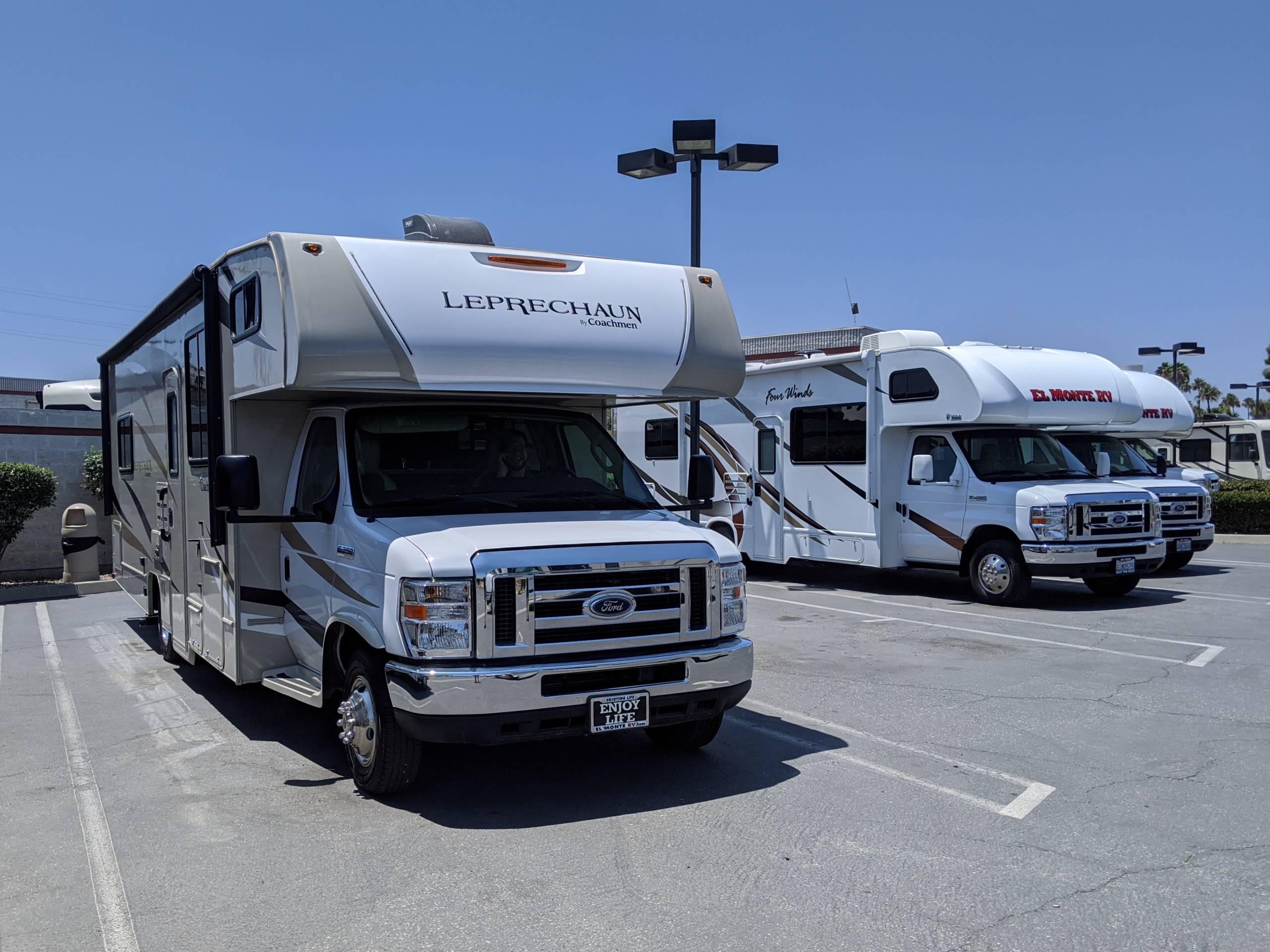
There are many different types of RVs. And, my fellow TPG colleagues have tried out several different styles. For example, TPG's Richard Kerr bought a trailer to tow behind his truck. And TPG's Summer Hull rented a luxury Class A motorhome . Meanwhile, TPG's Chris Dong rented a van to try out van life.
We opted for a Class C RV, which is effectively a truck cab with a huge box attached where the truck bed would typically be. We decided on this type of vehicle since we didn't own a vehicle before buying our RV. And we knew the specific RV we purchased would work for us because we'd just relocated the same model from Los Angeles to Dallas . Plus, we love that one of us can work at the table in the back while the other one is driving.
Assuming you don't buy the exact model you relocate as we did, you can still try out what you're looking to buy. In particular, I recommend renting your model or a very similar model before you buy. Luckily, sites like RVshare allow you to rent RVs directly from owners. So, you can likely find the model you're planning to purchase and test it out beforehand.
Related: Don't make these 5 mistakes when buying your first RV
You can park your RV at the airport
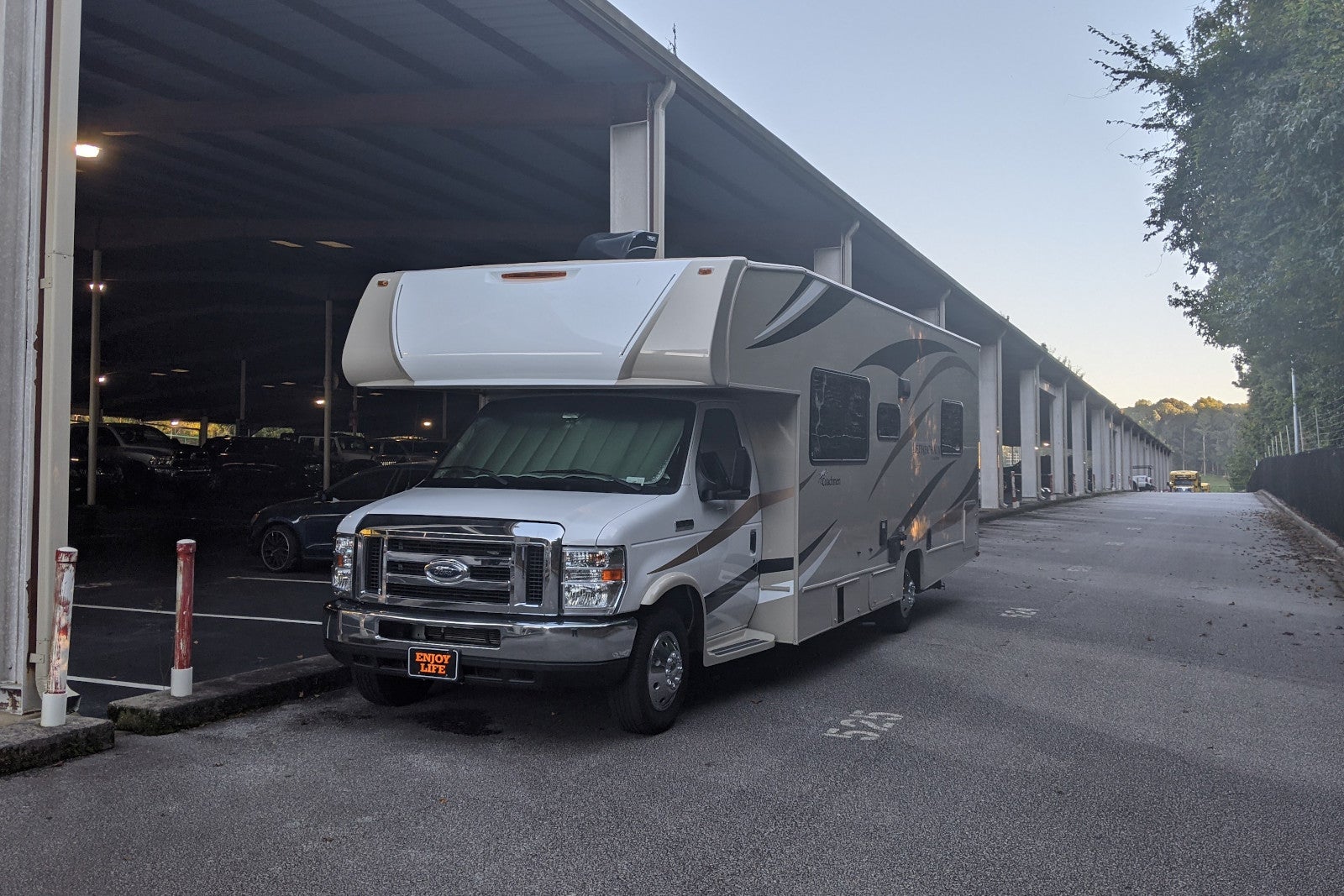
We took a mid-pandemic trip to Istanbul, Turkey , last October. And we expect to restart international travel once we're fully vaccinated with some one-off trips while still living out of the RV. But, we wondered what we'd do with our RV while on these trips. After all, most RV storage solutions are set-up for RV owners who want to store their RV monthly or annually near where they live.
As I searched for a solution for our Istanbul trip, I found a few websites that list monthly RV parking solutions. As I scrolled through options on one site, I noticed several listings for an Atlanta airport Parking Spot. JT called the Parking Spot and we learned that they'd be happy to let us park our RV at their lot during our trip for a modest rate.
I'm not sure whether other Parking Spot locations will allow RV parking. But this experience reinforced the idea that we can likely find airport parking near most airports that will let us pay a modest amount to park our RV. After all, we can fit our RV in two back-to-back parking spots.
Related: Maximizing rewards and discounts on airport parking
Little things can be difficult
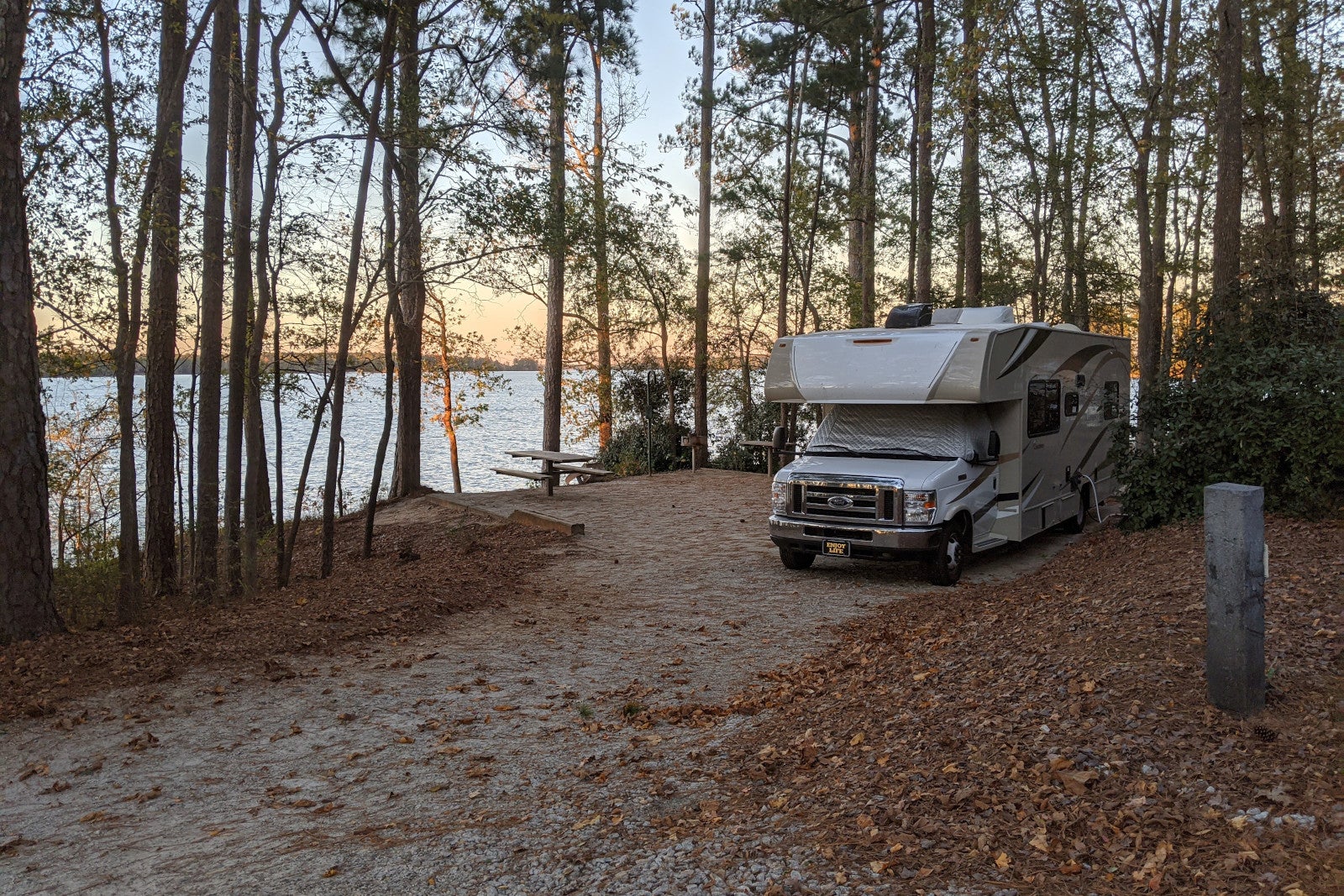
Some little things that are easy for most home dwellers are significantly more difficult for us while RVing. For example, here are some of the initially unexpected struggles we've faced:
- Picking up food is difficult because our RV is too tall for most drive-through lines and too long for most curb-side pick-up zones
- Many campgrounds don't accept packages, so getting Amazon deliveries or utilizing Amex Offers (such as Wine Insiders ) requires extra planning
- Our gray and black tank sensors rarely give correct readings, so it's difficult to determine when these tanks are full
- Using a drive-through COVID-19 testing center was awkward since our RV was too tall to follow the designated path
- Parking the RV at some businesses, such as a vet when our cat needed care and several hotels when we've needed unlimited internet, hasn't been particularly easy (we've learned to call or look at businesses ahead of time using Google Maps satellite view)
Of course, we could avoid some of these difficulties if we had a second vehicle. Most RVers either have a car they tow behind their RV or use a vehicle to tow their RV. But we only have our RV. As such, we have to go everywhere in our RV. We could solve this issue by buying a car or motorcycle, but we don't want to put the money into another vehicle right now.
Related: Travel is getting harder — and pricier
Some things are more straightforward than I expected
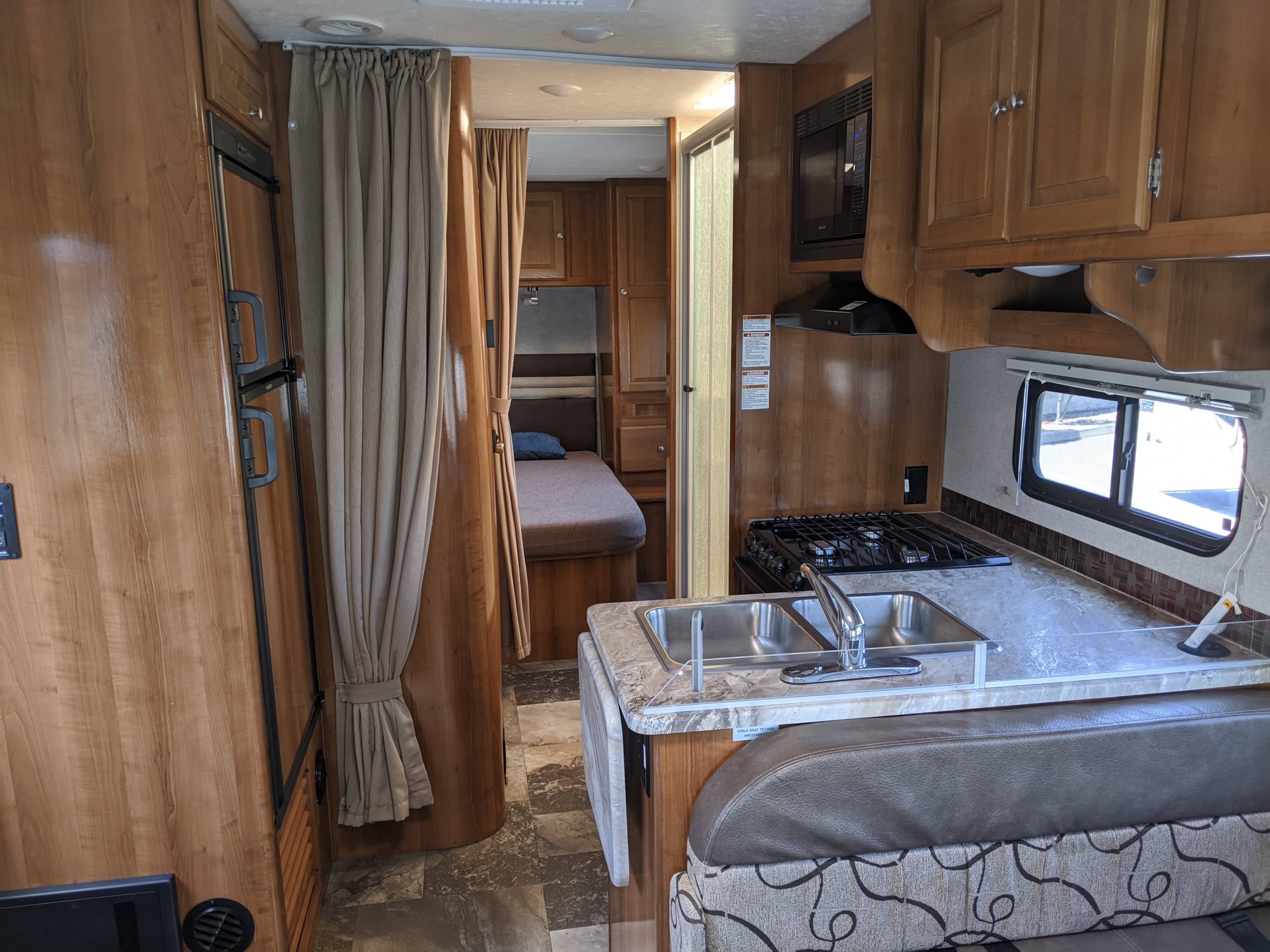
After noting some struggles in the last section, it's important also to mention that some parts of RVing are more manageable than I initially expected:
- Last-minute campsites for at least a few nights have been relatively easy to find
- Our 15-year-old cat Grace has settled into RV life well
- Cooking in the small kitchen has gone well
- Dumping black and gray tanks is scary for some RVers , but it hasn't been so bad for us
- Online resources, especially YouTube, make fixing some issues relatively easy
One aspect of our RV that we underappreciated when we bought it but love having it now is the back-up camera. Unless you have experience driving a large vehicle, I highly recommend ensuring your RV has a back-up camera.
Related: Going on a road trip? Consider using these credit cards
Handiness is essential
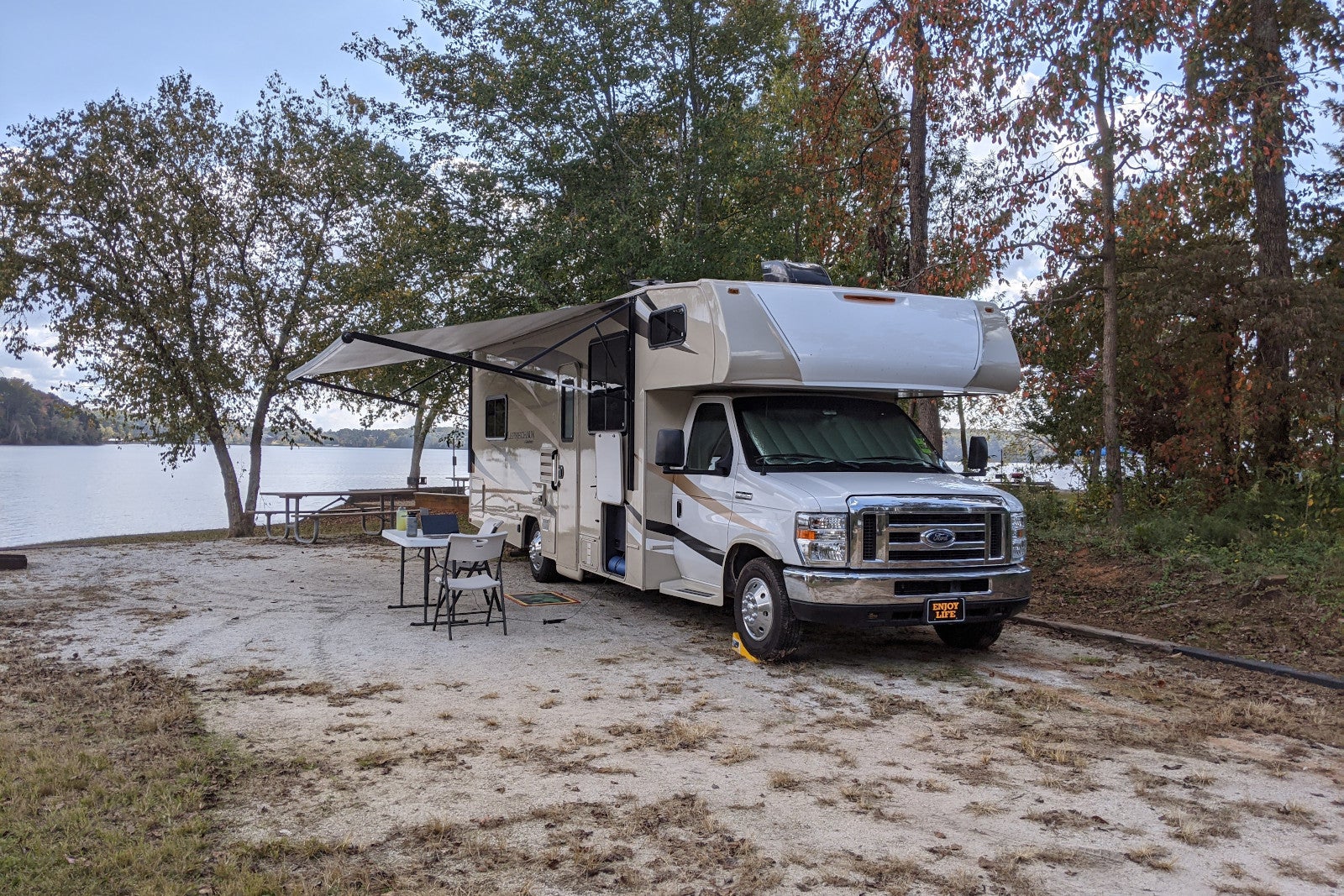
JT and I are not handy. But, we've had to learn some basics since maintenance and repairs are ongoing with our RV. We've learned a lot about our RV in the first six months, from identifying and stopping water leaks to fixing annoying squeaks and tightening screws.
YouTube and RV forums online have been helpful, but we've made some ridiculous beginner mistakes along the way. For example, we found that our city water connection (which allows you to hook up a freshwater hose at a campground to your RV's plumbing system) was leaking out the side of our RV soon after we bought it. We assumed something was broken. But after dealing with this issue for about a month, we determined we needed to put a rubber washer between the hose and our connector.
We've made other silly mistakes, but we've also become handier in our first six months of RVing. However, RVing will be easier from the start if you're already handy.
Related: What I learned on my RV trip from hell, and why it was still fun
Set a realistic itinerary
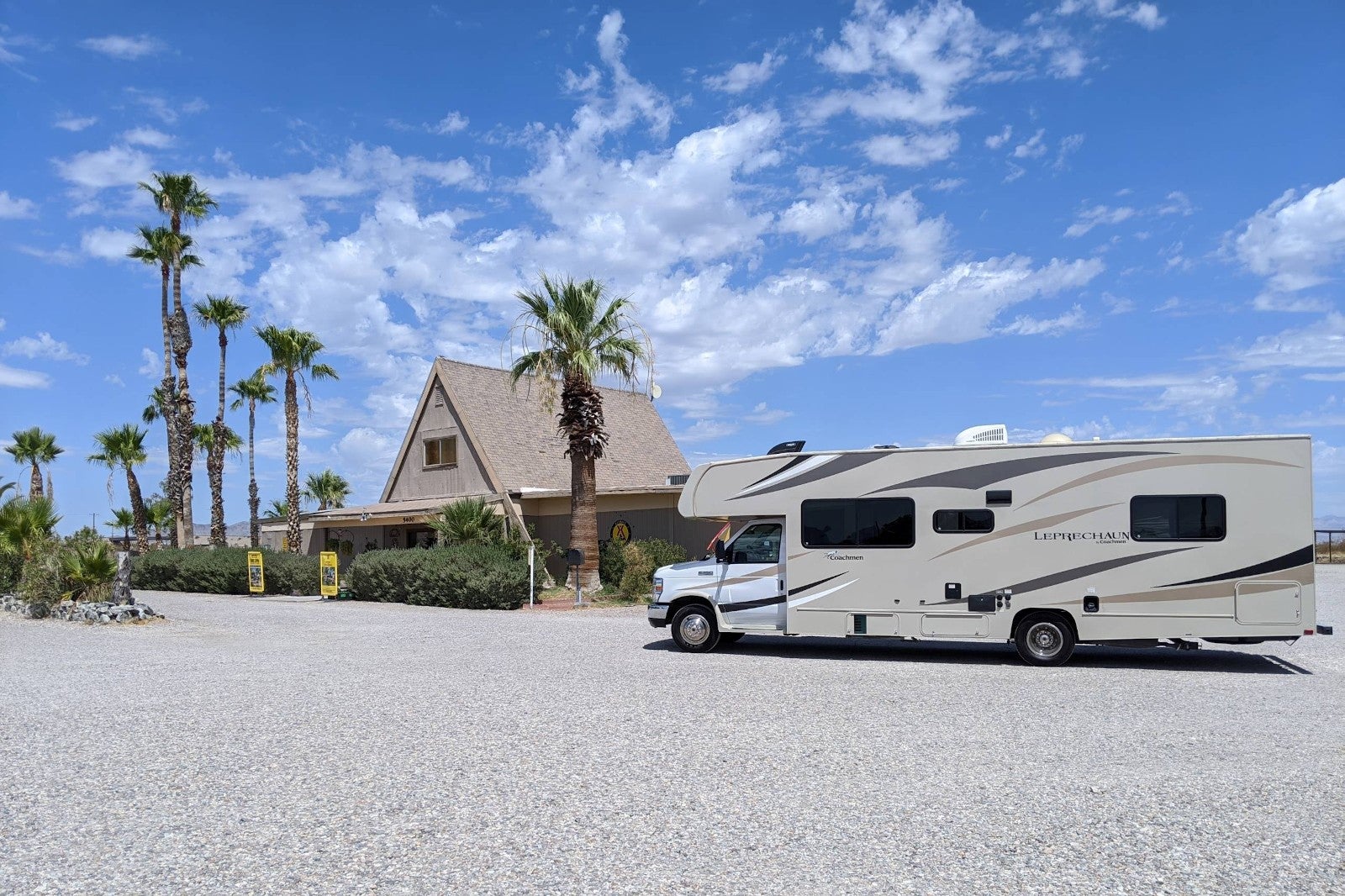
The final thing we've learned is to make a realistic itinerary. You might be able to drive a car eight hours straight and only stop once. But, when driving an RV, you'll likely tire much quicker. And, you should typically drive an RV slower than a car. For example, we find that our RV drives best when we go no faster than 65 miles per hour on the interstate.
And frankly, parking and setting up an RV in the dark isn't particularly safe or fun. So, we've learned to drive modest amounts (typically no further than 300 miles in a day) and try to stay at most locations for at least six or seven nights. After all, we want to stay long enough in each destination to enjoy the area while working full-time.
Related: How you plan and organize your trip says more about you than you think
Bottom line
Last year at this time, we had no intention of buying an RV and living out of it full-time. But, doing so has allowed us to remain nomadic and travel domestically during the coronavirus pandemic. And it's been a fun adventure. It's hard to say whether we'll still have the RV in six more months, as I hope we're back to our globetrotting full-time. But, we're enjoying RVing while it's the right choice for us. And we've certainly learned a lot in the last six months.

Life as a full-time traveler
Life as a full-time traveler is a bit of everything. It’s complex, ever-changing, exciting, and even nerve-wracking at times. In this series you’ll find a variety of posts that follow my personal journey of life as a full-time traveler since 2006, through 65+ countries.
Come along with me! Discover why slow travel makes my heart sing, watch me pack and tell you about my best packing tips , learn from my travel blogging mistakes , and even dissect my year-over-year income and expense breakdowns .
But remember, life isn’t always pretty – on the road or off it. And sometimes, life’s challenges are even harder while traveling. I mince no words and give you the real scoop on topics like finding love on the road , having my passport stolen , surviving near-fatal accidents, natural disasters, and (much) more .
Here it is for better (and) worse: Life as a Full-Time Traveler!
The Silver Meteor – Amtrak Adventures Part 4 (Florida to NYC)
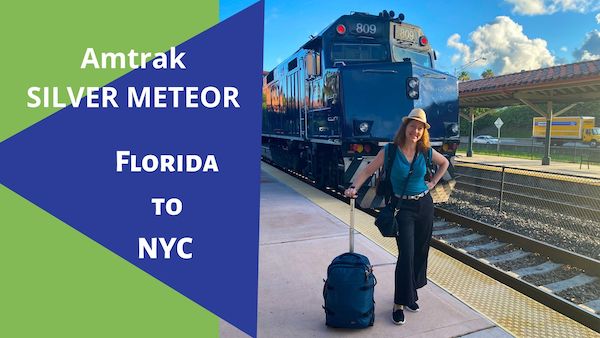
Closing the loop of my circumnavigation of the United States mostly by train, I take the Silver Meteor Amtrak train from Florida to NYC, a 28 hour adventure.
Amtrak Adventures Part 3: Portland, LA, Sunset Limited Train to New Orleans
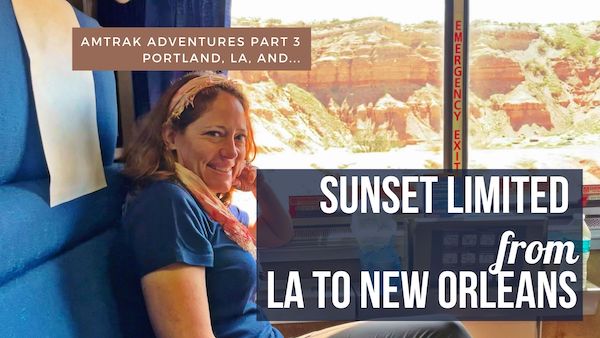
Continuing my Amtrak Adventures, after visiting Portland and LA, I take the Sunset Limited Train to New Orleans! This one’s a doozy. Enjoy!
Amtrak Adventures, Part 2: The Empire Builder
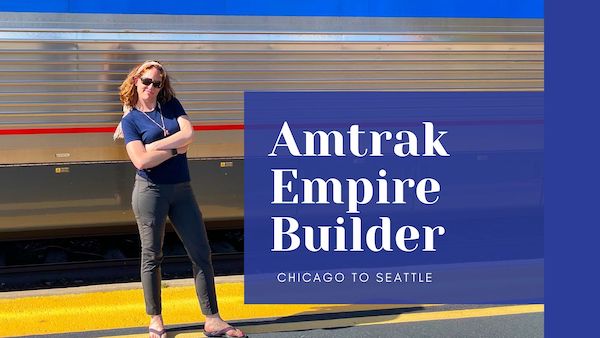
Here is Part 2 of my Amtrak Adventures, on the Empire Builder train from Chicago to Seattle…with somebody I’ve never met in person.
Adventures With Amtrak, Part 1: The Big Idea
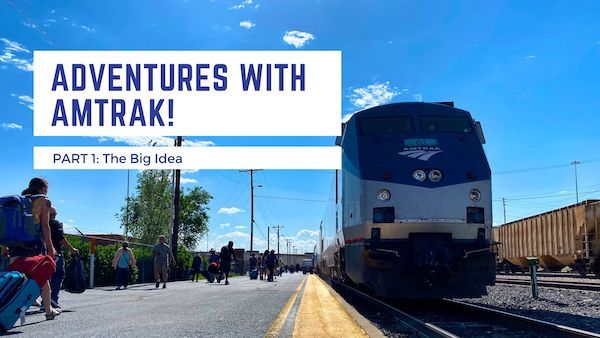
Here’s how I dreamt up what ended up being a 7,000 mile circumnavigation around the United States via train…with a total stranger.
21 Years of Full-Time Travel with Wandering Earl
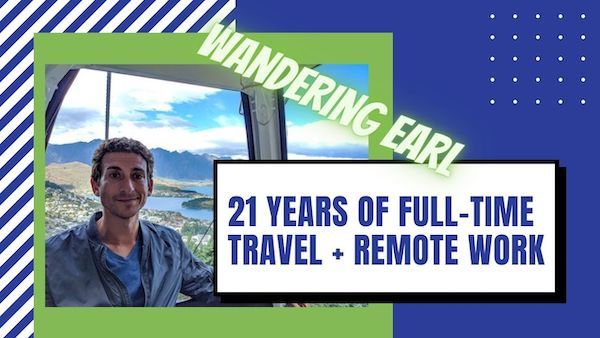
Derek Earl Baron aka Wandering Earl, has traveled full-time for 21 years! He founded Remote Club to help remote workers travel wisely. More on his life and work here.
Podcasting vs Blogging After 9 Years of Full-Time Travel, With Gary Arndt
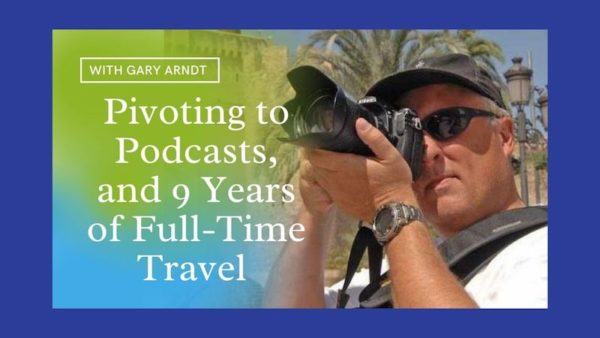
Gary Arndt started the Everything Everywhere Daily Podcast after 15 years of travel, 9 of which were full-time. Learn about his pivot and amazing podcast strategy here!
How 8 Digital Nomads Have Survived the Pandemic

Digital nomads are theoretically homeless. So what did they do when everyone returned “home” during COVID? Here’s how 8 digital nomads coped. Spoiler alert: everybody did something different!
How This Woman Went From $25k in Debt to Digital Nomad Life

Here is the story of a woman who went from $25k in debt to digital nomad life and living her travel lifestyle and career dream in Mexico!
Pet Sitting Disasters: Read This Before You Apply for Your Next Pet-Sitting Gig.

Petsitting is a great way to get free accommodation and enjoy the comforts of home while you travel. But heed this cautionary – and hilarious – tale of petsitting disasters first!
How to Become Fluent in Spanish (and Other Languages)

Learning Spanish – or becoming fluent in any language – takes a lot of hard work. But for me, there’s nothing more rewarding than being able to converse with and understand people in their own language, in their own country. It takes travel to an entirely new level.
Redefining My Travels in 2019 (Where I Went)
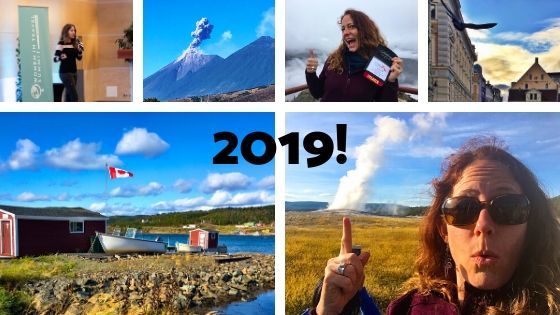
Here’s a summary of where I went in 2019; how my travels have changed and been redefined over the years….and how they may continue to change in future.
The Ultimate Packing List for Full-Time Travel and Long-Term Travel
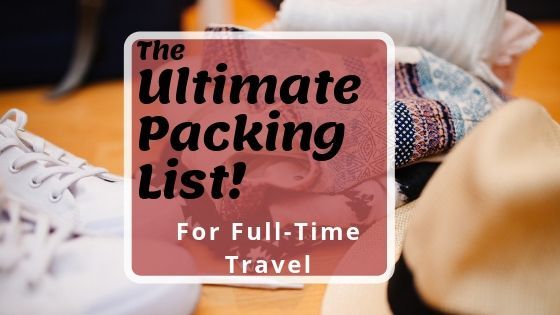
Looking for the ultimate packing list for full-time travel? Here’s exactly what I pack to travel the world as a digital nomad – down to every last item. This interactive packing list widget is sure to give you lots of ideas for your next trip.
The 10 Commandments For All Travelers

Here are the 10 commandments for all travelers; some fun rules to live by when you travel that ensure you – and others around you – will have a great time.
How to Create a Long Term Travel Budget: Financially Sustainable Travel
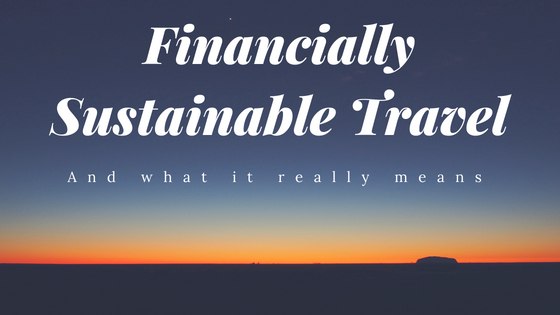
I’ve been asked repeatedly to provide long-term travel budget templates. Here’s a framework, with info on what financially sustainable travel REALLY means.
2018: 6 Countries, 32k Miles, And Some BIG Changes
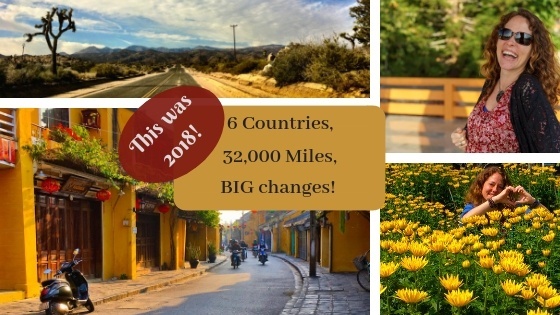
Here’s a summary of where I went in 2018; although none of the 6 countries were new to me, the places I visited and experiences I had TOTALLY were! Enjoy.
THE IRONY OF EXPAT LIFE: Pros and Cons

After years of living in expat communities around the world, in this article I make some observations about expat life, including ironies, pros, and cons. Expat life is not necessarily what you would think it is!
My (Epic?) Search for a Home Base

It’s time for a new chapter. Problem is, the page I’m writing on seems to be a moving target. Either way, the ultimate goal is to find a home base. Here’s where, and why.
12 Truths About Travel…and Life

In this article, I share 12 truths about travel, one truth learned for each year of my full-time travel career thus far. 12 years of pictures included!
10 Countries and 29,254 Miles: This was 2017!
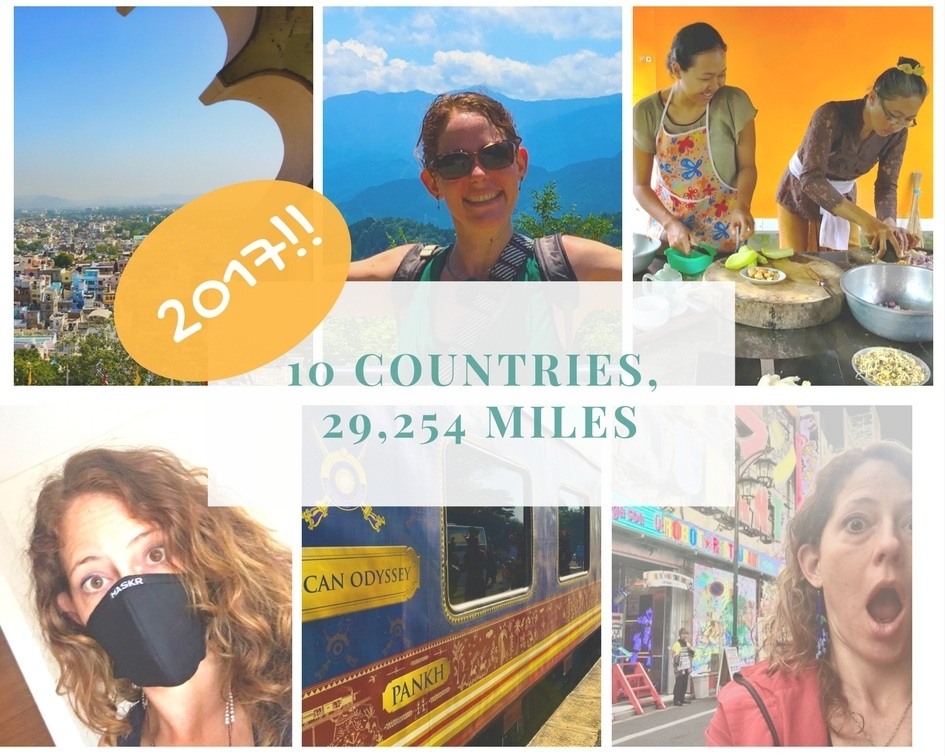
2017 was a year of new experiences and surprises. I visited 10 countries (seven of which were in Asia and almost all new to me). I started off in Ecuador “doing shaman things”, and ended up house-sitting in Japan, chilling in Bali, going crazy in India, and 10 countries later, finishing up in Thailand.
A Day-In-The-Life of House-Sitting in Tokyo (VLOG Ep. 20)

Feed your inner voyeur and watch this funny video blow-by-blow of a day in the life of me house-sitting in Tokyo. Also, a huge summary of my 7 weeks in Tokyo Japan.
Why I Could Never Live in Japan

I’ve had a “crisis of dislike” with Japan – which has quite taken me by surprise. But it has amounted to these reasons why I could never live in Japan.
My Sordid Attempts at Finding Love on the Road

Much as I hate to admit, finding love on the road isn’t easy. Here’s a summary of the relationships I’ve had in the last 10 years, and why they didn’t last.
Business Crisis for The Professional Hobo! (Vlog Ep. 9)

Business Crisis Central at The Professional Hobo! Guess what? Screwing the pooch for the last 3 years has hurt me. Here’s why, and what I’m doing about it:
The #1 Misconception About House-Sitters and Lifestyle Travelers

After two offensive conversations with well-meaning people, I realized there is a BIG misconception about house-sitters and lifestyle travelers. Here it is:
5 Countries and 30,000 Miles: This Was 2016!

2016 started off in one way, turned left, got flipped upside down, then messed up in the blender. Here’s how it all came out in the end:
Travel Packing: How (and What) to Pack for Full-Time Travel (Video)
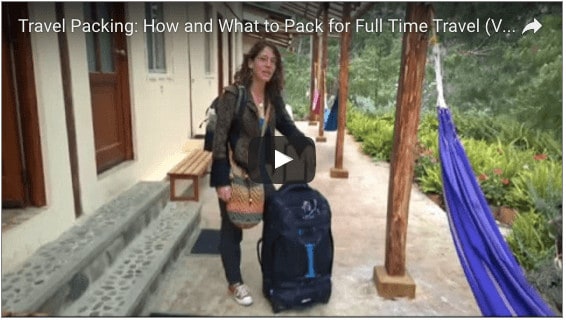
In this vlog, I show you what I pack for full-time travel – and how I pack it. Learn travel packing tips and techniques, and watch me cram it all in my bag!
Hobo Update: Relearning Travel’s Inherent Lessons
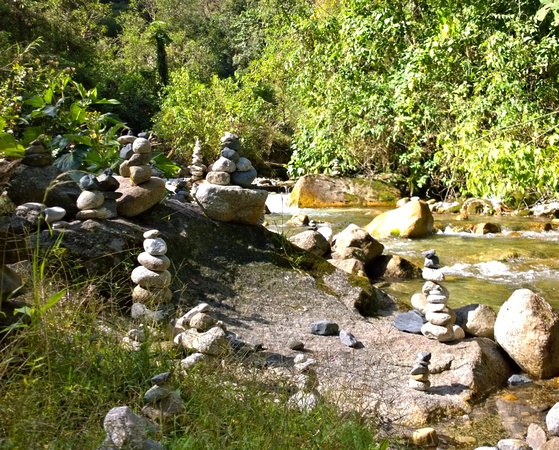
Even though I’ve been traveling almost 10 years, my departure from Peru required that I relearn some of travel’s inherent lessons. Here’s what I’m doing.
Apprenticeship Update: BIG Changes for The Professional Hobo
At long last, here is an apprenticeship update about my work with a shaman in Peru. Unfortunately, it’s not pretty. Big changes coming my way….
Coffee Drinking Rituals Around the World

Who knew that the simple brew of coffee could be enjoyed in so many different ways around the world? Read on to find out how to drink coffee like an expert!
Lifestyle Inflation: Why Earning More Money Sucks (the Life Outta You)
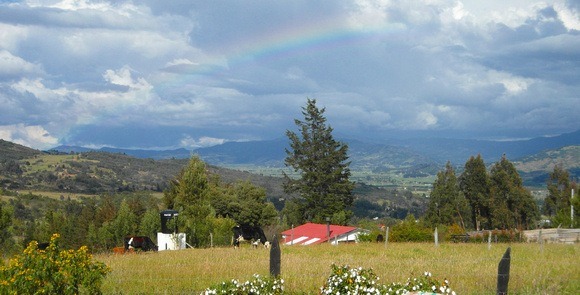
Lifestyle Inflation at work: A curious thing happened when I was “living the life” in Toronto. Having crossed over into the six-figure income bracket, I didn’t seem to actually be taking home any more money or enjoying a substantially higher quality of life than when I earned half as much. … Read More
6 Countries and 35,000 Miles: This was 2015!
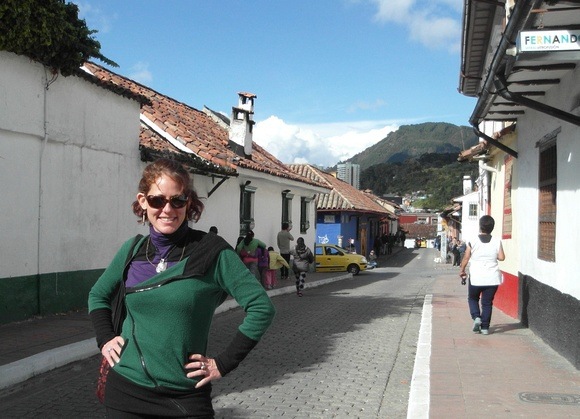
Though I didn’t travel as much or as long as in previous years, I covered good ground in 2015, seeing 6 countries spanning 35,000 miles! Here’s the summary.
How the Travel State of Mind Creates Opportunities
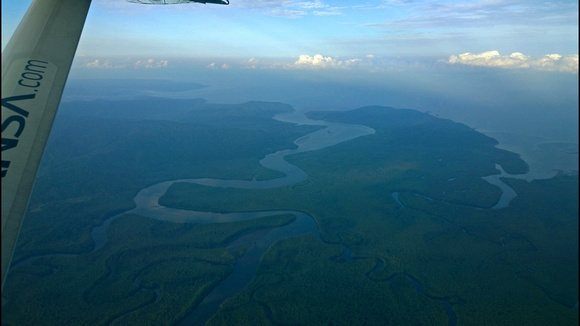
The travel state of mind is a way and means of traveling and experiencing the world. And you can even experience this without leaving home! Here’s how.
Pros and Cons of Traveling Solo, as a Couple, or a Family
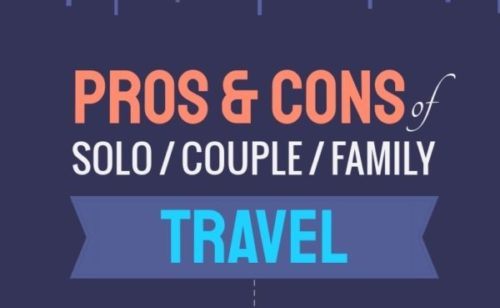
Here are some pros and cons to solo/couple/family travel, along with resources full of testimonials from professional solo, couple, and family travelers.
How (and Why) to Visit Your Hometown Without Going Crazy
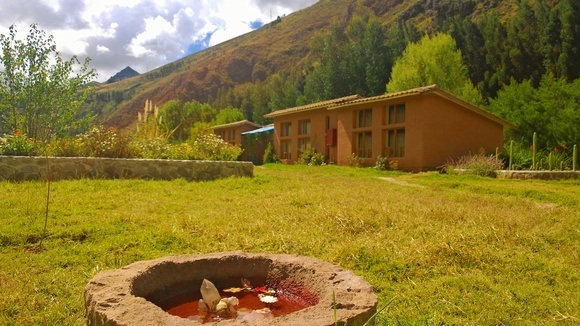
When you travel long-term, visiting your hometown isn’t always easy. Here’s how – and why – to visit your hometown and make it a success for all.
I Did It! 6 Little Victories of Travel
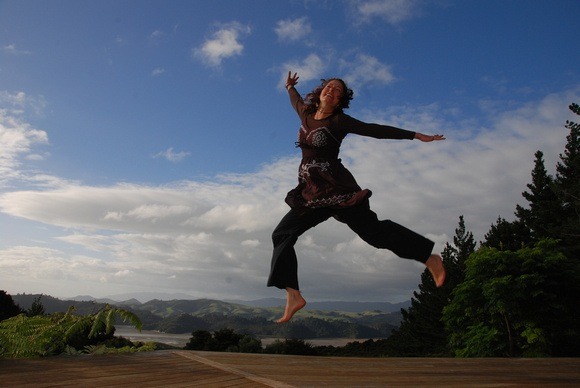
Here are 6 little victories of travel that make you feel good about your journey, yourself, and life in general.
Colombia, Colorado, Costa Rica: The “C” Trip
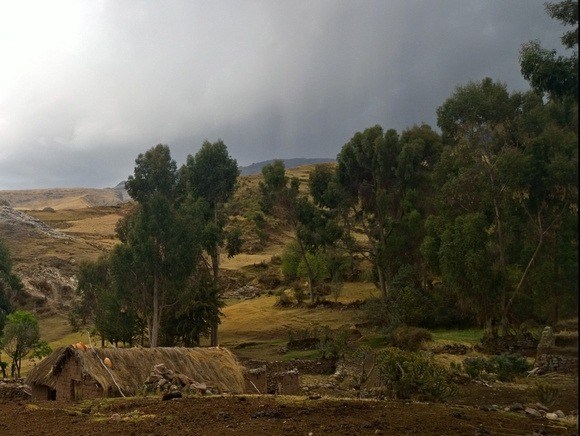
I’m currently in the throes of what I’ve dubbed The “C” Trip, to Colombia, Colorado, and Costa Rica. Here’s how this trip came to pass:
7 Countries and 34,000 Miles: 2014 Travel Summary

In 2014 I traveled through/lived in 7 countries, and traversed over 34,000 miles. Here’s a summary of what I did, and where.
The Day I Had My Purse Stolen, and Lessons Learned

In Cusco, my purse was stolen, with everything in it. Here’s what happened, what I gained from being prepared, and what mistakes I made along the way.
Eight Years of Full-Time Travel: Life is a Journey. Live It.

After eight years of full-time travel, I’ve realized that life is a journey, and the journey is the destination. Click through for some big news too!
How Travel Rewards You For Being Impulsive

Here are eight ways you can be impulsive on the road (as well as at home for that matter) to expand your horizons and get the most out of travel (and life):
Travel Hacking Lessons (How I Gave US Airways $1700 for Nothing, Not Even Flights)
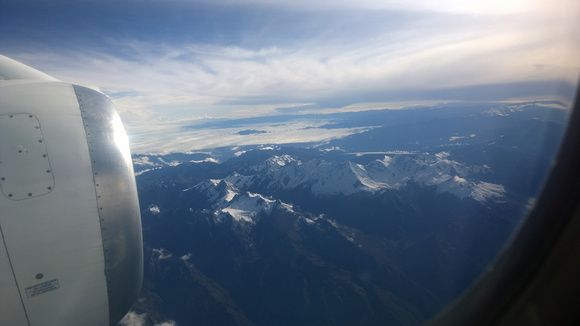
Traveling with frequent flyer miles isn’t always easy. Here’s a sordid story of dealing with US Airways, with some rules for navigating frequent flyer miles.
Cutting Your Losses: Why I’m Losing in Order to Win

This is a tale of an ugly insurance claim and its detrimental effects – and why I’m now losing in order to win this case. Also, some awesome travel content.
How Tourists Cripple Local Economies

It’s done with the best intentions, but can have the most catastrophic outcomes. Here’s how tourists cripple local economies, and how to avoid it happening.
Travel is Selfish. Here’s Why.

Here’s an email conversation I had with a reader, who basically asked to move in with me on the road. It made me realize travel is selfish.
A Digital Detox in the Peruvian Andes
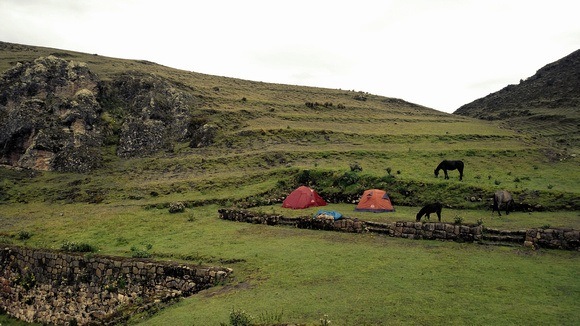
I just did a 5-day digital detox in the Peruvian Andes. Although there was no better setting for it, it wasn’t the easiest thing I’ve ever done.
The Day I Was Dumped Via Instant Message
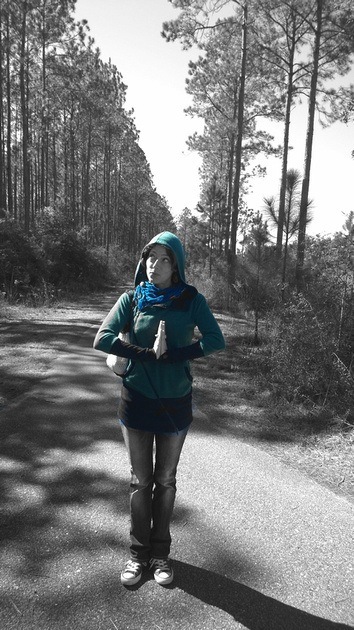
Here’s the story of how I was dumped via instant message, what this instant message culture means in the grander scheme of things, and what’s next for me.
A Tale (and Pics) of Serendipity in Gulfport, Florida

Here’s a tale of how I happened upon Gulfport Florida through serendipity, and fell in love on arrival. Enjoy these varied pictures of this colourful place.
Paying for Alone Time on the Road

This post outlines some of the sacrifices travelers make when getting free accommodation, and why it’s worth occasionally paying for alone time on the road.
12 Countries and 29,000 miles: This was 2013!

In 2013, I managed to hit up 12 different countries, covering 28,904 miles (46,517 kilometers). Here is 2013, in a nutshell:
The #1 Reason Why I Love Slow Travel

In the last month of being in Panama, I realized why I love slow travel so much. It’s a unique travel benefit; and one that’s very rewarding.
The Saga of My $10,000 Passport
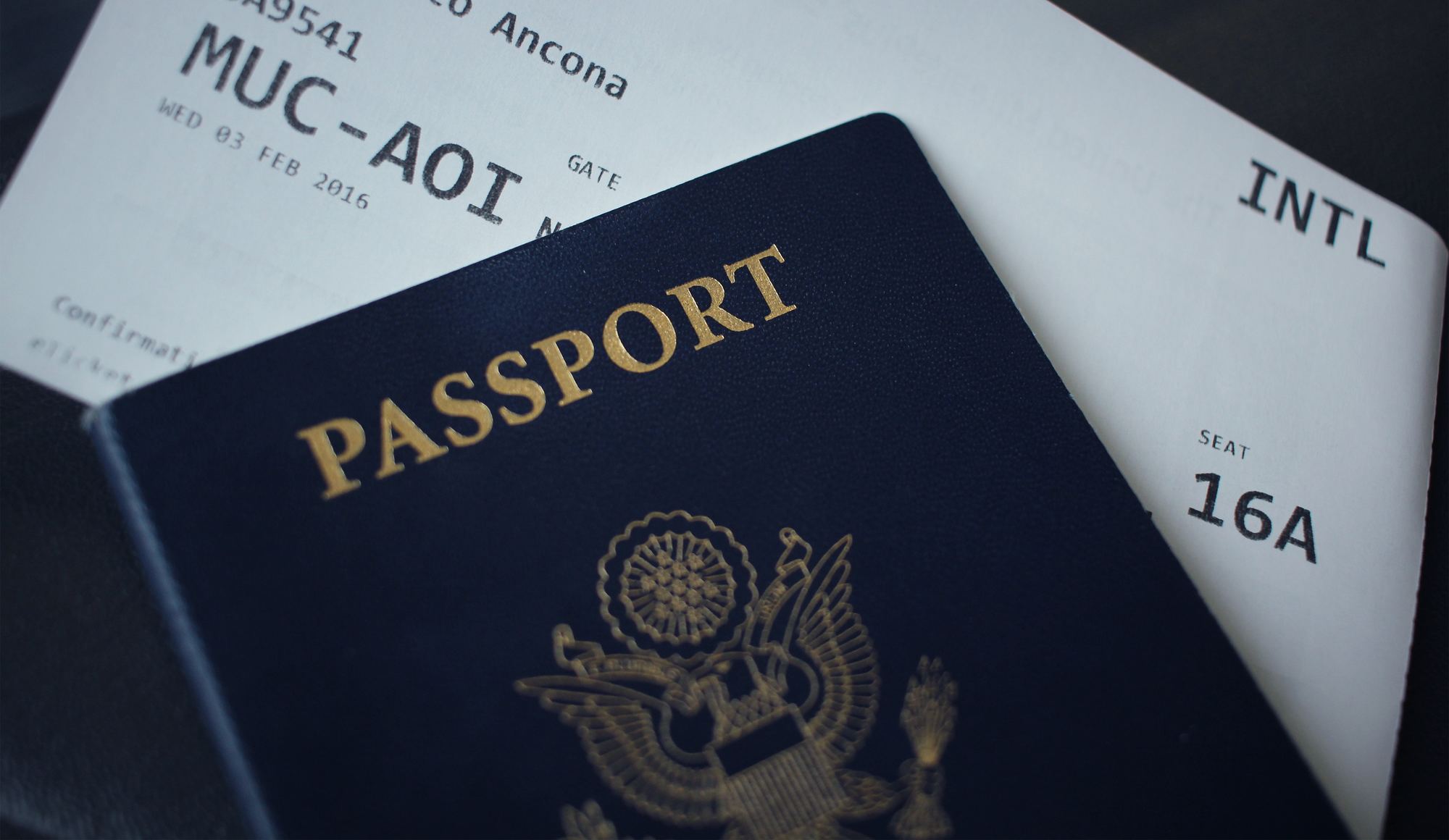
In just one week, $10,000 passed through my hands. And it all boils down to a stolen passport, four days before I was to travel…a saga indeed.
Using Serendipity in Travel and Business

Here are 2 examples of how serendipity has provided opportunities in travel and business, because I was calm and patient in the face of challenge.
Why “Settle Down” is a Bad Word….or Not

I was recently advised to “return home” and settle down to an “ordinary” life. I’m not so sure it’s that easy.
Travel Rocks! Highlights from 7 Years of Full-Time Travel

I may have had some mis-adventures, but the good outweighs the bad; here are the highlights of my last 6 years of full-time travel.
Brace Yourself: Travel Isn’t All Roses and Lollipops
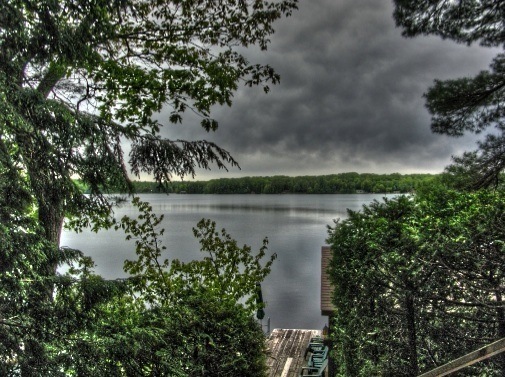
Brace yourself: Here’s all the crappy stuff that has happened to me in my 7 years of full-time travel. It ain’t pretty, but it usually ends well.
What is a “Holiday” for a Full-Time Traveler?

If you’re always on the go, living a travel lifestyle that many would equate with “holiday” life – but you’re also always working – what’s a holiday?
The Professional Hobo’s Bucket List – Past, Present, and Ongoing
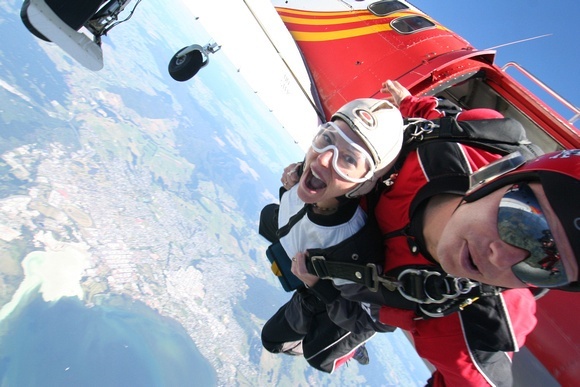
The time has come: I’ve drawn up a bucket list – but with a twist; I celebrate past victories, new dreams, and ongoing ambitions.
Crash! Bam! How My Life Changed in a Second

Last month, my life changed in – quite literally – the blink of an eye. Here’s what happened:
2012: 8 Countries and 20,000 Miles
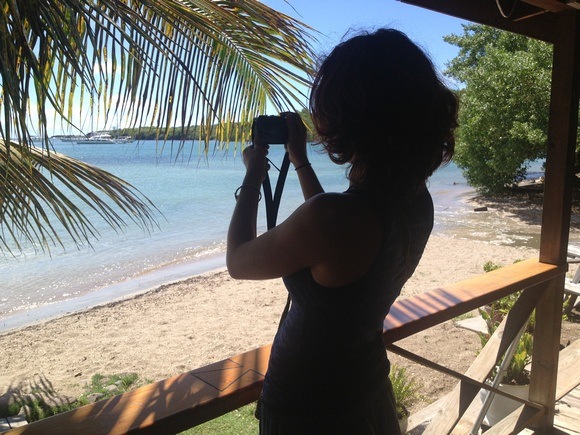
In 2012, my full-time travels took me to 8 countries spanning 20,000 miles. Here’s a quick recap of the highlights!
Time for a Change: The Professional Hobo Switches Gears
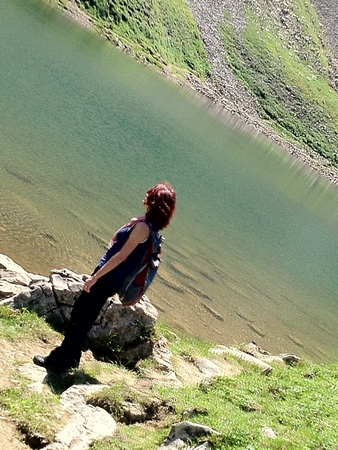
After redesigning my life 6 years ago to adopt a full-time travel lifestyle, it’s time to redesign my life again. Just a wee bit anyway. Here’s the scoop!
The Art of Communication, Relationships, and the Trappings of Nomadic Living

Communication and relationships are changing. But there’s a fine line between engaging the world, and forsaking it for the world in our laptops.
How NOT Going to University or Buying a House Saved my Life

I am lucky enough to not have a university degree or a house. Here’s why I think it’s the best thing that could ever have happened to me.
How We View World Geography Based on Our Origin
Distance and geography take on a different meaning, depending on where you’re from. As a Canadian in Europe this has been quite a learning experience.
Traveling Without Moving, in Switzerland

I’ve been in Switzerland for a month now, and I’m not sure if I should be proud (or guilty) of how much (or how little) I’ve done so far. What do you think?
Time Slows Down While Traveling
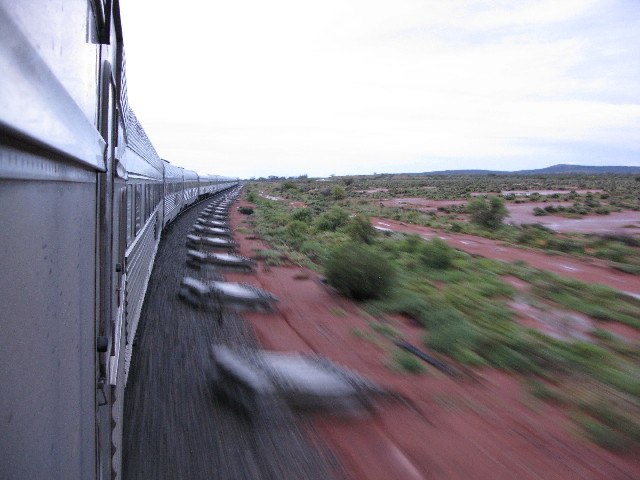
The faster you travel, the slower time goes. Here’s why.
A Bad Day in the Life of a Professional Hobo

No life is perfect. Here are some of the things that can (and do, and did) go wrong as a full-time traveler – and how we can learn from having a bad day.
Dealing With Poverty on the Road

In this post I ask some tough questions: What is poverty, who exactly is impoverished, does poverty=sadness, and how can we help without insulting people?
How I Became the Professional Hobo (Part II: The Logistics)

After deciding to leave everything to chase my lifelong dream of travel, I had to walk the talk. Here are the nuts&bolts of how I Became The Professional Hobo.
How I Became The Professional Hobo (Part I: The Dream, The Decision)

Here I bare all: what prompted me to make the life-changing decision to sell everything to travel full-time. Enjoy Part I: about how it all started.
Destiny is a Direction

What if Destiny is a direction, not a fixed place? And what is Passion isn’t stationary? These questions and more are explored in this post.
Romance on the Road
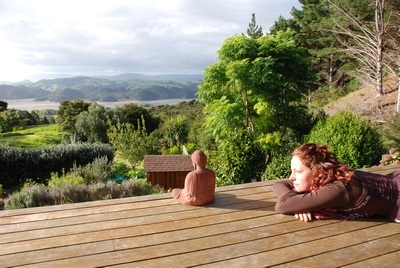
I’m hanging it all out with this inside scoop about how romance on the road works for a single female traveler.
Travel, Work-Life Balance, Time Management, and the Paradoxes Within
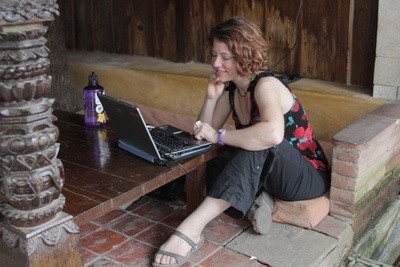
This poignant articles looks at how we prioritize our lives, and the root of time management and work-life issues.
The Paralysis of Choice
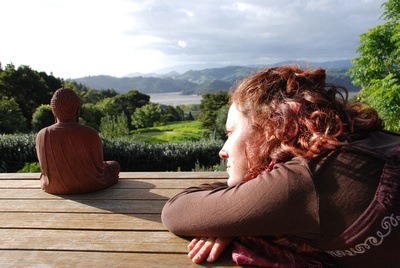
The recent exercise of booking my flights back to Canada from New Zealand was a harrowing one. It took forever to actually decide on a plan of action and execute it. And for a full-time traveler, it shouldn’t have been that difficult. Then again, maybe my very freedom inspired this … Read More
The Last Four Years of Full-Time Travel
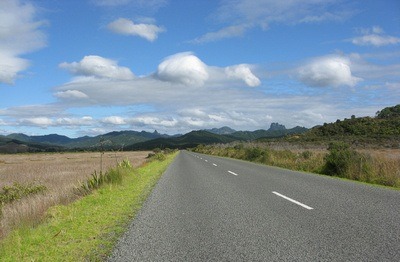
Four years of full-time travel: can you believe it?! This post was originally published in 2011. It has since been updated for accuracy of links and content. I ended up traveling full-time for 12 years. Just as time passes more and more quickly as we age, so too I’m finding … Read More
Motion Sickness on the Road
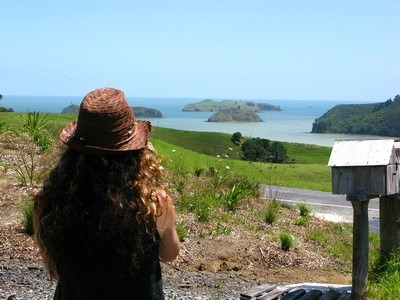
I am currently recovering from Motion Sickness on the road. This is a very real, very difficult condition to deal with, and something to be aware of, especially if you’re traveling solo. In this fantastic world of full-time travel (four years and counting for me, at the time of writing), … Read More
Travel Fatigue, and Slowing Down the Pace of Travel

Travel Fatigue…..it’s a bitch. This post was originally published in 2011. It has since been updated for accuracy of links and content. About a month ago, I realized something wasn’t right. I couldn’t quite define what was going on, but I had an unsettled feeling in my gut. I was … Read More
Breaking Up While Traveling

Breaking up while traveling – this is not an easy task….trust me. There are heaps of articles about survival tips for couples on the road. The stress of travel can take a toll on a relationship, accelerate the natural evolution of a relationship, or even force two people to stay … Read More
Meeting People Online…and Then in Person

This post was originally published in 2010. It has since been updated for accuracy of links and content. In the last few months, I’ve had occasion to connect with a handful of people who I’ve initially met on-line, developed relationships with over varying periods of time, and then met in … Read More
How to Get Support as a Writer Living Abroad
As a writer living abroad, I’ve been burnt by a lack of support – both professional and moral – from friends and family. Here are lessons learned about support.
Airport Musings During a 50 Hour Journey
Airport Musings: Thoughts that Happen During the Longest Trip on Earth This is the story of one girl’s determination to take a large trip without layovers, inexpensively, and somewhat stupidly. Please enjoy my antics. This post was originally published in 2009. It has since been updated for accuracy of links … Read More
City Life vs Country Life: An Unbiased Analysis

Can’t decide if you’re a city person or a country person? Here’s an unbiased analysis of the pros and cons of city live vs country life, after having lived extensively in both. Enjoy!
The Journey Through Life Changes
Part of the fun of living at a hostel is in meeting all sorts of people with a variety of backgrounds and stories to tell. And it’s amazing to discover how many people are out there who are going through (or have gone through) similar life changes in life as … Read More
- How to Play Video Games as You Travel the World
- 21 Unusual Places to Visit in Poland You Must See
- The Best Cenotes in the Riviera Maya
- The 7 Best Vacation Destinations for Nature Lovers
- VTOMAN FlashSpeed 1500 Review
- Discover the Maya eSIM: Our Exclusive In-Depth Review
- Work With Us
How to Travel with a Full-Time Job
Wondering how to mix travel in while working, especially with a full time job?
Impossible you say? Well, we know from first hand experience that not only is it possible but it can also be rewarding and even profitable!
It’s a common trope – a would be traveler quits their job, travels the world, and finds love, fame, and/or fortune. I’m sure you’ve all seen a movie or read a book about it but the reality is that in real life that doesn’t usually happen.
While as tempting as quitting your job and taking a long vacation is, it’s just not realistic for a lot of people, who are (understandably) too practical to take that enormous leap, or who have commitments that simply won’t let them quit their job and sail the seven seas.
While being able to work remotely is undoubtedly the easiest way to work while traveling (have laptop, will travel), there are some jobs that you just can’t phone in while on the road and times when just flat out quitting might not be the best answer.
Here’s the good news: You don’t have to quit your full-time job to see the world. It definitely takes a can-do attitude, some creative problem solving, and even some occasional slight of hand, but for many people it’s possible to both work full time and also scratch that travel itch.
How to travel while working
When we first started traveling together almost 20 years ago, my husband Charles and I had full time jobs. We started out taking weekends off to travel, then two week vacations, working remotely while spending months in Mexico, and eventually a year long trip through Southeast Asia, Australia, and New Zealand.
Not all of these tips will work for everyone, but with some creative thinking, hopefully at least one of these will apply to your situation!
I know that many people believe that travel and work are an impossible mix! Whether you are part of a working couple, a single would be traveler, or even a traveling family, there are so many ways you can travel while still keeping your full-time job.
Here are our top tips for how to travel with a full-time job.
We start with what should be the easiest solutions for most people, getting more creative as we go down the list.
Use your weekends and time off
Everyone gets time off at some point, and how you use that time is yours!
If you have vacation days and weekends off, take those days to travel around the world. You can make a bunch of four-day weekends for more extended travel, or you can take a short weekend trip somewhere. If you are really pressed for time, look into flights instead of long drives to maximize your time at the destination rather than in the car.
Be flexible with your dates
If you want to travel while you have a full time job, sometimes you need to be flexible with your dates.
Taking off in the middle of summer might not work if your busy season at work is during the summer or, for instance, in the middle of tax season if you’re an accountant. Instead, consider taking a few extra days off before a big holiday break or a four day weekend to maximize your vacation days and allow more travel time. Get creative and be flexible if you want to see and do more.
Travel in the off season
While this ties into the previous segment, if you can schedule time off during the shoulder season like late Spring/early Fall, you can better maximize your time away from home. While most people love to travel in the summer, the reality is that’s often peak times so going in Fall or Spring can not only save you hour long lineups but also allow you to travel for much cheaper.
Work extra hours
Does your employer let you bank time? Some employers let you take time off in lieu of overtime pay.
If you can bank time, try working extra hours during busy periods, and then taking those days off to add to your vacation time. Just make sure that your employer is accurately recording any extra time that you work and you’re being paid fully when you’re not there.
Take advantage of travel opportunities at work
Ask your boss if there are any travel opportunities at your work. You may be shocked to find that they offer travel to warehouses, conferences, and other work opportunities if you just ask. While you won’t be able to do them all, you may be able to snag one or two extra trips!
Since most of the work stuff happens during the day, this often means you can enjoy entire nights off in a new city and if you can plan those dates around a weekend, it can often give you a few extra days to enjoy wherever you happen to be.
Work during your vacation
While this seems the opposite of what we’re trying to do here, many employers won’t even consider allowing employees to work remotely. Yet, these same employers will be happy to let you work right through your vacation time.
Sure, it sucks to have to do work while you’re on vacation. However, if you absolutely can’t afford to take time off and you have a backlog of work that keeps piling up, working during a vacation may be an option that doesn’t break the bank.
To make this work, you’ll either need to convince your boss to let you work remotely as you travel, or you’ll need to make the slog into work, and have a staycation. If you can afford it, get a hotel or somewhere nice to stay for part of your vacay, or stay at home and splurge on fun activities during your off hours. While it might not seem like travel, if you do some local activities outside your norm, that can go a long way to making your vacation at least memorable.
Take unpaid time off
For a lot of readers, I’m sure that I lost you at the word unpaid, but hear me out. If you can manage to save enough for a vacation, taking unpaid time off can be a way to free up some time for a trip, while still keeping your job.
I’ve used the technique of asking for unpaid time off a few times, when I was in a situation where I could afford to travel, but just didn’t have the time or vacation hours available to me.
While it’s true that companies love having you on premise, if they’re not having to pay you, they often don’t mind you taking a few weeks or, sometimes even a few months off for a mini sabbatical. If work is quiet at your company, your employer may actually appreciate having to spend less on payroll for a while.
Unfortunately, if your job is especially busy, or your expertise is essential to your employer, this strategy might not work but it never hurts to ask. Most people never even think to ask but their response might surprise you, especially if the company can gain something in the process such as a new skill or language learned or even just having better mental health when you return.
Ask your current employer if you can work remotely
This one’s a little risky: If you have a really uptight or vindictive boss, you risk showing them your hand that you want to travel.
However, you may be surprised. Many employers don’t want to lose a good employee, so if you’re trusted and your work is valued, and you can successfully do your job at home, being able to work remotely may be as simple as just asking.
I’ve successfully used this technique in the past. I started out with a technical writing job that was full time, and on site. Over my first few months, I worked hard to get my immediate supervisors to trust my work ethic, and to value my work.
About three months in, I asked if I could work remotely a day a week. They said yes, and I made sure to show them that I was productive, and working hard at home.
A couple of months later, I asked if I could work two days remotely a week. They said yes, and I kept up the hard work.
After another couple of months, I asked if I could work remotely full time, and made a case that working remotely would save them money by freeing up my office space, and they wouldn’t lose any productive time at all. They said yes, and I was off to Mexico in a few weeks’ time.
If you have a job that could be done from anywhere, consider asking your boss if you can work some of your time from home. This will give you more flexibility to travel as you can work from anywhere at that point.
Find a job that lets you work remotely
This one might seem impossible, but there are a lot of jobs that allow you to work from home from the start.
This is one good thing we can thank the pandemic for. The amount of remote workers has increased right around the world and so many companies have discovered that having remote workers is a viable proposition moving forward. It’s opened the door to so many more possibilities.
Editing and writing jobs are probably the most familiar of remote jobs. You don’t even need to take a cheap custom writings job – there are writing jobs that pay well, especially if you have a skill like technical or medical writing, academic editing, or copywriting.
Check out our list of 45 best travel jobs for some more great ideas for jobs that let you work as you travel.
Take contract work instead of a permanent 9 to 5
We spent years using the downtime from our contract IT jobs to travel. We’d work for six months or a year at a contract job, and then travel in between contracts.
The major downside of this approach is that you need to earn enough doing contract work to afford to take time off. You also need to be able to save money and budget well however the good news is that contract workers are often paid more. You can also often save on income taxes since you’d be working for yourself. Between tax breaks and company write-offs, doing contract work can be quite lucrative in the right market and is worth looking into.
Take a sabbatical
Not everyone can take a sabbatical leave; we get that.
However, if you’re lucky enough to be in a profession that commonly allow sabbaticals, like academics, definitely look into it.
It may not be common knowledge, but many companies allow sabbaticals, including Patagonia and even McDonalds. You may have to discreetly ask your HR department, or browse around your company website to find out if you qualify for a sabbatical but they can be a great way to keep your job but allow you the free time to follow your passions.
The crazy part is that some companies even pay for your sabbatical time off! This really depends on your company, their philosophy about work and life as well as the country you live in.
Regardless, even if your sabbatical may not offer paid time off, the beauty of a sabbatical is that you’ll have a job to return to after you travel. Just make sure you start saving up .
Be your own boss
If you run your own business, you have a lot more say in the days you work and the hours. We started working for ourselves about 10 years ago, and it gave us a lot more flexibility to travel.
Working for yourself means that you may be able to take more time to travel and even give yourself the flexibility to work from different time zones.
Being your own boss can mean starting your own business by blogging, selling on Etsy, or even becoming a virtual assistant! There are so many different options that offer flexibility, which will help you get some more travel time while still working full-time for yourself.
Working for yourself also means that you’ll need to become better at budgeting for time off, and allowing for unexpected expenses. It may also mean that you end up working more hours in total than you ever did when working for someone else but while it’s not always easy, it can be quite rewarding and allow you to see the world on your schedule, rather that someone elses.
You don’t have to quit your job to see the world.
While taking time off to travel is nice, it’s also nice to not worry about how you’re going to pay the bills when you return from your long trip.
No matter how you do it, don’t be fooled into thinking it will be easy or just work out. If you want to keep your job but still step out and see the world you’ll have to work twice as hard to make sure you keep the work/travel balance in check.
While it won’t be simple, it can be even more rewarding by not only keeping your bank account in the black and your career moving forward but also allowing you to see all the amazing things this world can offer.
There are even a lot of jobs that you can do while you’re on the road. There are plenty of students searching for editors, so jobs in academic editing and writing can be relatively easy to pick up.
Have a tip about work and travel? We’d love to hear about it.
these tricks really sounds interesting and useful to fulfill your traveling dream while going doing a job.
keep sharing such a good information with us.
Great post that will hopefully get more people exploring the world. Sometimes it just takes a little motivation to figure out how to do it, but many of us our proof that it can be done.
I have been planning to travel but I have a full time job as well thanks for this great tips
Pretty good advices. After one vacation I enjoyed traveling so much that I had to change to a telecommuting job to have more time to travel. Anyway, combining office work and travel is very difficult!
Amazing tips and very helpful as well for all the people who feel stucked at work or are not able to take out some self-time from their hectic schedule. I liked your tip of looking for travel opportunity at work. I guess those who don’t have enough leaves can definitely take advantage of this. Keep educating readers through such posts.
Leave a Reply Cancel reply
Your email address will not be published. Required fields are marked *
This site uses Akismet to reduce spam. Learn how your comment data is processed .

20 Brutally Honest Pros & Cons of Full-Time RV Travel
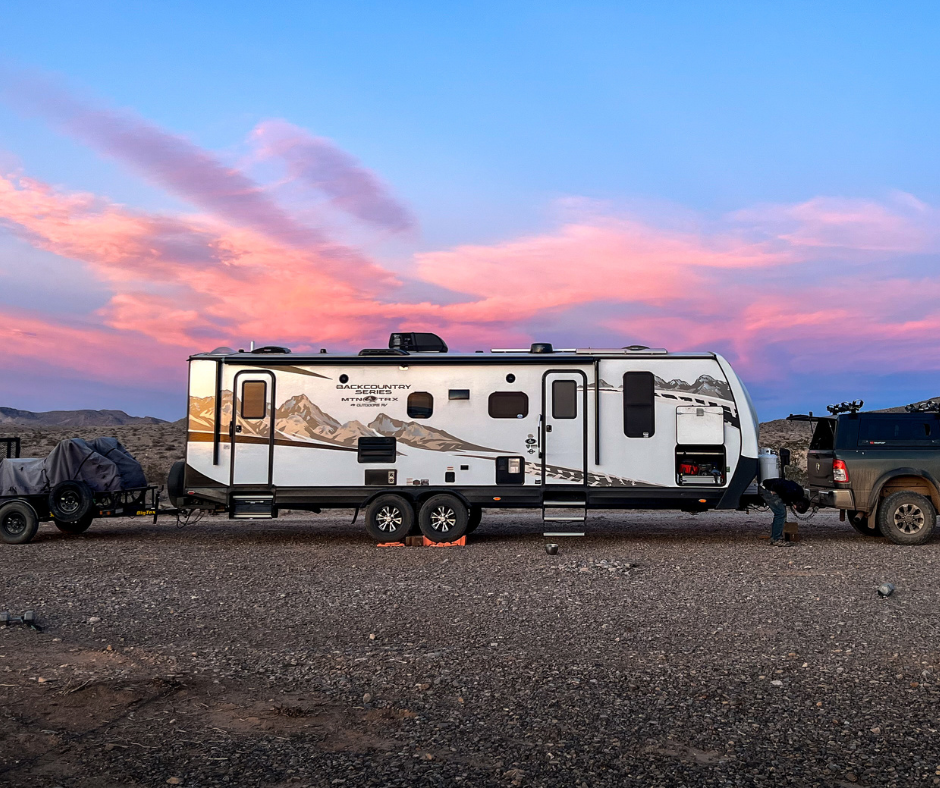
Table of Contents
The Realities of Full-Time RV Living and Travel
Have you ever dreamed of living a life of adventure, traveling the country, and exploring new places on your own terms?
That’s exactly what my husband Jake and I have been doing since 2019, when we decided to embrace full-time RV living .
It all started with a tiny 16-foot cargo trailer we converted into a cozy home on wheels, and in 2021, we upgraded to a spacious 28-foot Outdoors RV that gives us even more creature comforts.
But let’s not sugarcoat things—this lifestyle is not all sunshine and rainbows… there are definitely some downsides to living in an RV full-time.
In this post, I’ll give you an honest rundown of the pros and cons of full-time RV living based on our own hilarious and sometimes harrowing experiences.
What Is Full-Time RV Living?
Full time RV living refers to a lifestyle where an individual or a family lives in a recreational vehicle (RV) as their primary residence. This means that they travel and stay in the RV for an extended period, usually for months or even years, instead of living in a traditional house or apartment.
Pros of Full-Time RV Living
Let’s start with the good news, shall we? Full-time RV living offers a range of benefits that make it a truly rewarding lifestyle. Here’s a few of the benefits we’ve experienced by living this way:
Freedom to travel
One of the greatest perks of full-time RV living is the freedom to travel wherever and whenever you want. It’s an incredibly liberating feeling to know that you can pack up and hit the road at a moment’s notice.
Drive to Glacier tomorrow? No problem. Olympic National Park next week? Let’s do it. Getting to go wherever you want, whenever you want is so much fun.
Plus, the flexibility to choose your own adventure and travel at your own pace is truly priceless.
No more waiting for vacation days or saving up for expensive plane tickets—we have the whole country outside our front door.
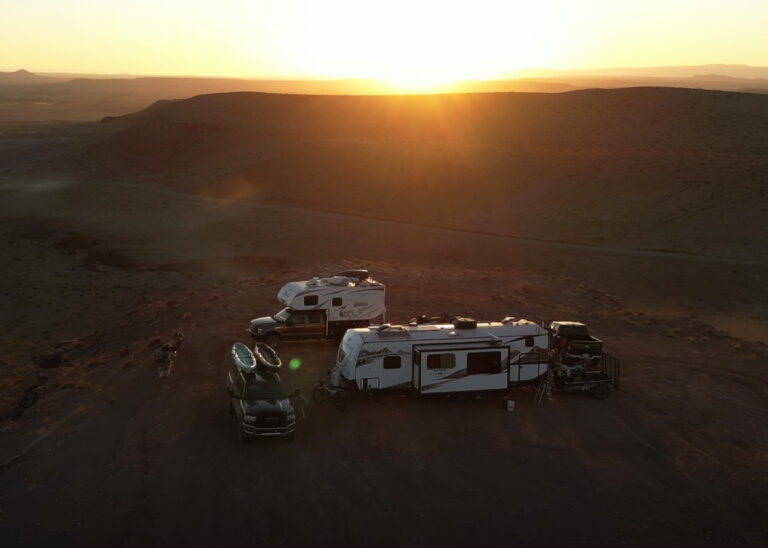
The scenery is always changing
Living in an RV full-time means that we are always on the move, and that’s what makes it so exciting.
Every two weeks or so, we pack up and hit the road to our next destination, which means we get to experience parts of the country that we never knew existed.
From the snowy peaks of the Rocky Mountains to the sandy beaches of the Pacific Northwest, we’ve seen some of the most incredible places in the United States.
We’ve hiked through the lush forests in the Oregon Coast, kayaked through the crystal-clear waters of alpine lakes, and camped in the shadows of towering red rock formations in Utah.
The best part? There’s always a new adventure waiting just around the corner.
Living in an RV gives us the freedom to explore the vast and diverse landscapes of our country, and we’re constantly in awe of the natural beauty that surrounds us.
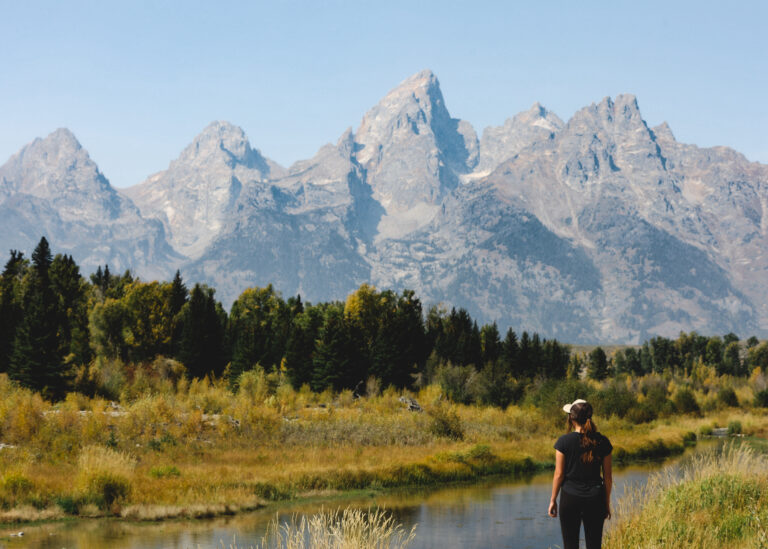
No matter where We Go, We Are Home
One of the biggest advantages of living in an RV full-time is that your home is always with you, no matter where you go.
This means that you get to have more experiences, more often, without ever having to worry about packing a suitcase or finding a place to stay.
Your RV is not just a mode of transportation, but also your own personal sanctuary. You have your own bed, your own kitchen, your own bathroom, and even your own closet. You never have to worry about forgetting something, because everything you need is always with you.
This level of convenience and comfort is truly unparalleled.
We love being able to cook our own meals and have a hot shower at the end of a long day of hiking or exploring. And when we’re ready to relax, we can curl up on our own couch and watch a movie or read a book.
The feeling of being able to make anywhere our home is truly empowering.
With our RV, we can go anywhere we want and always feel at home.
Now, that’s pretty cool if you ask me.
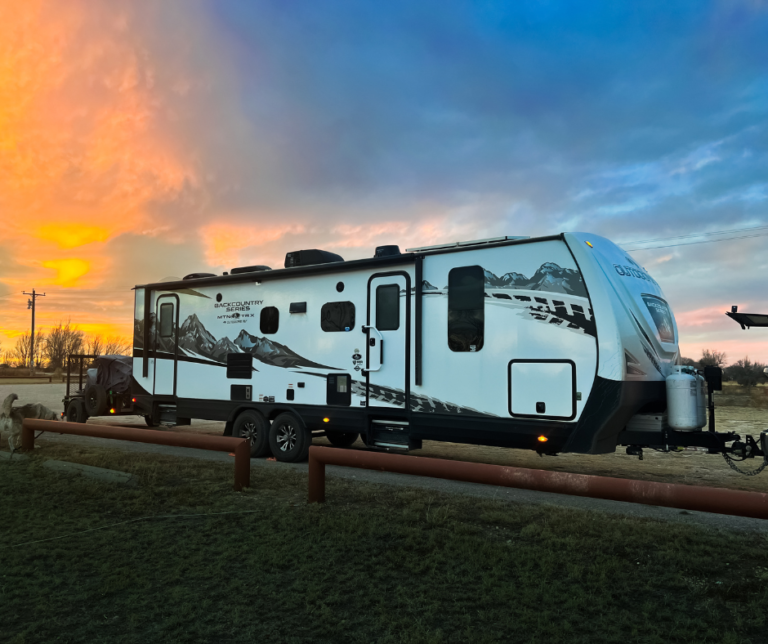
Relationship Growth
One of the most unexpected rewards we’ve experienced is how much it has strengthened our marriage.
When you live in a space that’s only 300 square feet, you quickly learn that you have to get along with your significant other.
There’s no escaping each other, and you have to learn how to make the most of your time together. But it’s not just about spending more time together—it’s also about learning how to communicate effectively.
It might sound funny, but we have also learned to fight better. Arguments, disagreements, and getting on each other’s nerves will happen, and the better you can figure out how to solve the issue, the happier you will be as a couple.
We’ve learned how to listen to each other more effectively, how to compromise, and how to work through disagreements in a healthy way.
Instead of getting lost in separate rooms or activities, we’re always close to each other, which has created a deeper sense of intimacy and connection.
Sure, there are times when we drive each other crazy, but those moments are far outweighed by the moments of joy, laughter, and love that we share.

We've Made Lifelong Friends
Living in an RV has allowed us to not only see some incredible sights but also to connect with some truly amazing people.
When we first started this lifestyle, I wasn’t sure if we would have much in common with other people who live tiny. But boy, was I wrong!
Everyone we have met on the road has been so welcoming and friendly, and we’ve formed some truly meaningful friendships along the way.
We’ve met families and couples who are doing the exact same thing as us, and it’s been so fun to swap stories and share tips and tricks. We’ve gone on hikes, played games, shared meals, and had some really great conversations with the people we’ve met on the road.
And while it’s always bittersweet when it’s time to say goodbye and hit the road again, we know that we’ve made some lifelong friends.
It’s incredible how this lifestyle has allowed us to connect with people from all walks of life and form such strong bonds in such a short amount of time.
Pictured below is one of my best friends, who is also a nomad! You can check them out on IG @thisisnomadic
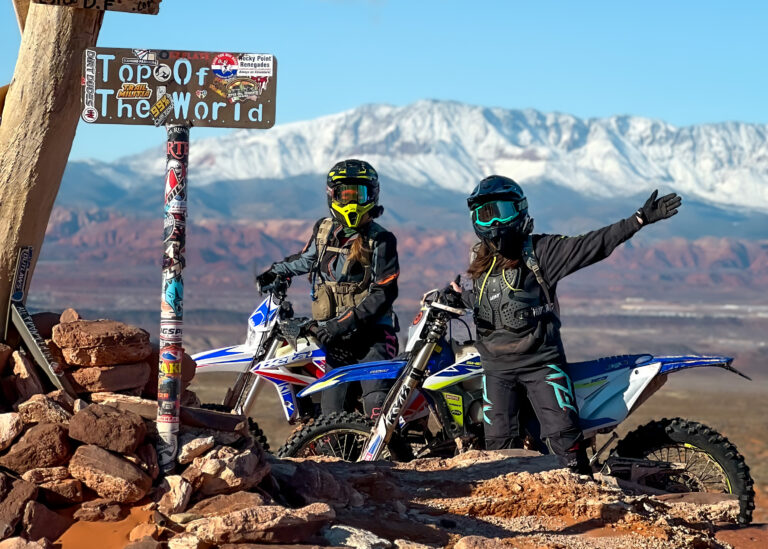
We Buy Less Things
Living in a tiny home on wheels has made me realize that less truly is more.
I used to be a hoarder, clinging onto every little trinket and knick-knack that caught my eye. But now, with limited space in my RV, I have to be more selective about what I bring into my home.
Gone are the days of buying things just because they’re on sale or because they’re the latest trend. Now, I have to think about whether something is truly essential or if it will just take up valuable space.
But don’t get me wrong, living with less doesn’t mean I’m living without. In fact, it’s quite the opposite. By eliminating the excess, I’ve made room for the things that truly matter—like spending time with loved ones, pursuing my passions, and enjoying the simple pleasures in life.
Living in a tiny home on wheels has taught me that happiness doesn’t come from material possessions, but from the moments and experiences that we share with others.
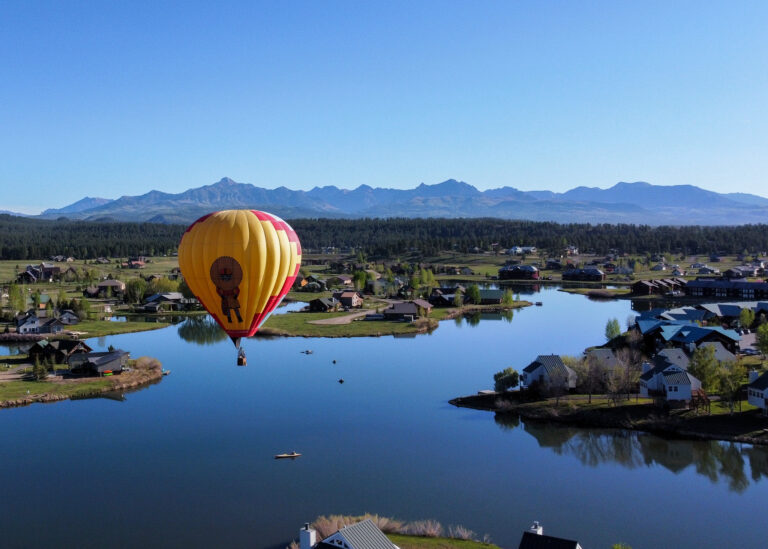
We Get to be with our Dogs 24/7
And let’s not forget the added entertainment that pets bring to your RV lifestyle! From seeing your dog’s excited tail wagging as you hit the open road to their hilarious attempts to catch a moth inside the RV, your furry friends will keep you laughing and on your toes.
Of course, full-time traveling with dogs does come with its challenges, such as finding appropriate places for them to potty and dealing with shedding hair. But with a bit of planning and some handy cleaning tools, these challenges are easily overcome.
And let’s be real, who doesn’t love having a loyal companion to snuggle up with on those chilly nights or to go on a long walk with through a scenic trail?
Your pets are a part of your family, and with full-time RV living, they can be a part of your adventures too!
Plus, many RV parks and campgrounds even offer amenities designed specifically for pets, such as dog runs and pet washing stations, so your furry friends can enjoy the outdoors as much as you do. It’s a win-win situation for everyone involved!
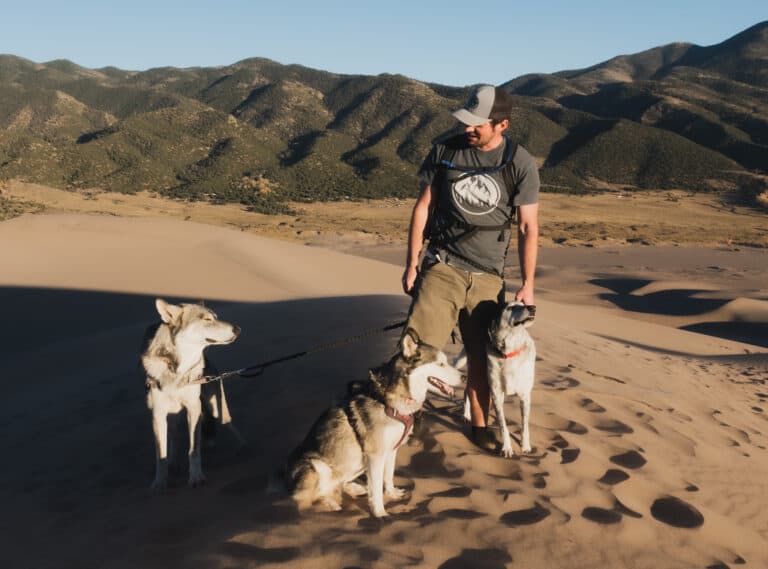
We are more grateful for what We have
Living tiny has made me realize that you don’t NEED material things to make you happy.
In a world where we’re constantly bombarded with advertisements and social media posts showcasing the latest and greatest products, it’s easy to get caught up in a never-ending cycle of wanting more.
But when you’re living in an RV, you quickly learn to value the things that truly matter—the people you’re with, the experiences you have, and the memories you create.
You become more mindful of what you bring into your home on wheels, and you start to appreciate the little things in life that you may have overlooked before.
From a beautiful sunset to a cozy night in with your loved ones, you learn to find joy in the simple things. And as you start to shed the excess stuff and simplify your life, you’ll find that you have more time and energy to focus on the things that truly matter.
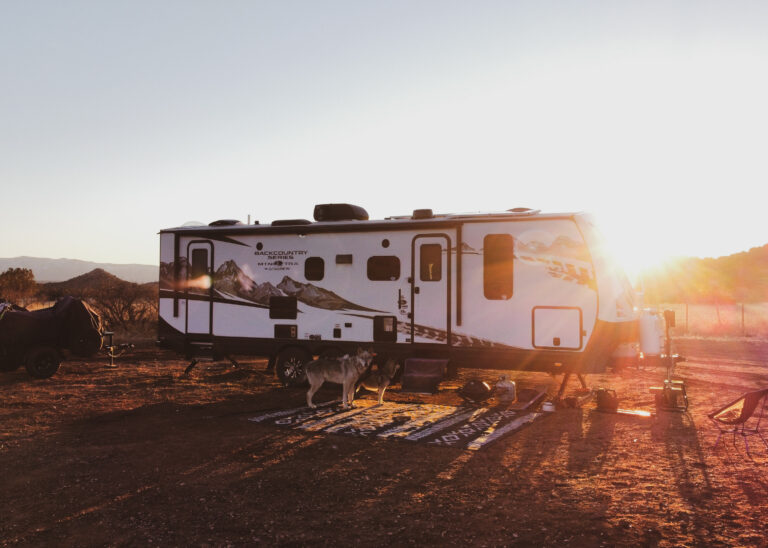
RV Living Saves Us Money
When we first decided to live in an RV full-time, one of the biggest draws was the potential to save money on rent, utilities, and other expenses.
And let me tell you, we were not disappointed!
Living in an RV can be a fantastic way to cut costs and live more frugally. For starters, we don’t have to worry about a mortgage or rent payment every month.
Instead, we pay a much lower fee for our brand new RV. Plus, we save a ton of money on utilities because our RV is designed to be energy-efficient.
We use solar power to run our lights and appliances, and we have a propane tank for heating and cooking. This means that our electricity and heating bills are virtually nonexistent!
Living in an RV has allowed us to save money while still enjoying all the comforts of home. Who says you can’t have your cake and eat it too?
Learn more about the Costs of RV Living .
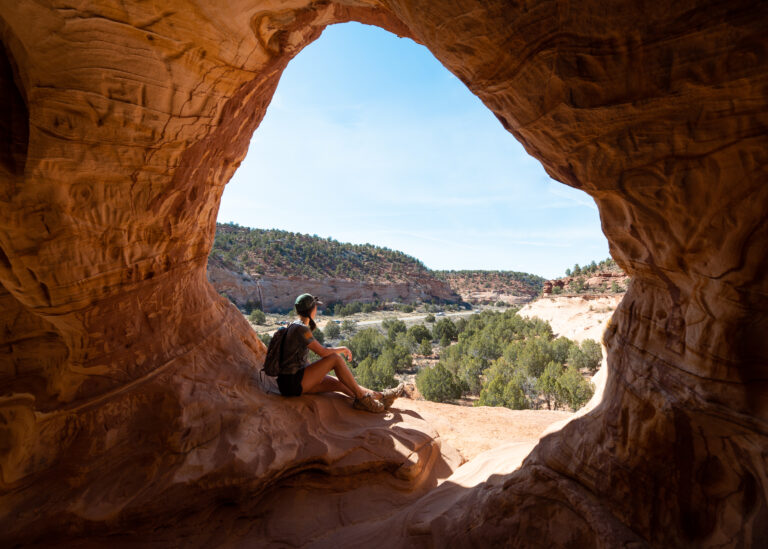
We Get to Pursue a Debt-Free Life
Living tiny means you get to stick it to the man, and by the man, I mean debt.
Who needs a mansion when you can have a cozy little space that’s completely debt-free? You can finally tell those pesky bills to take a hike and redirect those funds toward achieving your financial goals.
No longer do you have to worry about impressing others with your fancy cars or designer clothes. You can focus on living within your means, saving money, and living your best life.
The best part? You’ll finally have the peace of mind that comes with being debt-free. No more debt collectors calling you at all hours of the day and night.
You can relax, knowing that every penny you save is going toward achieving your financial goals and not just toward paying off frivolous expenses.
So, why live in a mansion when you can have a tiny home on wheels and live your best debt-free life?
Cons of Full-Time RV Living
While full-time RV living is undoubtedly an adventurous and rewarding lifestyle, let’s be real here—full-time RV travel isn’t always sunshine and rainbows..
Breaking Down Sucks
As much as we’d all love to avoid them, the reality is that at some point, you’ll experience engine failures, flat tires, water pump malfunctions, and other mechanical issues.
It’s like a rite of passage for all road warriors. But fear not, you can either learn how to fix these things on your own (hello, YouTube tutorials!), or spend a fortune hiring a professional to do it for you. The choice is yours!
Of course, the best defense is a good offense. Keep up with regular maintenance and inspections to minimize the risk of breakdowns. This means getting regular oil changes, rotating your tires, and checking fluid levels—the whole shebang. Think of it as giving your rig a spa day, only this spa day keeps your rig from breaking down in the middle of nowhere.
But even with proper maintenance, breakdowns are still bound to happen. So, have a plan in place for how to handle the situation. Emergency roadside assistance is a must-have, and don’t forget to pack a tool kit for those minor repairs.
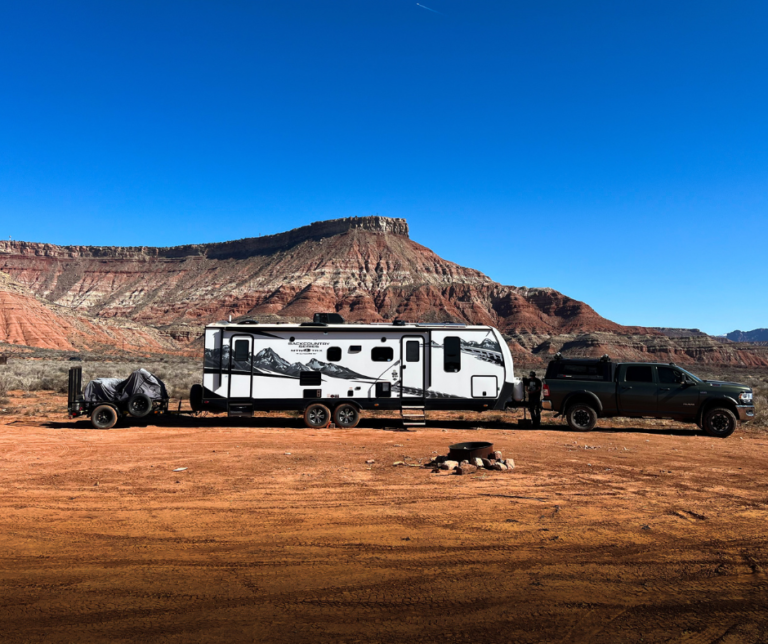
Bugs and Mice Also Like RV life
One of the challenges of full-time RV living is dealing with all of nature’s smallest creatures.
When you’re out in nature and boondocking in remote locations, you’re more likely to encounter all kinds of critters, including mosquitoes, flies, ants, frogs, lizards, mice, and more.
While it may be frustrating to deal with the constant presence of bugs, it’s a small sacrifice for the freedom and flexibility that comes with full-time RV living.
However, there are ways to minimize the number of bugs that you encounter while RVing. One effective method is to keep your RV clean and free of food scraps or crumbs that might attract insects. It’s also important to keep your campsite clean, and to dispose of trash properly to avoid attracting bugs.
Another way to deal with bugs is to invest in screens for your RV windows and doors. This allows you to enjoy fresh air while keeping the bugs out. Bug zappers and citronella candles can also be effective in repelling bugs, and there are many natural bug-repellent options available as well.

The Laundromat is Really Inconvienient
And let’s not forget about laundry. Unless you’re planning to rock the same outfit for weeks on end (hey, no judgement), you’ll need to figure out a way to wash your clothes.
While this may not seem like a big deal at first, it can become a time-consuming and mundane task, especially if you have a lot of laundry to do.
Visiting the laundromat every week can take up a couple of hours of your time, which could be spent exploring new places or doing other fun activities. It can also be a hassle to find a laundromat in an unfamiliar area or deal with the crowds of people trying to do their laundry at the same time.
However, I try to make the most of my time at the laundromat. Sometimes I bring my laptop so I can get some work done while waiting for my clothes to wash and dry. Other times I’ll use the time to catch up on reading, watch a movie, or simply relax.
If I am being honest, the best way to minimize the amount of laundry I need to do is by wearing my clothes a few more times before washing them.
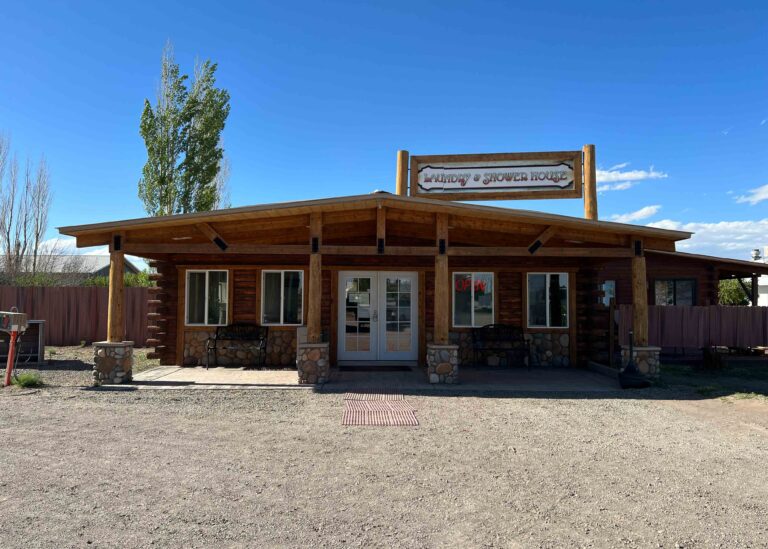
Unpredictable Neighbors
Ah, unpredictable neighbors—they’re like a box of chocolates, you never know what you’re going to get.
As a full-time RVer, I’ve had my fair share of run-ins with these characters. While most fellow RVers are respectful and considerate of each other’s space, some weekend warriors seem to have missed the memo on campground etiquette.
From blasting music at all hours to leaving trash all over the place, these unpredictable neighbors can be a real pain in the you-know-what.
And let’s not forget those inconsiderate souls who think it’s perfectly acceptable to have a roaring bonfire at 3am. Um, hello? Some of us are trying to catch some z’s here!
But fear not, my fellow RVers, there are ways to deal with these unruly characters. First and foremost, keep your cool and approach the situation calmly.
It’s amazing how a friendly conversation can often defuse the tension and lead to a peaceful resolution. Of course, there are always those stubborn individuals who just won’t listen to reason. In those cases, it may be time to move camp.
Now, don’t let the unpredictable neighbors scare you away from the RV lifestyle. For every loudmouth and litterbug, there are ten friendly and considerate RVers just waiting to make your acquaintance.
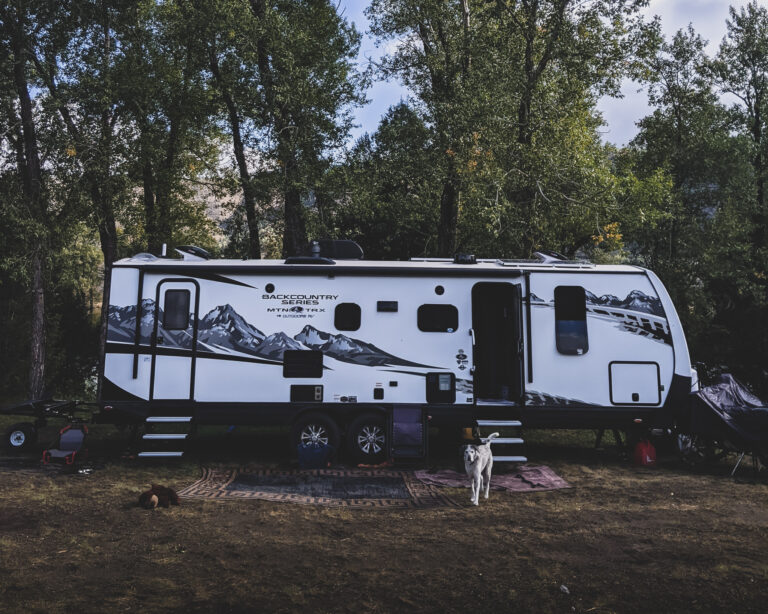
Missing friends and family you left behind
Being on the road full time means that you have to leave your friends and family behind.
Before we hit the road, I had a very close relationship with my parents. But now, we only see each other a couple of times a year.
Thank goodness for technology, am I right? Video chats have become my lifeline to the outside world. I mean, who needs in-person interactions when you can talk to your loved ones through a screen?
Just kidding, I miss them like crazy. But video chats definitely help bridge the distance.
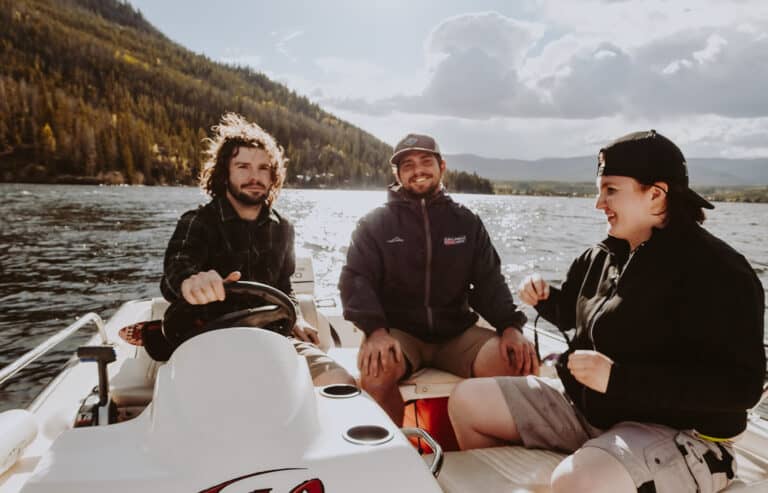
No bubble baths
Ah, the luxury of a nice, relaxing bubble bath. Sounds heavenly, doesn’t it? But, unfortunately, as a full-time RVer, bubble baths are nothing but a distant memory.
I know what you’re thinking – “but why can’t you just take a bath in your RV?” Oh, sweet summer child, if only it were that simple. RVs come with tiny bathtubs, if they come with one at all. And let’s be real, after a long day of driving and adventuring, the last thing I want to do is squeeze my body into a cramped, uncomfortable bathtub.
And even if I could fit, there’s the issue of water usage. RVs have limited water tanks, which means every drop counts. A bubble bath would drain my tank faster than you can say “rub-a-dub-dub”.
So, what’s a bubble-bath-loving RVer to do? Well, we have to get creative. I’ve become an expert at finding natural hot springs along my travels.

Spotty Cell Service
Spotty cell service—the bane of every full-time RVer’s existence. You’d think in this day and age, we’d have reliable cell service no matter where we go, but nope, we’re still at the mercy of those darn cell towers.
As full-time RVers, we rely on our phones for everything—staying connected with loved ones, getting work done, and of course, scrolling mindlessly through social media. So, when we find ourselves in an area with little to no cell service, it’s like we’ve been cast into a dark, lonely void.
But, there is a glimmer of hope. We recently upgraded to Starlink, the internet from space, and let me tell you, it’s a game-changer.
Gone are the days of having to scour the internet for hours, looking for places with decent cell signal, like a pack of hungry wolves hunting for prey.
It was exhausting, to say the least.
Now, we can set up camp just about anywhere and still have lightning-fast internet speeds. It’s like the heavens have opened up and bestowed upon us the gift of connectivity.
You can read more about how full-time RVers get internet .
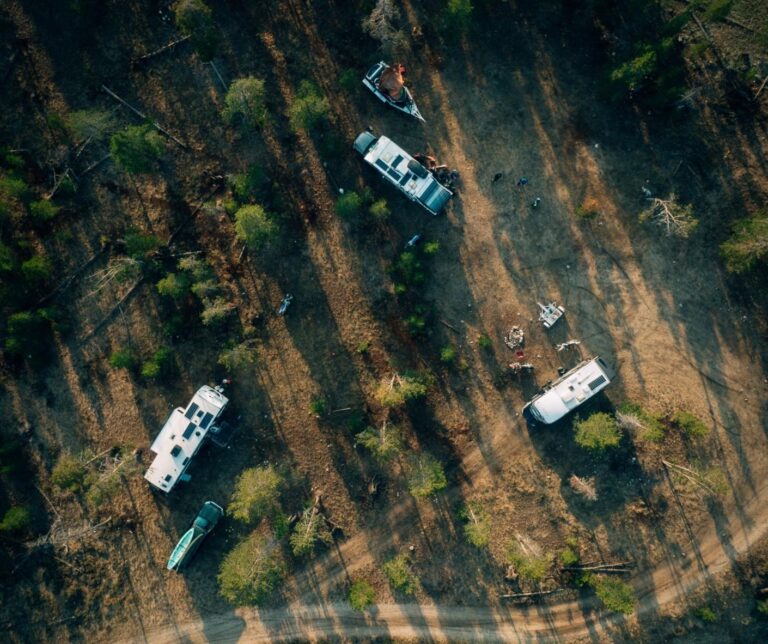
Towing A Long RV is Scary
Let me tell you, towing a long rig is not for the faint of heart. It’s like being the captain of a massive ship, except your ship is on wheels and you have to navigate through narrow roads, winding turns, and low-hanging branches.
And forget about those cute little RV parks that have spaces the size of a postage stamp. We need space, people!
Did I mention we also triple-tow? AKA, the art of hauling not one, but TWO trailers behind your tow vehicle—we’re a train! At 65 feet long, our setup is longer than the average blue whale!
We’re like a traveling circus, with our big rig and two trailers in tow. People stare as we roll into town, wondering if we’re some kind of freak show.
But hey, we like to live on the wild side, and triple-towing is just another adventure to add to our list.
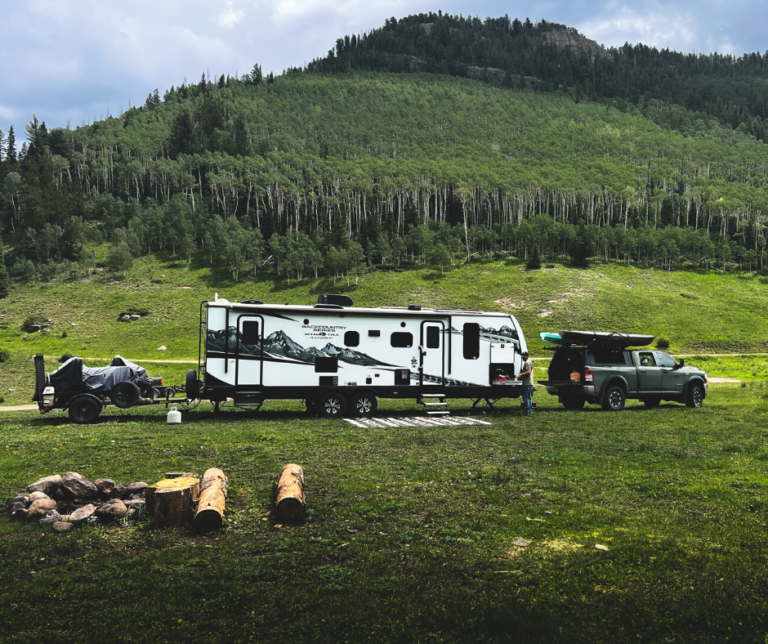
Navigating unfamiliar locations is Hard
We’ve had our fair share of moments where we’ve turned down a road and ended up in a dead-end, or worse, stuck on a narrow road with no way out.
Maneuvering a massive rig through small, narrow streets and dodging low-hanging branches can be a real challenge.
And let’s not forget about trying to navigate through a busy town with lots of traffic and pedestrians. It can be like playing a real-life game of Frogger, but with a giant RV instead of a frog.
And don’t even get me started on finding a parking spot. Trying to find a spot big enough to fit a 65-foot RV can be like trying to find a needle in a haystack. And if you do manage to find a spot, you have to be careful not to block traffic or take up too much space and piss the locals off.
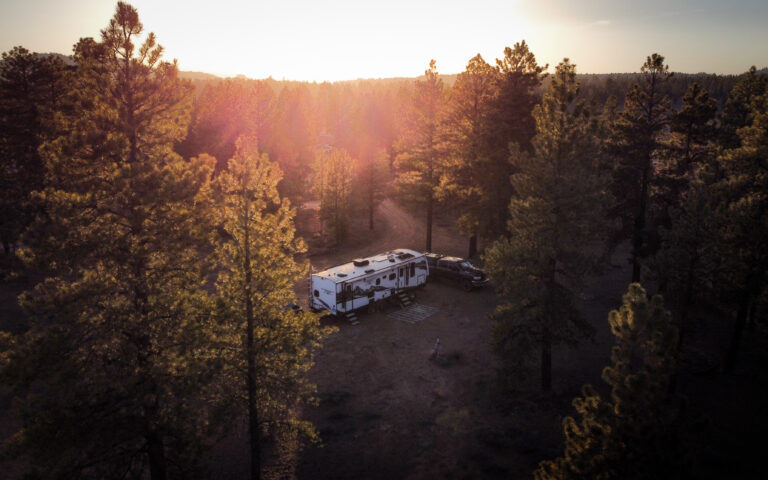
Unpredictable Weather
From scorching heat waves to unexpected snowstorms, you never know what Mother Nature has in store. It can get hot and humid, or downright freezing, and you need to be ready for both extremes.
But despite the challenges that unexpected weather can bring, there’s also a certain thrill to it all. Watching a lightning storm light up the sky from the safety of your RV can be an unforgettable experience. And there’s something magical about waking up to a fresh blanket of snow on the ground outside.
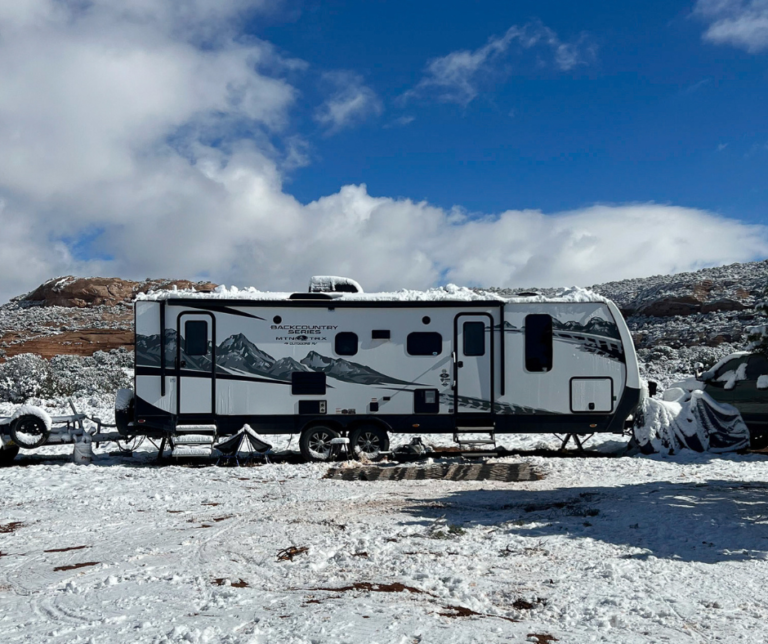
Dumping The Black Tank is Gross
Let’s face it—dumping the black tank is nobody’s idea of a good time. And that’s probably because it’s gross. I mean, let’s be real here—nobody wakes up in the morning and thinks to themselves, “Gee, I can’t wait to dump my toilet waste today!”
But alas, it’s a necessary evil of RV living. And if you’re not careful, it can turn into a pretty crappy situation. Literally. One wrong move and you could end up covered in…well, you know. So, if you’re not into playing with poop, you might want to think twice about full-time RV living.
Of course, there are ways to make the process less gross—like wearing gloves and a full-blown hazmat suit, for example.
All joking aside, if you’re willing to embrace the grossness of the black tank, then go ahead and dump away. Just don’t say I didn’t warn you.
The Beautiful & Ugly of Full Time RV Travel
I feel it is important to be transparent about the pros & cons of full time RV travel. The good, the bad and the ugly.
But let’s be real, the good outweighs the bad by a long shot. Yes, unpredictable weather can throw a wrench in your plans and emptying your black tank might not be the most glamorous task, but those small inconveniences are just a small price to pay for the freedom and adventure that comes with life on the road.
From waking up to stunning mountain views to meeting new friends at a campsite, full-time RV living offers a unique and fulfilling way of life that we love.
So if you’re on the fence about full-time RV living, just remember—the good, the bad, and the ugly all come with the territory. But if you’re willing to embrace it all, you just might find that life on the road is the adventure of a lifetime.

Resources For Further Reading And Research:
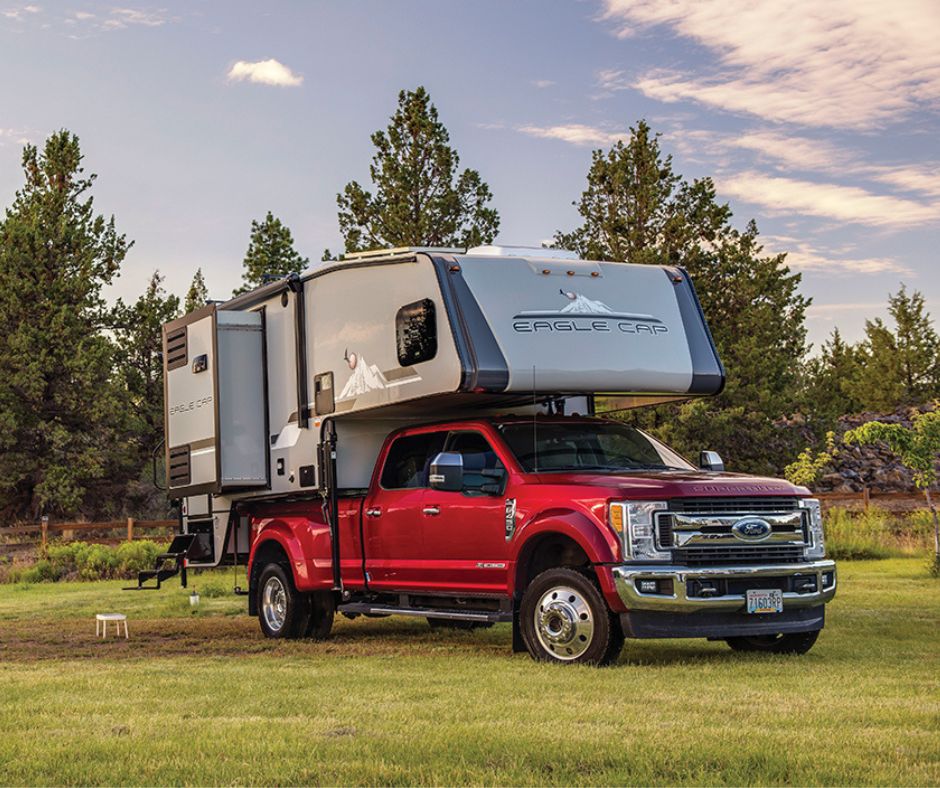
Truck Campers With Three Slide-Outs for Triple the Space!

A Guide to Replacing Your RV Mattress (For Full-Time Living + Travel)
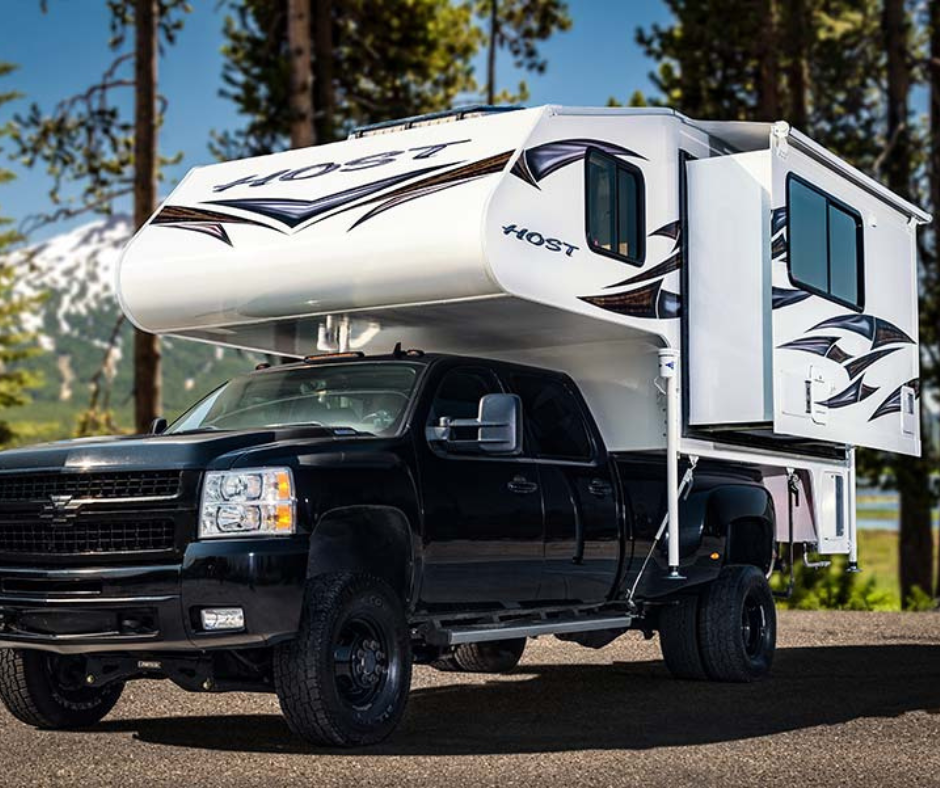
Best Truck Campers With Two Slide-Outs for Double the Space
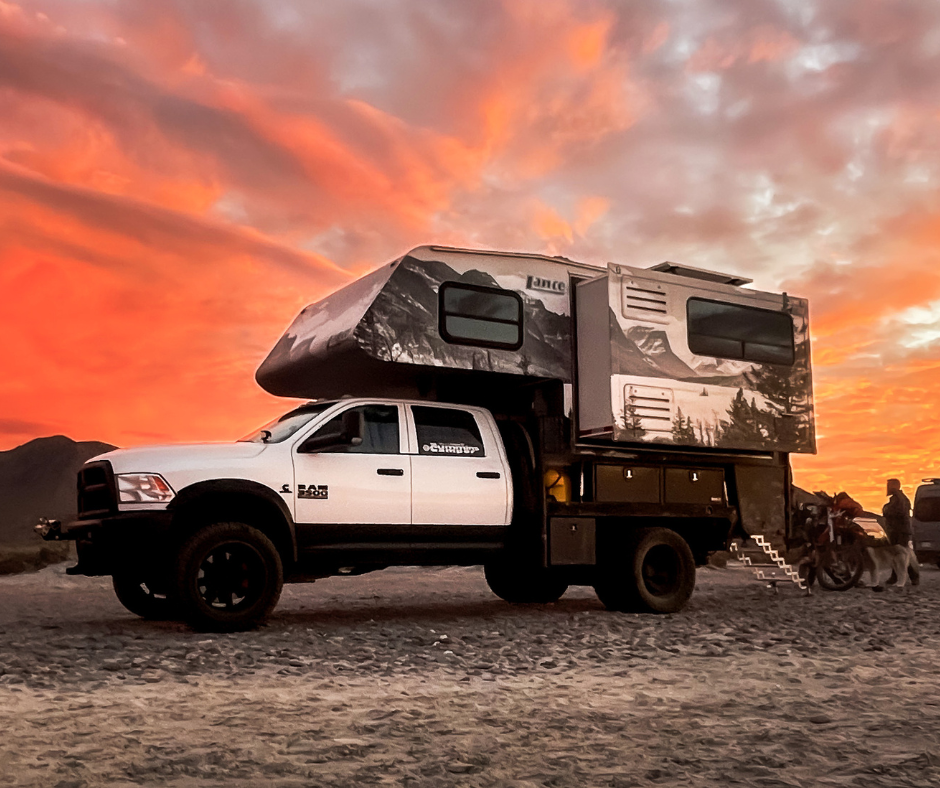
Best Single-Slide Truck Camper Floor Plans in 2023
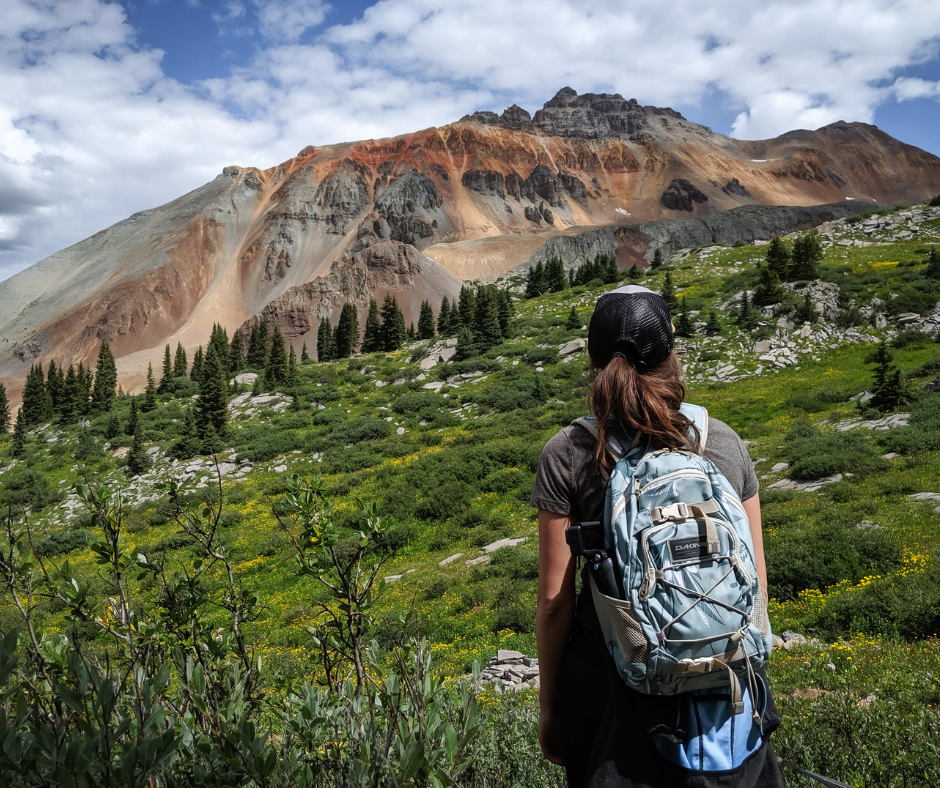
20 Safety Tips for Solo RV Travel (Full-Time)
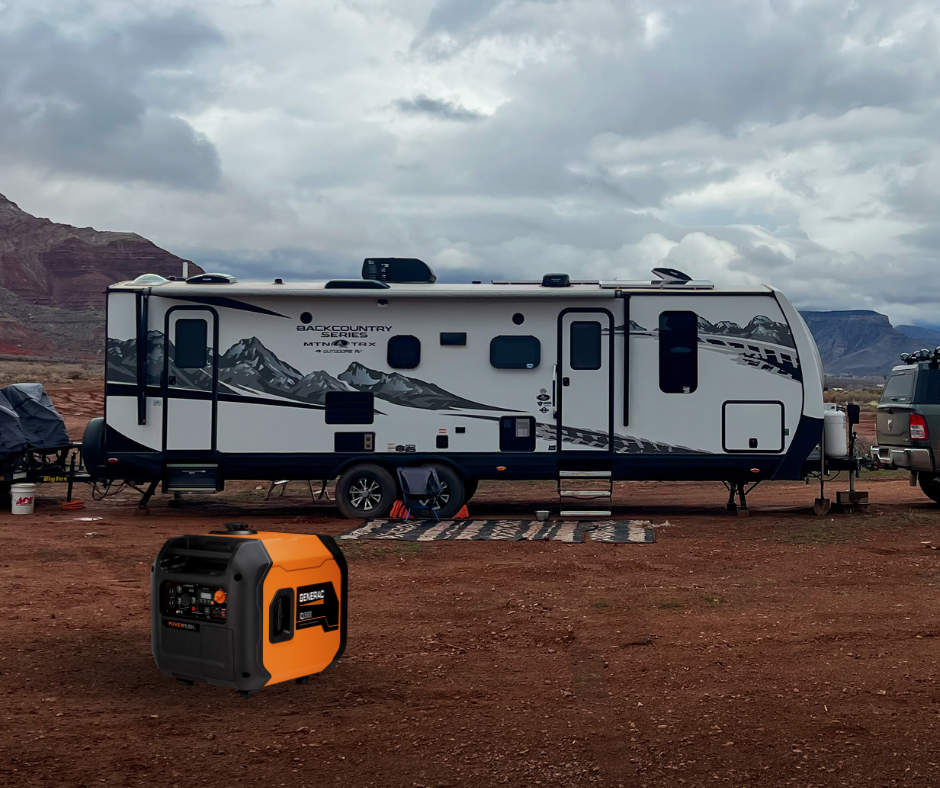
5 Best Generators for Full-Time RV Living + Boondocking
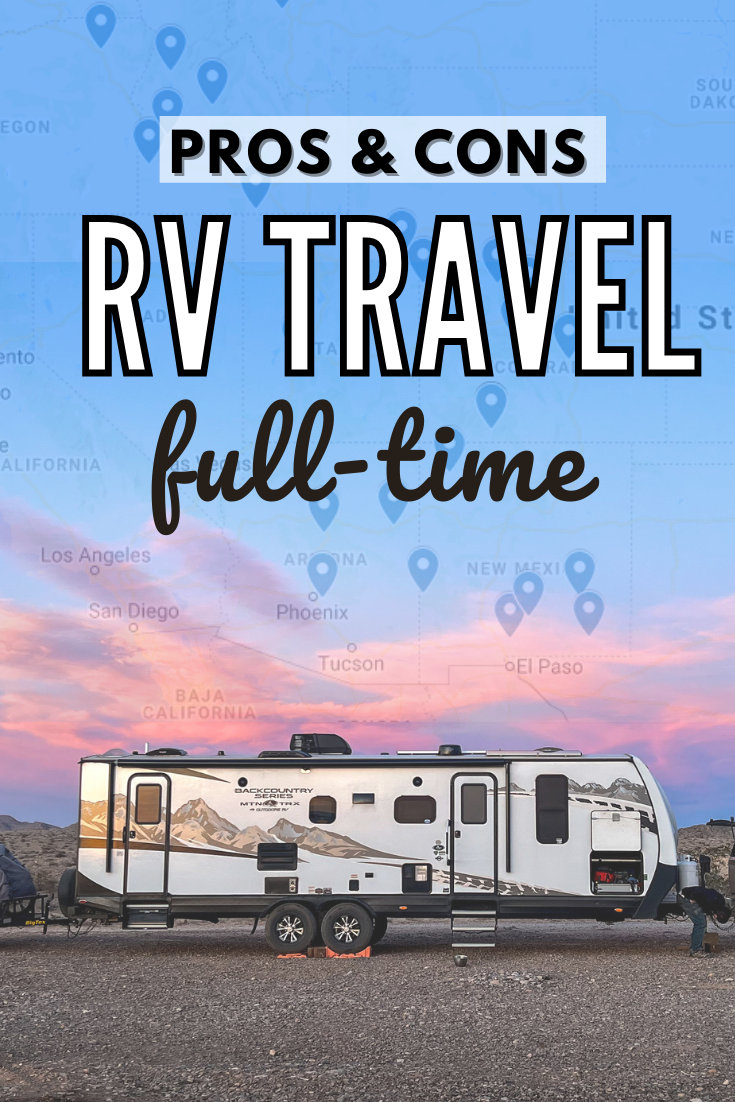
Leave a Reply Cancel reply
Your email address will not be published. Required fields are marked *

How to Travel With a Full-Time Job: 6 Creative Ways
By: Author Vanessa M.W.
Posted on Last updated: March 12, 2024
I’ve been living and working abroad since 2013 and I can confirm there are MULTIPLE WAYS to travel with a full-tome job. No, you don’t need to give up your career. Yes, people will actually pay you!
The pandemic truly made us re-evaluate our priorities and I’m 100% here to help. If you’re dreaming of a more flexible work environment that will allow you to travel while working full-time, I have 5 creative ways to make that happen for you.
In this article, I’m going to discuss:
- Choosing the right travel/work balance for you
- 6 ways to travel while working full-time
- My favorite apps to make working while traveling easier
- Important tax considerations when you’re on the road
- Ways to get sh*t done at work while away from your normal set-up
If you think this path is right for you and you want to pick my brain about your specific circumstances, book a one-time 45-minute private coaching session with me.
Is Traveling with a Full-Time Job Right for You?
Not everyone is meant to be on the road 24/7 so you’ll want to figure out what’s the right path for you and your work style. There are a few important questions to consider
- Will I be traveling alone? Or do I have a partner or family members to consider?
- What countries can I currently work in easily? Do I need a work visa?
- What’s my budget for traveling while working full-time? Can I make less in exchange for greater flexibility?
- What are my career goals? Is there a specific timeline I need to be conscious of?
After evaluating these questions, your strategy should become clearer about what sort of circumstances are right for you when it comes to blending your career-travel ambitions.
For example, when it comes to traveling while working full-time, I have a partner I need to consider – but no children – so it’s easy to take off whenever I want to for up to a month without feeling guilty.
For anything longer than a month, I would need to have a conversation with my partners to ensure we’re on the same page.
However, backpacking for a year while being a digital nomad is not really conducive to my professional or personal aspirations.
I don’t want to be apart from my family that long and this becomes a tax nightmare for me.
You’ll need to decide what type of travel you want to do while working full-time (long-term backpacking vs shorter trips) before moving on to my 5 recommended ways.
6 Creative Ways to Travel while Working Full-Time
If you want to work full-time and travel easily in your spare time, here are your best options! I’ve done nearly every single method so you can trust me when I say – it’s totally doable.
1. Transition Your 9-5 Abroad (Indefinite)
No one ever tells us this in America, but if you’re a skilled person, you can take your career overseas!
Whether you’re a teacher or a Product Manager (like me!), there are international companies who are eager to bring you to their offices abroad!
Currently, I work for a global travel tech company as a product manager. I started working for them in London (in 2017) and I was able to negotiate a transfer to their Germany offices in 2020. I’ve been in Germany ever since.
You don’t need to abandon your career ambitions to move abroad if you’re a competitive person. Visa, Facebook, and all the other international companies have global locations that you can transfer to with enough effort.
Read my article about finding a job abroad here.
Once you’re outside of America, travel becomes naturally easier. As I’m writing this blog post, I’m currently waiting in the Berlin Brandenburg business lounge on my way to Rome.
I’m taking my laptop and I’ll be remotely working from Italy for the next week!
When I was living and working in Beijing, I was able to take off to Hong Kong and the Philippines without much money or planning.
Frequent travel while working full-time is much easier once you get out of the United States; trust me.
As Americans, we have an additional tax reporting responsibility when we work abroad, but don’t let that deter you.
You need to understand that it’s really just a reporting responsibility and only under extreme circumstances will you be double taxed.
Read my article about American expat tax requirements here.
2. Negotiate a Remote Contract (1+ year)
If you’re lucky enough to negotiate a remote contract, congratulations! You’ve truly secured a golden ticket that most people would kill for!!
I was able to negotiate a German remote contract in Aug 2021 and that’s how I have so much flexibility.
So what is a remote contract?
Essentially, a remote contract specifically removes any location-dependent clauses from your work contract. However, remote contracts will likely include a country-specific reference because they need to abide by some sort of legal framework.
With a remote contract, you can easily travel while working full-time because there’s no expectation for you to come into a specific office. You only need to get the work done wherever you are in the world.
For example, my remote contract is specifically a German contract. This means I pay tax to the German government and I get to enjoy the social security and healthcare benefits of living in the European Union.
If you’re able to negotiate a remote contract and want to move outside of the country that your contract specifically references, you’ll need to consider how that will affect your tax liability and immigration status.
A good rule of thumb is: if you’ve been in a country longer than 3 months, you should start exploring if that country expects you to pay tax locally and if you’re in violation of your tourist visa.
Some countries and regions (like the UK) have super generous tourist visa allowances, but tourist visas are not work visas so tread carefully.
Furthermore, if you’re paying taxes in the United States, but haven’t been in the country for more than 35 days, you might be entitled to a massive tax refund since you’re not technically a full-time resident.
Set up a consultation with my trusted tax partner – My Expat Taxes – to find out more about tax and reporting responsibilities as a remote US worker.
3. Volunteer Abroad (2-6 months)
If you’re just starting your career or are less concerned about bringing your 9-5 abroad, you should seriously consider volunteering abroad.
There are a variety of websites that match volunteers with hosts in different countries to do a ‘work-exchange.’ In a ‘work-exchange,’ you’d exchange your labor and skills for food, room, and board.
A few things that you can do when volunteering abroad include:
- Organic Farming (WOOFing)
- Working at the front desk of a hostel
- Becoming an Au Pair (in the EU or America)
- Work as a camp counselor (I did this in Morocco!)
- and so much more!
There are endless opportunities if you want to volunteer abroad, but you’ll need to bring some savings with you as you won’t be paid for this work.
My favorite websites are:
- workaway.info
- Worldpackers.com
It’s also important to know that since this is a volunteer opportunity, you’ll need to be extra careful with your tourist visa allowance because there are always time limitations. You cannot get a work visa through a volunteer opportunity.
I‘ve lived abroad for many years and love helping others find work abroad and figure out their “Move Abroad Plan.” Check out my class below to get you started ASAP!

4. Become a Digital Nomad (1 month-2 years)
Becoming a digital nomad can be super exciting!…. but it can be tiring toward the end lol.
Moving from place to place every 30 days to make sure you’re not in violation of your tourist visa gets to you after the 2nd year, but I would still encourage everyone to do this if they have the opportunity.
So what’s the difference between being a digital nomad and having a remote contract?
Not much actually. I think the real difference between the two classifications is probably how stable the income is. A remote worker still has a traditional 9-5 whereas a digital nomad is often an entrepreneur or freelancer.
As a digital nomad, you have two options when it comes to creating a home base.
First, you can choose to bounce across countries every 1-2 months to ensure you can take advantage of all the financial benefits that come with not being tied down to a single location.
Your second option is to take advantage of a digital nomad visa in a foreign country, which will allow you to establish your tax residency there for 1 to 2 years.
There are benefits with both options; it just depends on how comfortable you are with uncertainty and constant movement.
If you choose option 1, not only are you going to need to find clients and establish a consistent cash flow, but you’ll also need to change countries every few months. This might feel overwhelming to some people; I know it was overwhelming for me.
Read this article about easy countries to move to for Americans to start your digital nomad research.
5. Short-Term Contract (2-6 months)
Contract work is often a great way to gain international experience and travel while maintaining a 9 to 5.
Essentially this means that your company sends you to a different country for a brief amount of time to complete a specific project.
These temporary contracts will likely send you abroad for 2-6 months and your company will provide you with an ‘Expat Package.’
This means that they will pay for everything; which includes housing, flights, a food stipend, and more!
I was sent on a short-term contract to Turkey for less than 2 months and it was a wild experience!
I was able to work as an emergency aid worker and was given a company apartment with a spending stipend. I saved every penny of my paycheck!
If you’re interested in doing a short-term contract, it’s important that you focus on getting the best package possible because you are uprooting your entire life to pursue this opportunity.
For example, these are the things that I would absolutely require if I was going to a new country on a short-term contract.
- My accommodation to be found and paid for in full
- Private health insurance and international medical facilities
- A food and living stipend for everyday costs
- My flights to and from paid for
Obviously, if you are volunteering to work on a short-term contract these things are not going to be guaranteed. However, any company that is reputable will likely provide all if not the majority of the following things in addition to your normal salary.

6. Travel Scholarship (3 months -2 years)
Did you know that there are travel scholarships that will pay for you to study and volunteer abroad for a certain amount of time? These are often called paid travel opportunities.
My favorite way of discovering paid travel opportunities is through my friend’s website packslight.com.
Gabby is an absolute master when it comes to applying and finding paid travel opportunities that will get you across the world at no additional cost to you.
What you’ll need to do is send in an application for the various opportunities.
Then, someone will contact you as a finalist or if you are successful in the application you can expect the company to organize and pay for your travel abroad.
My Favorite Digital Nomad Apps for Employees on the Go!
When you’re traveling and working abroad, there are certain apps that will make your life more bearable as you jet-set across the world!
Here are my favorite apps and websites for digital nomads:
Express VPN
If you’re ever wondering how you’re going to watch your favorite American Netflix shows while you’re abroad, then look no further than Express VPN !
They will help you keep in contact with all of your country’s pop culture references no matter where you are in the world.
TransferWise
Because I have multiple clients that are international and have outstanding student loans to pay, I need to send money in different currencies back and forth across the world.
The most affordable way to do that is via TransferWise . You can load all sorts of currencies into your account and then exchange them into different currencies for a fraction of the cost that your bank will charge you.
If you’re interested in setting up a coaching business, look no further than Teachable .
Teachable is an online platform that helps me keep in contact with my customers all over the world and they make taking payments easy with the Stripe integration.
Whenever I’m looking for freelancers, I always start on Upwork.
Upwork allows me to hire people from all over the world and their payment protection plan gives me the confidence I need about the quality of work my freelancers will perform.
I believe in Upwork so much, that I’ve been using it for the last eight years.
When I first moved abroad, I don’t think I truly understood how much emotional stress the move was going to cause me.
That’s why I really enjoy using online therapy services, like BetterHelp , because no matter where I am in the world I can always stay with the therapist I trust and I can do my sessions in my native language.
Opening a bank account as a foreigner abroad is incredibly difficult. I’m so grateful that N26 allows me to spend local money in Europe despite having an American passport.
The flexibility of N26 made it possible for me to sign an apartment lease and to start my life in Germany properly.

Important Tax Considerations for Traveling while Working
Something I wish someone would’ve told me before I moved abroad was the fact that there is no way to avoid taxes, no matter where you are in the world.
Even if you have a company registered outside of the country you’re living in currently.
If you are American or a green card holder, you are expected to report and file taxes every single year no matter where you are in the world.
But reporting and Filene doesn’t necessarily mean paying additional taxes to the United States if you don’t currently live there.
If you stay out of the US for at least 330 days in a full calendar year, you will potentially not need to pay taxes to the United States government.
However, it is likely that you are a tax resident in another country and will owe taxes there instead.
If you are a digital nomad from the United States, and you don’t take up residency in any one country then you could potentially receive a large tax refund from the US government come tax season.
Use Form 2555 to claim the Foreign Earned Income Exclusion.
For more specific information on what forms to file and how to file correctly, head on over to my trusted partner My Expat Taxes .
My Expat Taxes is a wonderful resource and software to ensure you get the maximum refund possible while still remaining budget-friendly.
Ways to Get Sh*t Done while Working and Traveling
It’s definitely not easy to stay focused while traveling and working full-time. Somehow corporate meetings just aren’t as interesting as cenote dives and adventures across the ocean. [LOL]
Here are a few ways I stay focused while working full-time and traveling.
First, be sure you have a good set-up in your new home to do your work. There’s nothing worse than trying to get work done in an awkward sitting position or just on your bed.
Next, some countries are not known for their strong Wi-Fi signal, be sure to inquire before you arrive with your Airbnb host that the Wi-Fi is suitable to conduct meetings and streaming.
Third, check to see if there are any low-cost co-working stations in the city that you’re traveling in.
They often have day passes or short-term agreements so people just like you can come in and work in a normal environment every so often.
Finally, make sure to adjust your work calendar based on the different time zones that you’ll be traveling through.
This is an automatic feature but you have to enable it in order for your meetings to be expressed correctly.
Now You’re Ready to Start Traveling while Working Full-Time
I hope you found this article to be helpful in giving you ideas regarding how to balance a full work schedule with your ambitions to travel.
There are so many opportunities to travel and work full-time, you just need to find the right option for you.
If you want my direct support and feedback on your specific circumstances, schedule a private coaching session with me here.
If you’re interested in learning more about working while traveling abroad, read these additional articles that might be of some help:
- This is how you can find a job in another country
- Here I go into more detail about how to find affordable travel opportunities
- Consider doing a master’s abroad, because you can also work while you study
- Here’s information about how I was able to put it into the tech industry in London
If you want additional support in your move abroad, consider taking my Move Abroad Master Class for everything you might need to know regarding your international relocation.
Thanks so much for reading this post and I hope to see you on Instagram!
- Skip to primary navigation
- Skip to main content
- Skip to primary sidebar
- Skip to footer
TravelAwaits
Our mission is to serve the 50+ traveler who's ready to cross a few items off their bucket list.
7 Key Things To Consider If You Dream Of Traveling Full-Time

- Full-Time Travel
- News and Tips
- Travel Tips
- Types of Travel
When I quit my job in 2017 to spend a few months traveling in order to find more meaning and purpose in my life and work, I thought I was crazy. The Great Resignation came along a couple of years later, and it turns out I was a trendsetter!
I genuinely thought I was taking a career break; I had planned to travel for 3 to 6 months and then return to “real life.” Instead, I fell in love with full-time travel, and, 4 years later, have been to 27 countries on six continents — and the first 2 years were on my initial budget. If you’ve read my other articles, you’ll know I spent 2 years marooned in New Zealand due to the pandemic, and it isn’t cheap!
More and more people are quitting their jobs and traveling. Some do it solo, others with another. What’s clear is that what started as a few “crazy” people jumping ship is an idea that the pandemic made the new normal. There are many types of full-time travelers; some want to take a break and reconnect to themselves, and others are opting to work remotely and trade a home office for a world office. Still, others have reached retirement, or are about to, and intend to travel the world as the next step in their lives.
The question I’m asked the most often, no matter what kind of full-time traveler they intend to be, is, how do you afford it? As a full-time travel coach , I teach people to afford full-time travel. I’m going to share some of my top tips to help you afford to travel full time, if that’s on your radar. Whether you’re retired, leaving your “normal day job,” or becoming a remote worker, all these tips will help.

Create A Budget
The foundation of affording full-time travel is having a travel budget. There are many factors that go into this, and a lot of the methods have to be customized to your specific goals and assets. That being said, here are some thinking points to guide your travel budget creation.
1. How Long Do You Want To Travel?
The duration of your travel is hugely important. Obviously, money will stretch farther in a shorter period of time than in a longer one. So, if you’re traveling for 3 months on $10,000, you can afford a lot more than you could if you planned to travel for 6 months on that budget. Your desired timeframe is essential to know to set the right travel budget. That’s just the beginning.
2. Where Do You Want To Travel To?
Next, think about where in the world you want to travel to, and what currency you’re traveling on. If your home currency is the dollar or the euro, much of the world will be more affordable to you than those with other currencies. Parts of Southeast Asia and South America will be so inexpensive you’ll be stunned. But an African safari or trip around Europe or America will be more expensive. The places you go play an important role in how far your budget will stretch.

3. How Are You Traveling?
Do you plan to fly, rent cars, take trains, buses, or boats? The methods of transportation you choose have a direct impact on your budget. The more willing and able you are to take buses, the less expensive your travels will be. Obviously, long bus rides can be taxing on the body, so it’s a choice that may be less comfortable.
4. Be Honest About Your Travel Style
If you’re used to vacation travel with a corporate job, you may have stayed in luxury hotels and eaten at some of the best restaurants in the world. If you try to travel full time in this style, you won’t be able to travel long, unless you’re wealthy. (And if you are, good for you!) If you want to make travels last longer, then adapting to a more budget-conscious style will afford you more time. This is a choice you have to make.
I’ve shared a few rooms with roaches and lizards, used shared bathrooms, and lugged my own bags up staircases. But that’s not for everyone. I fell in love with traveling, so I do what I can to extend it. If you prefer luxury travel, be honest about that. The worst thing you can do is travel in a style you hate and find yourself frustrated with the entire experience.

Reconsider How You Use Money
The value of money will change when you travel full time. When you’re in a fixed location, you buy bottles of shampoo, olive oil, and lots of stuff on Amazon you don’t need. When you travel, you want to save money and space. You will most likely carry your own bags, so consider reducing the weight of your luggage — this can be a back and money saver, as you’ll frequently see fees for extra baggage. You’ll change from prioritizing the purchase of souvenirs to buying experiences that you’ll remember for the rest of your life.
5. Save Before You Go
You may realize that you need to create a savings padding before you go, but it can be overwhelming to figure out how to do it. I took a Financial Planning 101 class years ago, and it opened my eyes to spending and savings and allowed me to start being smarter with money. If you’re ever looking for some good reading about how you spend your money, there are some good titles by Olivia Mellan . Though they were written some time ago, I found her insights really helpful, especially around understanding your money spending style — and how to fix it.
The more money you can save before you travel full time, the more time you can travel. This is a good time to get clear on your travel goals and then assess each expense as to whether it takes you toward those goals or away from them. Also, cutting out “nice-to-have” and recurring expenses are great places to start cutting down costs. You can then put that money into your savings account and watch it grow.
6. Save On Flights
If you’re flying, there are some great ways to save on airfare. You likely know that choosing flights with stopovers can save you a lot of money, but, of course, take more time. If you get a credit card that helps you rack up points toward future travel, this can make flying virtually free. There are a few other great strategies to help cut down on flight costs.
Be flexible on the dates you travel. Flying mid-week is often significantly cheaper than flying on a weekend. On a recent trip to Florida from New York City , I shaved $300 off the price by flying on a Wednesday. As a bonus, I also find I get upgraded more on the mid-week flights than on the weekends.
Apps like Secret Flying (or following them on Twitter ) will keep you informed of amazing flight deals and mistake airfares. Note, though, that mistake airfares come with the risk that your ticket might not be honored.
7. Save On Lodging
Since you’ll need a place to rest and shelter every night, anything you can do to reduce this daily cost is key to affording full-time travel, at least if you intend to do it for more than a few months. One way to save is by staying in the same place for more than a week. This is often when discounts kick in. If they don’t, then speak to the property or hotel manager and see if they will reduce your rate for a longer stay.
Housesitting is an ideal way to cut out the cost of accommodations altogether. You typically look after someone’s pets while they’re away, and you can use their kitchen, which helps reduce your food costs as well. If you adore animals, you have the added bonus of wonderful companionship as you travel. However, it can be hard to leave some of the pets behind, speaking from personal experience. Trusted Housesitters is the best-known one, but you can also find in-country petsitting companies.
The advantage of joining an international housesitting service is being able to build up good reviews. However, depending on in-country competition, member prices, and availability, locals may list on a local website.
There are other options, like Couchsurfing and Host A Sister , where you can get a few nights for free at someone’s home. If you’re able to rent your existing home while you travel, that’s a great way to fund your travels.

Traveling Full Time Can Be For Everyone
As you can see, traveling full time is available to anyone, but it requires some in-depth planning and strategies to make it happen. Your unique situation will determine the best ways to save money, earn money while you travel, and how long you can keep going. I jumped in believing my budget would last 3–6 months. The more I traveled and committed to the lifestyle, the more I was able to make that budget last. In the end, my initial budget lasted for over 2 years. This lifestyle truly is available to anyone who wants to do it.
Further Reading:
- 8 Ways My Full-Time International Adventures Have Expanded My Travel Horizons
- How I Found The Best Job Of My Life During Retirement
- Traveling Solo Over 50: 7 Tips From The Experts
- I’ve Been Stuck In New Zealand For 19 Months — Why I Need To Say Thank You

Heather is a full-time travel coach who is passionate about helping professionals seeking more freedom and flexibility to ditch their desk and discover their destiny through full-time travel. She provides her clients with the path to the mindset, money, and mastery to make a full-time travel lifestyle possible. Since quitting, she's become an international best-selling author and is about to do her first TEDx talk! Learn more about Heather's travel adventures on her website, Heather Begins.

Top Resources for Traveling Full-Time in the U.S.
Our digital nomad life usually leads Jedd and I abroad, but there are plenty of people who are traveling long-term or living nomadically in the US, too. Some folks, like our friends Heath and Alyssa (who helped us write this post), live and work from an RV full-time. Others combine camping, couchsurfing, and work exchanges to do long-term domestic travel on a budget.
This post came about because we received an e-mail from one of our readers, looking for tips and resources to help sustain her upcoming six month trip around the States. We figured this would be useful info for other travelers as well, so we’ve compiled the top resources we could find for traveling long-term in the USA. If you have something to add, please let us know in the comments at the end!
Updated: Summer 2020. Originally published: Summer 2016.
Table of Contents
Long-Term Budget Travel Resources for the U.S.
From the Blogosphere:
- The Essential Packing List for Your Epic Camping Road Trip
- How Much Does It Cost to Visit All 50 States?
- Why you should use Airbnb rentals when you travel
- Our National Parks Road Trip Itinerary
- One Month on the Road: Our Rockies Road Trip Itinerary
- Our Favorite Video Tours of Awesome RVs for Full-Time Tiny Living
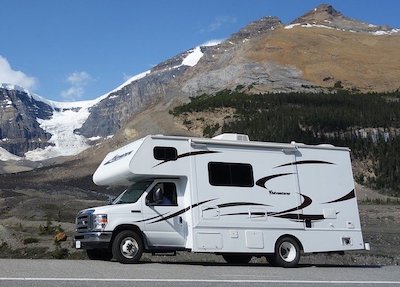
Outdoorsy is like Airbnb for RVs. It’s where RV owners rent out their RVs when they’re not using them.
If you’ve always wanted to try out a motorhome, or want to upgrade your long-term USA road trip with a cute Airstream, consider renting through Outdoorsy. Their customer service and reviews have outranked the other top RV rental companies. You can search listings by vehicle type and location. Some owners will even deliver the motorhome to your door! *Take $50 off your Outdoorsy rental with coupon code: intentional
Browse and book RVs, motorhomes, trailers, and campervans on Outdoorsy here
What to do about Health Insurance when traveling long-term
Healthcare.gov
Just like non-mobile Americans, one option if your income is not too high, is to use healthcare.gov to qualify for a discount on monthly healthcare premiums. When you select your healthcare plan, though, make sure you’ll be covered on the road and you understand the “out of area” coverage requirements. Not all plans will cover you when you’re out of state.
Telemedecine Savings Plan
A telemedecine savings plan gives you 24/7 access to physician and nurse consultations remotely as well as discounts on medications. Discounts on dental and hearing care can also be included in some plans. While this option does not replace your healthcare, it can be affordable way to get medical attention out of state. Plans start at $10 per month.
Healthshares
One alternative option for healthcare is a sharing ministry. Members of these groups pay in on a monthly basis and agree to assist other members with medical bills that arise. Monthly payments and deductibles are usually significantly lower than traditional healthcare, however, these programs come with other membership requirements. For more details check out Samaritan Ministries or Liberty HealthShare .
What is the best cell phone and data plan for USA travelers?
Even in the U.S., reliable and quick phone and data coverage is not always possible. If you plan to work online while traveling the States, free wifi hotspots may not cut it.
Our friend, Alyssa, says: “The only way to go for Internet on the road is Verizon. They by far have the best coverage and the best plans. Many full-timers use Verizon Unlimited data plans through a third party. The best place to start looking for internet solutions is with Chris & Cherie over at RV Mobile Internet .”
Check the Coverage? app to research whether your cell provider has coverage in your next stop, or to compare coverage areas of the major providers.
To track down free and paid public wifi anywhere in the world, try a Wifi Finder app . It can be used online or offline.
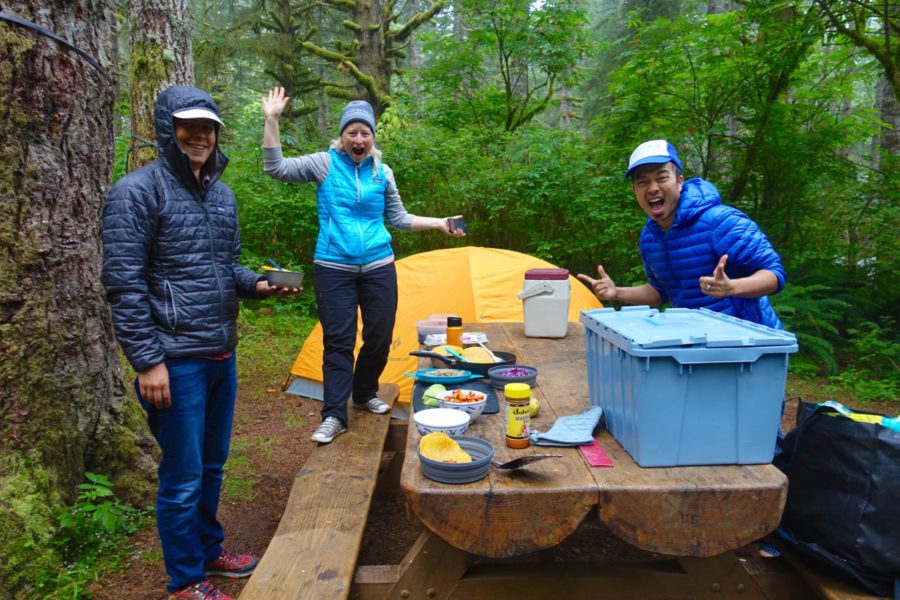
How to find free and cheap campsites in the U.S.
Federal Lands
In BLM (Bureau of Land Management) and U.S. Forest Service areas, you can camp for free within a certain distance of the roadside for up to 14 days. In RV communities, this practice is called dispersed camping or boondocking. Be prepared to rough it and practice “leave no trace behind.”
You can try the Public Lands app to find potential locations and the corresponding regulations for each area.
FreeCampsites.net
While not comprehensive, this site is a crowd-sourced map of free campsites around the nation.
Camp In My Garden
Here’s another option which doesn’t have a huge selection in the States, but can help you find cheap places to stay in peoples’ backyards . Facilities and pricing varies by homeowner.
Ultimate Campgrounds
This site provides an interactive map of public campgrounds in the U.S., though they’re not all free. They also have an app if you want the info on your smartphone.
The Campendium site lets you search for specific campground types and includes free sites, National Parks, National Forests, State Parks, and RV parks.
Harvest Hosts
Another way to camp for (almost) free is with Harvest Hosts . HH partners with farms, distilleries, wineries, and breweries across the country that have extra land or space for campers. Participating places allow you to camp on their property for free–usually for only one night–in exchange for your business. So typically you have a free place to stay for the cost of a bottle or two of wine. This is a great option if you want to get to know the locals in every place you visit. A HH membership costs less than $50 a year.
Parking Lots
If you just need a quick, free place in town to sleep overnight in your vehicle, then pull over in a Walmart, Cabela’s, truck stop, or rest stops. Full-timer RVers recommend calling the store manager or local police to check that overnight camping is allowed.
Passport America
If you’re planning to spend a lot of time at campsites around the country, Passport America offers 50% camping fees at participating campgrounds. The yearly fee for the membership is $44, but if you camp at just two of their locations, you’ll make your money back.
Alyssa says, “Hands down, this has been our best investment for saving money on camping.” (Disclosure: the Passport America link above is an affiliate link.)
What is full-time RVing?
Full-time RVing, or being a “fulltimer,” simply means you sleep all of your nights in an RV. It’s your house, your only home.
How do you get your mail when you’re a nomad?
When you live full time in an RV, most people use a mail forwarding service.
There are three states that are awesome about this: South Dakota, Florida, and Texas. Before you start RVing, you’ll want a permanent address in one of these places. This usually means setting up a “domicile,” a.k.a. becoming a resident of another state so you can use their RVing benefits. All of these states have great options for mail forwarding programs.
If you’re thinking about becoming a fulltimer, you can read this Technomadia article to learn more about this fascinating concept of getting your mail on the road .
Back to full-time RVing.
Now that you know you can get your mail across the country, here’s a little more about what full-time RVing looks like.
When you’re a fulltimer, you can:
- Live anywhere you want (for Heath and Alyssa, this has included beachfront of the Pacific Ocean, riverfront, lakefront, mountainside, on a volcano, on farms, in national forests, even New York City!)
- Work from anywhere
- Not be tied down to mortgages, bills, and the monotony of staying one place
- Meet new people
- Spend more time in nature
- Save a ton of money
- Basically do anything you want all the time
“All this could be summed up very succinctly: Full-timing is the BEST,” says Alyssa.
Who full-time RVs?
Alyssa and Heath have met adults as young as 21 and as old as their 70s traveling full-time across the country. They’ve seen families with infants and teenagers and more kids than you could ever imagine, living in an RV with all their stuff piled into a trailer, traveling together.
Why Should I Full-Time RV?
One word: freedom.
In the past few decades, the world has changed in a million different ways. But the most overwhelming way is this: we have choices that society has never had before.
Your grocery store doesn’t offer great avocados? There’s probably five others equidistant from your house. You don’t like Shell gas stations? You have a hundred other options. Nothing good on TV? Don’t worry, there’s only millions of tv shows and movies you can watch on cable or satellite or the Internet. You don’t want to work from an office? You can work from home or a co-working space or Starbucks or a bar with wifi or an RV on the coast (Alyssa’s done all of these). We have more options every day than we know what to do with. Living in an RV and traveling full time is just one of them.
And yet, everyone is living in a home with four walls and indoor plumbing. Across the board, most people live in what RVers call a “sticks and bricks” home. Which is great if you’re worried about tornadoes or if you want a stable, predictable future. But it’s not great if you want to get out and see the world and learn and grow and be a better person (all of which are side effects of full time travel).
I know what you’re probably thinking now:
What about work? How would I finance full time travel?
Money is the biggest hurdle people face when it comes to leaping into the full time travel lifestyle.
Surprisingly, for Heath and Alyssa, full timing opened a lot of doors for their business. Since moving into an RV, they’ve visited all 50 states, filmed a documentary, been on live national and international television, filmed a tv show, written books, published a course, and filmed a bunch of gigs across the country.
How to Make Money on the Road
Heath Padgett’s Resources
Our friend Heath is leading the way when it comes to full-time RVing as a young adult. His Make Money and RV Facebook group and RV Entrepreneur Podcast are excellent resources, even if you aren’t living out of an RV.
Digital Nomads
Just about anyone who makes their living online in a location independent way can travel the U.S. long-term. Check out this blog post to learn more about Digital Nomad living .
Help Exchange, WWOOF, Work Away
These three network sites hook you up with hosts around the world – and in the States – who will provide you room and board in exchange for various kinds of labor. Organic farming, nannying, hospitality, or web services are just a few of the ways you can get your foot in the door and save a lot of money. Here’s one example where we did Help Exchange at a chateau B&B in France.
Work and Travel Jobs
We wrote a post all about finding jobs in amazing places . Many are international, but plenty of the resources can be used in the U.S. as well!
Other Tools for Travel in the U.S.
The State Lines app will let you know about the variations in state laws and regulations so you’re not surprised every time you cross a state border.
Do you have tools to add? Tell us about it in the comments below!
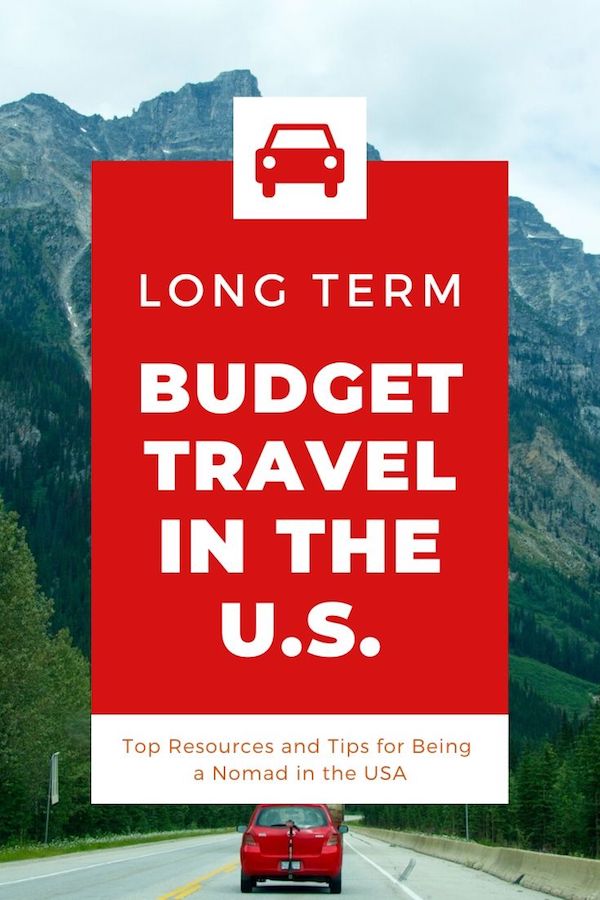
Similar Posts
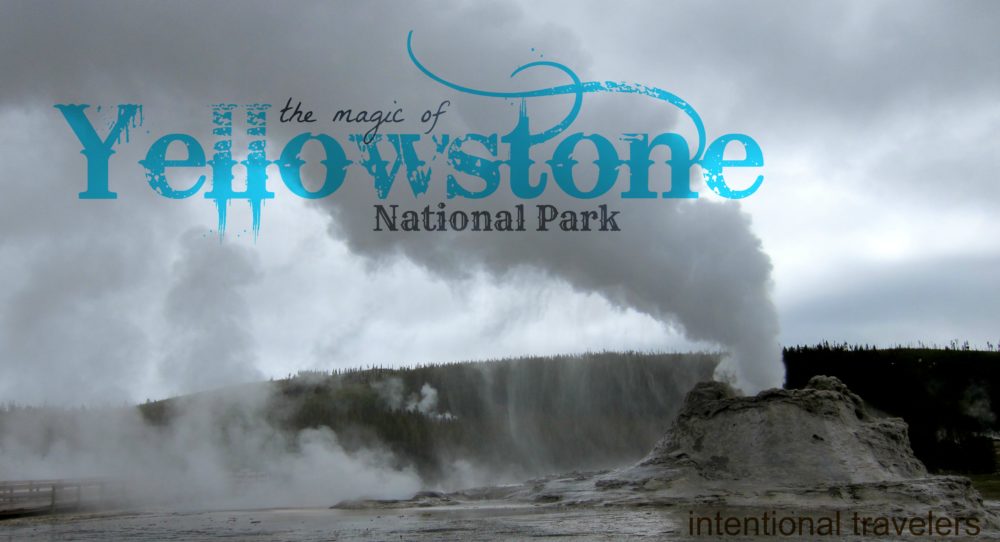
Yellowstone
Road Trip Yellowstone from Chamanson on Vimeo. Here’s a video montage of our times in the super volcano! We spent five days/four nights in a cute little budget cabin just steps from Old Faithful, and enjoyed a range of weather conditions from pleasantly sunny to blustery snow. Yellowstone is an unbelievable place with so many…

Best of Oahu: 5 Day Itinerary for First Time Visitors to Hawaii
If it’s your first time visiting Hawaii, then Oahu is one of the best places to get to know the beautiful state. We’ll help you plan the perfect trip with our Oahu 5 day itinerary. Oahu is the third largest of the Hawaiian islands and is home to state capital, Honolulu, where Jedd grew up….

Hawaiian language: what you should know before you go
If you’re traveling to Hawaii, it’s very useful to familiarize yourself with the pronunciation of the Hawaiian language and learn some Hawaiian phrases. It’s also fun! Hawaii is one of the most unique places to visit in the United States because of the native Hawaiian culture and how important it is to everyday life here. Even for Americans, visiting…
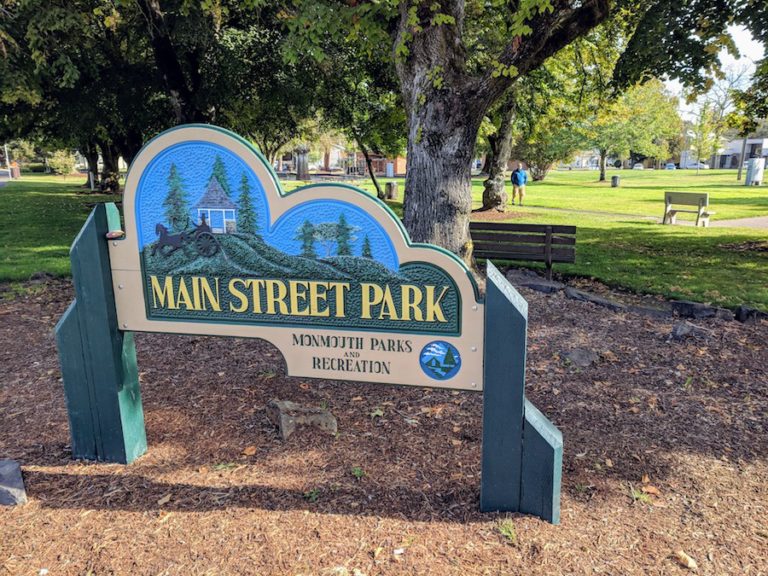
A Complete Guide to Visiting Independence and Monmouth, Oregon
Whether you’re exploring Oregon wine country or visiting someone at WOU, you might find yourself in the fine towns of Monmouth or Independence, Oregon. Since Monmouth has become our “home base” when we’re not traveling the world, we decided to do some research. What are the best things to do? What are the best restaurants…

7 day Croatia Road Trip Itinerary: Dalmatian Coast in Winter
This guide will help you plan the perfect Croatia road trip itinerary, especially if you’re visiting Croatia in winter. Jedd and I had the pleasure of living on the Dalmatian Coast for one month in late Fall, exploring from our home base of Zadar, Croatia. Then my parents joined us for a 10 day road…

How to Find Pet-Sitting and House-Sitting Gigs
Pet-sitting and house-sitting has been an important ingredient in our nomadic travel life. There are many benefits, including saving money on rent and allowing us to test out different living situations. If you’re curious about pet sitting or house sitting domestically or internationally, this post shares why it’s great for budget travel and how to…
Leave a Reply Cancel reply
Your email address will not be published. Required fields are marked *
This site uses Akismet to reduce spam. Learn how your comment data is processed .

Sign up to stay current on all my latest tips, tricks, photos, and lists.
Shop my Travel Essentials

Hey, I'm Ciara!
Wanna be pen pals.

10 Simple Ways To Travel With A Full-Time Job Or As A College Student
Think you don’t have time to travel? Think again.
I traveled to India, South Africa, and Panama as a full-time student
I traveled to Costa Rica, Puerto Rico, and San Fransico as a full-time worker and well…adult.
Travel has always been a major priority in my life, even before I ever left the country. I knew I wanted…..no, I knew I needed to see the world. I also knew I needed to study and work, so I became very strategic about finding time to travel.
Before quitting my job, people would question whether I actually worked – even my own coworkers despite seeing me on a daily basis. The truth is that I worked 40 hours like most people did. I was working with a measly two-week vacation limit just like everyone else. I was just VERY VERY VERY strategic about maximizing my time off.
So, don’t quit your day job(unless you really want to…like I did). Here are some ways to travel whether you’re a full-time worker or a college student.
1. CHANGE YOUR MINDSET
Studies show that employees are happier when they take vacations(DUH!) and have increased productivity when they return to work.
If travel is something you really want, you’ve gotta start prioritizing it! Save up your vacation days for a specific trip. Establish a plan and start saving now. Create a separate savings fund for a big trip to keep you motivated.
Finally, remember that you don’t have to quit your job to travel the world(unless you truly want to). Instead, change the way you view “vacation”. A 3-day vacation can be just as refreshing as a 2-week vacation. A domestic trip can be just as transformational as an international trip. Possibly reframe your idea of travel and how it could fit into your life.
RELATED: HOW TO MAKE TRAVEL A REALITY TODAY
2. EXTEND YOUR WEEKENDS
ALWAYS TRAVEL OVER THE WEEKEND! NEVER BREAK THIS RULE!
Whether it be Thursday through Sunday or Wednesday through Monday, weekend travel will help you save vacation days. Essentially, you’ll have 2 extra vacation days that you’d otherwise be using if you traveled throughout the week.
i.e. Instead of traveling Monday through Friday and using 5 vacation days, you can travel Thursday through Tuesday and use only 3 vacation days. Instead of traveling Monday through Friday, try traveling Friday through the next Sunday – this gives you 10 vacation days opposed to 5 using the same amount of time off, because you included the weekend before and after.
3. TAKE ADVANTAGE OF HOLIDAYS
Think of it like this: A Holiday = A FREE TRAVEL DAY
It may not seem like it, but one day can make a difference. Tag this onto a weekend trip and you’ve got yourself a three-day trip!
Tip: Avoid crowds by starting your day earlier
4. WORK FROM HOME
If you have the ability to work from home, you’re pretty lucky. Take advantage of your flexible work arrangement and work in a new city. It’s 2018, so you should have no problem finding wifi(or a Starbucks, if all else fails).
Use your free time explore when you get off, especially in the Spring and Summer when the days are longer. And of course, the time really adds up when you include weekends(See #1 again)!
5. STAY CLOSE TO HOME
You may have to hold off on far-flung destinations until you’ve racked up more time off. And, that’s okay! There are plenty of close destinations for you to visit. Knock those out first. You don’t want to waste half of your vacation in the air anyway!
There were some places that I really wanted to visit while working, but the flight duration wouldn’t have made sense. Instead of a 19-hour flight to Thailand, I took a 3.5-hour flight to Costa Rica.
6. TAKE SHORTER TRIPS
I understand the desire to really “get to know” a place but a 5-day trip will always be better than no trip. Squeeze the most you can out of the time that you DO have!
Instead of using a full week or 2 weeks vacation on one trip and having to wait such a long time to travel again, use a few days here & there to visit some locations that don’t require as much time. It may not seem like it but a 3-5 day vacation(with weekends included, of course) is sometimes all you need. You’ll get to take more breaks and you’ll still get a chance to visit some awesome places.
7. START EARLY
An early morning start will help you beat large crowds, and it literally doubles the time off that you do have. If you are on vacation and you wake up at 7 or 8 am instead of 11 am or 12 pm, you’ve added 4-5 hours of daylight back into to your day.
8. TAKE ADVANTAGE OF TRAVEL OPPORTUNITIES AT WORK
If you work as a consultant or a company that allows you to travel for various events, you should try to make use of the trip that you’re taking. If you happen to have a Wednesday – Friday conference, consider asking your manager to arrange your return flight to leave on Sunday instead of Friday especially if it is at no additional cost to the company. You can then spend the weekend exploring at no additional cost using no additional days off. And even if you can’t choose your flight days, you can spend your evenings exploring the city that you’re in if you plan accordingly.
9. USE VACATION DAYS WISELY
Every vacation day is precious when you love to travel. Did you know that most people never use their vacation days? USE YOUR VACATION DAYS and use them wisely. Do you hear me?
Instead of taking a day off to spend watching Netflix, playing video games, or just because you feel like it, save that day off for a trip! If you have a doctor’s appointment you can arrange it early in the morning and return to work or you can arrange it later in the day instead of taking that full day off. It may not seem like much, but you only have so much time off and each day adds up. Why use a day off doing things that could be done in the evenings or on the weekend?
Dear college students: You’ve got all the time in the world. With winter, summer, and spring breaks, you have plenty of time to travel. You’ve got time AND scholarships. Heck, you can even do a semester or year abroad(and you should). If you do have to work and/or take summer classes during those free months, you can still apply each of these.
RELATED: 5 REASONS YOU NEED TO STUDY ABROAD
10. GO SOLO
If you wait for people to join you, you’ll be waiting forever. Seriously, unless you’ve hit the jackpot with a travel-obsessed friend, you’ll be waiting forever. It’s difficult to align schedules and budgets, so you should consider traveling solo! It just might change your life like it did mine.
RELATED : WHAT I GAINED FROM MY FIRST SOLO TRIP ABROAD
Combine all of these tips at once, and you’ve got yourself a vacation. It is definitely possible to travel with a full-time job or as a student. These tips will ensure that you are getting the most value out of your limited time off as you slowly(but surely) travel the world. You should spend your time off however you want because it’s precious and you only get so much of it. However, if you truly want to travel and you’re wondering how you can find the time to do it, you’ve gotta start getting strategic about it!
You Might Also Enjoy:
Travel Blog

PIN ME! ⇣⇣⇣
Sharing is caring if you found this helpful, sharing or pinning is one of the greatest ways you can show support thank you.
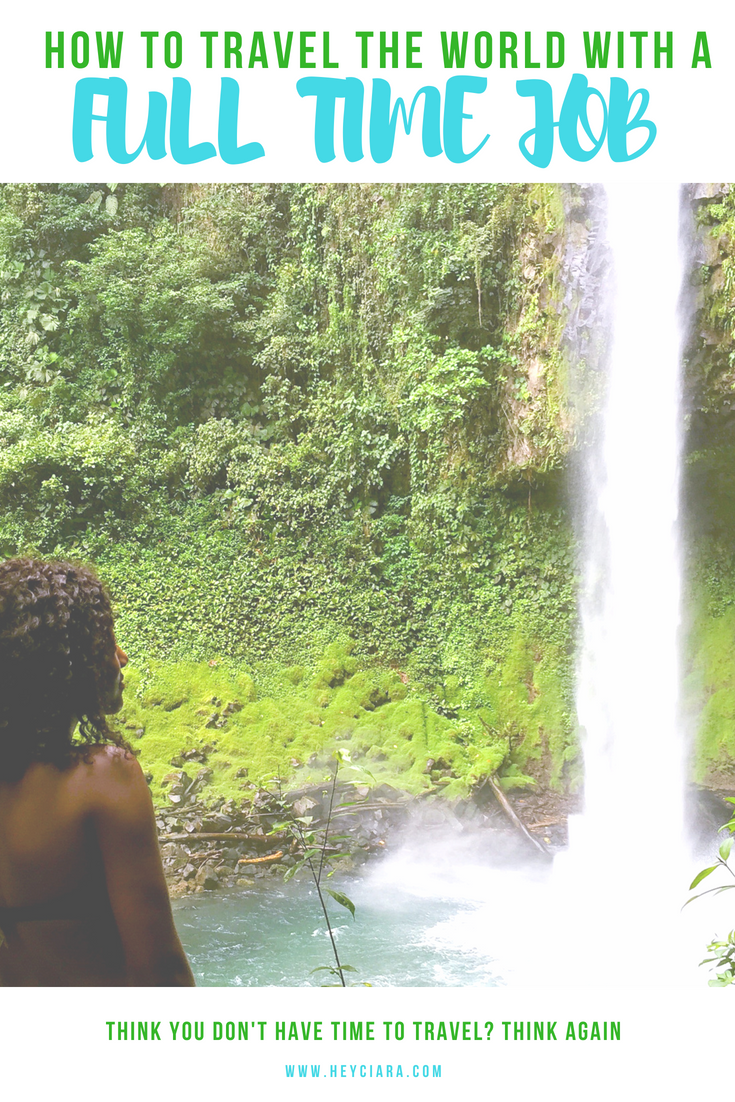
How do you find time to travel with a job or as a student? And where are you headed next? Share in the comments below!
If you know someone who might need a vacation, share this post with them!
Relevant posts:

Hey, I'm Ciara. I’m a global citizen and lover of travel. Want to know more?
Things you need to know before visiting Tulum

25 TIPS TO STAY SAFE AS A SOLO FEMALE
WANNA BE PEN PALS?

Back to top
Explore .

The Ultimate Travel Book
Travel is one of the greatest gifts i’ve ever given myself and i want to pay it forward by making sure that others get to feel that magic for themselves. if you’re a long-time follower and/or friend of hey ciara, then you know that you’re in for a treat. this is a comprehensive and cohesive guide that provides actionable steps to help you get out into the world., coming soon..., get notified.

Get my packing list
Get the ultimate packing list to make sure you’ve got all the essentials. it’s been 7 years in the making so i’m confident it won’t lead you astray., don't know what to bring, send it to me, © heyciara 2023 created with @juneaye.

LET'S CONNECT ON INSTAGRAM! @HEY_CIARA
- Skip to primary navigation
- Skip to main content
- Skip to primary sidebar
- Skip to footer
Journey With Confidence
What No One Tells You About Living In An RV Full Time

What I Wish I Knew Before Full-Time RVing
Traveling in an RV full time is a lifelong dream for thousands of people, and it is a decision that can change your life and your perspective, but it’s not just one long vacation.
There are issues that can make this experience more fun or less enjoyable, so I want to share what no one tells you about living in an RV full time before you start on this journey.
Size matters
One of the most important decisions you’ll need to make when becoming full time RVers is what type and size of RV will meet your needs, and bigger is not always better.
In the five years that we have been full time RVers, and in the 20+ years as active weekend warriors before that, we’ve met dozens of full time RVers who regretted their RV choice, and that decision impacted every aspect of their full time RV adventure.
RVs that were too big
Some of these folks went to RV shows where massive fifth wheel toy hauler trailers were all set up with their dropdown back and side patios, open kitchen with a freestanding island, and lots of extra play space for the kids and pets in the back. These models were all on display, beckoning the would-be full timer to imagine how much fun they could have in these huge RVs.
We met a couple who got sucked into this illusion, but they had never even camped in an RV before they bought a 45-foot fifth wheel trailer. They quickly learned the stress of towing it, backing it, and setting it up in a campground. They remembered how tall it was, and that had already resulted in two accidents that damaged their new RV.
This couple was a nervous wreck. They had sold their house and everything in it to begin this new adventure, and they were absolutely miserable. They deeply regretted their decision and were not coping with the stress of their new lifestyle. Perhaps they might have been happier with an RV that was smaller and more manageable. After all, did a couple with no kids or pets really need an RV that large?
Another couple’s trailer was so large they refused to tow it themselves, so they hired a towing company to move it from one campground to another. They loved all the extra space, but it was extremely limiting to the spontaneity and adventure of being full time RVers.
Additionally, we met a couple with three children who bought the largest RV they could afford to give their children plenty of space for schoolwork and activities, but they quickly learned they didn’t need that much space, and their large RV was difficult to fit into many state parks and even some private campgrounds.
RVs that were too small
On the flip side of the size issue is an RV that is too small to meet your needs. Again, we have encountered many people who thought a small RV would be the perfect fit for their full time adventure, only to realize after buying one that the sink was too small to even wash the dog bowl, there wasn’t enough storage space for their gear, the space in the refrigerator was very limiting, the holding tanks were so small they could only boondock for a day or so, and not having an onboard shower required some creative outdoor gear and adaptations.
Certainly, smaller RVs are lightweight and nimble and can go almost anywhere a car or truck can go. They fit into almost any campsite, which makes them a very attractive option. Most of the smaller RVs provide a great base camp for an outdoor camping lifestyle, which is great until you discover that the weather conditions in many parts of the country are not conducive to an outdoor lifestyle.
Be prepared for winter weather
As full time RVers, you’re going to be living in your RV year-round, which will include all the winter months. We full-timed in Oregon for several winters and met numerous other full time RVers struggling to find shelter from Oregon’s constant winter rain.
One Canadian couple was full-timing in a teardrop trailer; another single man was using a pop-up Alpine trailer; a single woman and her dog were in a brand new van conversion; and another couple and their two dogs were in a very small Class B+ motorhome.
Oregon winters are not compatible with an outdoor lifestyle, and the people who were camping in these very small RVs had little to no room to move around, cook, recreate, or even shower without walking a few hundred yards through the rain to the public restrooms.
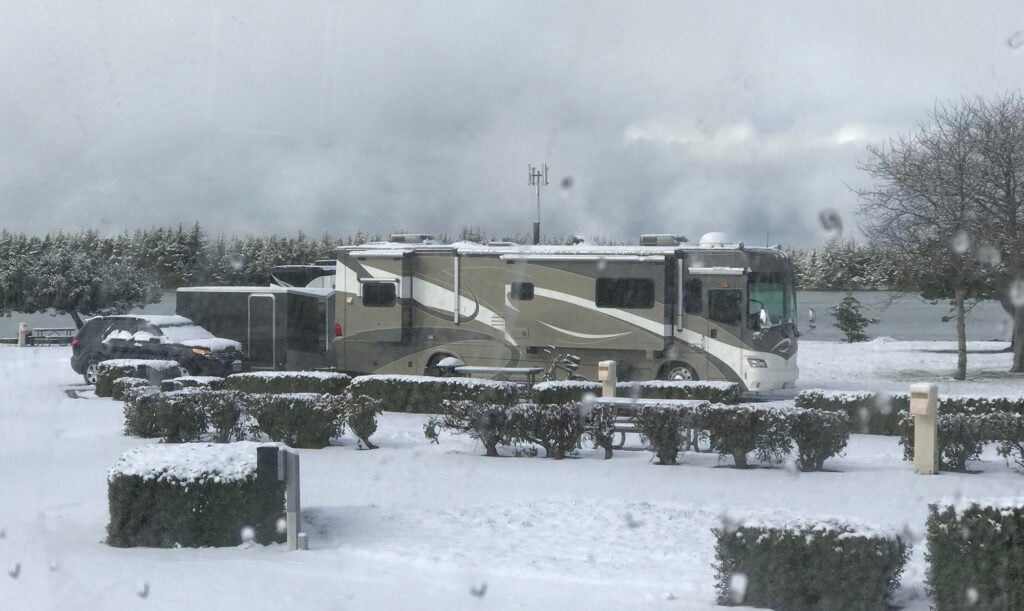
Try renting an RV first
Therefore, for new full time RVers, the first and most important consideration is to fully understand what size and style of RV will really meet your needs. The best way to do that is to rent a few different types of RVs and then go camping in them to see how they fit.
Don’t be in a rush to buy the biggest or smallest RV before you consider the pros and cons of each option. Take your time to explore all the features, benefits, and limitations of each type and size of RV. Know where you think you want to travel and what your objectives are, then spend time talking to current RVers to learn from their experiences.
Do you just want to live in an RV to save some money, or do you want to be continuous travelers on an extended adventure of discovery? How do you want to use your RV, who will be using it, where do you want to travel, how long will you be full-timing, and what is your exit plan? These are all important upfront considerations that will help you find the right RV for your full time RV lifestyle.
Uncertainty can be stressful
Another thing people don’t think about when they’re considering a full time RV adventure is that uncertainty can cause a lot of stress. When you’re in a daily routine, you follow familiar patterns. You shop in the same places, take the same route to and from work, know your neighbors, have favorite restaurants, and basically do the same things without really thinking about it. This routine may become monotonous, but at least it’s familiar.
But when you’re a full-time RV, everything is new and uncertain. This may be one of the allures of becoming a full-time RVer, but most people don’t appreciate just how pervasive this uncertainty can be. You have to think about everything and plan ahead, like where and when you will be traveling , how are you going to get there, and what weather or climate issues will you encounter.
Even after doing all this planning, you still have no idea what you may encounter when you arrive at a new destination. Even stopping for gas or diesel can be a stressful and frustrating experience.
Plan your travel days ahead of time
We often try to drive ahead in our tow car to our next destination to make sure the road is suitable for our 38-foot motorhome. We scout the road, gas stations, campgrounds, overpasses, tunnels, and any other travel hazards so we can reduce the stress of the uncertainty.
On several of these scouting trips, we have discovered roads that simply were too narrow or too long to justify the trip, or we discovered that the internet description of the campground where we had made reservations was completely false, and the campground was just not a good fit for us or our RV.
Another stressful uncertainty of full time RVing is the weather. Many full time RVers report this as their biggest concern. Snow, ice, hail, wind, lightning, hurricanes, and tornadoes are all potential dangers if you live in an RV.
You might think that being in a house on wheels would allow you to avoid dangerous weather conditions, but in many of these devastating storms, you do not have time to get away from the hazard, nor do you know which way to go to avoid it.
Lightning can cause a forest fire to surround you, and there’s no way to predict where a tornado will touch down. In one case, we had less than 15 minutes warning that we were in the direct path of a damaging hailstorm. Fortunately, it slipped past us just beyond the campground, but even with the biggest hail missing the RVs, it sounded like we were in a war zone, as thousands of smaller hail stones slammed into the windows and roof.

Disconnected from community, friends, and family
Many new RV adventurers underestimate how they will be affected by being disconnected from their communities. We are, after all, social beings, and we rely on family, friends, churches, clubs, organizations, teams, and loose affiliations to help us feel grounded and mentally well.
When you start a full-time adventure, you trade the familiar in for the unfamiliar, and many full time RVers express frustration with the superficial interactions between RVers that are common in this lifestyle. You may actually get to know some other RVers, and you may even choose to travel with a group, but sooner or later the rally will break up, and either you or they will be onto another destination.
Of course, you can keep in touch with family and friends via social media and technology, but it’s not the same as bowling with your team or playing gin with your usual group of friends. Holidays, family events, birthdays, big occasions, and celebrations, plus all the small routine visits from the kids and grandkids are no longer part of your routine. Being home sick may be a much bigger problem than you ever anticipate when you start on your full time RV adventure.
Full time RVing can be surprisingly expensive
Lastly, what no one tells you about living in an RV full time is that it may be more expensive than you originally thought. This may not be true for everyone, but our personal experience is that it is significantly more expensive.
You try to anticipate your costs, RV insurance , car/truck payments, fuel expenses, park fees, groceries, pet food and supplies, supplies for the RV, maintenance costs, emergency costs, etc. But for some reason, all these things may cost more than you anticipated.
Then there’s the admission fees to parks, museums, attractions, dining experiences, and sightseeing opportunities. It all adds up.
When we first started our full time adventure, we met a couple who had already been full timing for about three years, and we discussed the issue of the budget. They told us that their goal was to stay as close to $100 per day as possible with a monthly budget of $3000. At the time, we thought that was a little extreme because our budget indicated monthly expenses less than that.
We were wrong! Now after having spent over five years on the road as full time travelers, we have discovered that their goal of a $100 a day would be a huge victory for us because our average monthly expenses are closer to $5,000. Every month, we record all of our expenses, and we analyze these costs to see if we can economize anywhere, but we’re never able to shave much off the bottom line.
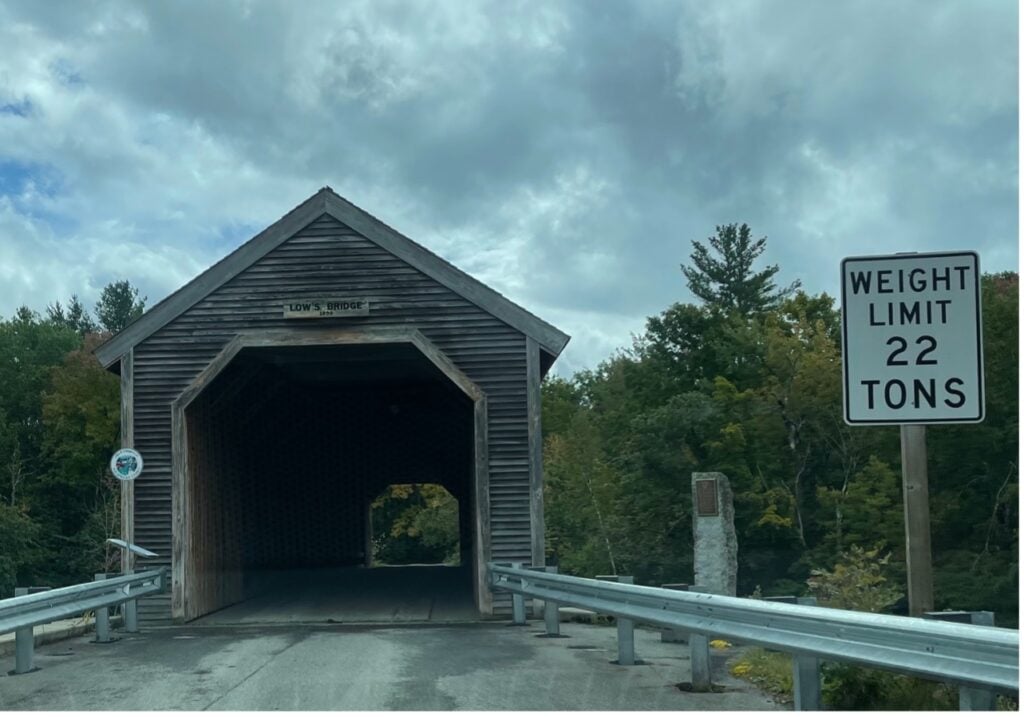
Be prepared to budget
We spend more on technology than most people, but we work from our RV and need reliable connectivity. We started our journey with several dogs (now we’re down to two), and we refuse to economize on their food and supplies, so we continue to economize and dream of getting down to $100 a day.
To be completely transparent, it’s worth mentioning that we do not have a car payment, motorhome payment, or an extended warranty. We have had a couple of significant RV maintenance bills, and two expensive dog health procedures that impacted our budget, but those are the types of emergencies you have to plan for when you are thinking of becoming full-time RVers.
Another relevant fact is that we do not like to boondock or camp in rustic campgrounds without electricity, sewer, and water. Our RV is set up for boondocking, but we just prefer full service campgrounds.
When you add up the fees for camping for 365 days a year, it will have a significant impact on your budget. We know many campers and full-timer RVers who only use full service campgrounds, for a few days a month, and I believe they might be able to hit the $100 daily goal more easily. Some other campers, only use membership campgrounds like Thousand Trails , and that will also lower your monthly costs. These are all personal decisions and only you know what will work for you.
Get tips from other full time RVers
One of the best parts about RVing is engaging with the community of traveling enthusiasts. iRV2 forums allow folks to chat with other RVers online, and get other perspectives on everything RVing, including products, destinations, RV mods, and more.
Related articles:
- The Dirty Truth Of Full Time RVing
- 10 Common Myths About Full-Time RVing
Full-Time Travel: 12 Essential Things You Need To Know
Full-time travel is a dream for many. I remember my first ever backpacking trip, even though it was several months long, I knew it would have to come to an end at some point, and I was always in awe of the people I met on the road who had cracked the code, and were traveling full-time.
On that trip, I met Kelli, and today, we have been traveling full-time together for five years, without plans to stop any time soon. We never decided to travel full-time, we simply set off on one trip that turned into another and another and another. We have traveled to over 80 countries, we have traveled by foot, bus, train, plane, three converted vans and most recently our sailboat Whisper .
Over those five years, we have learned a lot and it has been an incredibly special period in our lives. It probably comes as no surprise that we strongly recommend full-time or at least indefinite travel for everyone at least once in their life. The good news is, the dream of traveling full-time has never been more within reach.
Here are 10 things you need to know about full-time travel in 2023.
Why Travel Full-Time?
For us, there are many advantages to traveling full-time. Beyond the general benefits of travel such as broadening your perspective, improving communication skills, and exposing yourself to new cultures, people, and ideas there are some additional upsides that come with full-time travel.
Traveling full time affords us a sense of freedom we weren’t able to find living in one place and working 9 – 5 in traditional jobs. The ability to chart a course and set off to a new destination any day of the week or to pick a new country to visit next month is extremely liberating.
You can save money (if you can continue to earn money). While travel is generally considered an expensive pastime. Traveling full-time is surprisingly inexpensive when compared to living in one place and traveling occasionally. Expenses such as rent or mortgage, car payments, home maintenance, and household goods, can be deleted or significantly reduced. The expense of long return flights, short hotel accommodations, and vehicle rental is mitigated when you can travel slowly and flexibly. Traveling in a variety of countries including those with lower costs of living than your home country also brings down the average costs of living and traveling.
The opportunity to travel slower and to stay in a region longer offers an even deeper travel experience. Full-time travel allows us the time to learn a little of the language, meet locals and go beyond the tourist attractions and hopefully understand more about everyday life in a new place. Of course, a full-time traveler is still an outsider looking in, but if you use the opportunity full-time travel provides to go a little deeper then your travel experience can be even more rewarding.
Another benefit of traveling full-time is the opportunity to create income from travel. We have done so by creating a blog and a vlog, others use social media or their cameras to create travel content for profit.
When is the Perfect Time to Start traveling?
Is 30 too late to travel the world? Is 18 too young? What about 50? Truthfully there is no perfect age nor a perfect moment in life to start traveling.
One of the hardest things about setting off for any sort of long-form travel is that it is never really the right time. You are due for that promotion at work, your second cousin might be getting married next year, and you’ve just struck up an unlikely friendship with the cat next door.
To achieve your dream you will always need to sacrifice, and big dreams require a big sacrifice. You will need to leave everything behind. If you want to travel full-time, work out how much time you need to get your affairs in order, and save enough money to begin your journey, circle a date in the calendar, and start working toward your dream, today.
What’s the Difference Between Full-Time Travel and Other Travel?
Full time-travel is a lot different from a holiday, extended business trip or even that month-long Contiki bus tour you took through Eastern Europe at eighteen. Full-time travel requires planning, hard work, and discipline.
A sustainable approach to full-time travel requires careful planning. From researching destinations, working out schedules, and budgeting you will need to be thoroughly prepared. While a holiday doesn’t necessarily require such careful planning full-time travel requires things like long-term visas, understanding foreign tax obligations, and researching internet speeds in far-flung locales.
While traveling is often considered a relaxing and rejuvenating experience, full-time travel is often not. For many, if not most, people planning to travel full-time, income is required. This means on top of planning, traveling, and experiencing new places, you will need to juggle a job, something that is more difficult when you are on the move. In addition to managing your workload, challenges like finding suitable working environments with reliable wifi connections, and dealing with everchanging timezones can be both stressful and time-consuming.
A holiday or even extended travel has an end date which means we can indulge ourselves without restriction. We can blow the budget, eat unhealthy food, skip exercising, or drink too much, safe in the knowledge that our wallets and waistlines will eventually recover. Without an end date, full-time travel would quickly become a full-time nightmare if we took this same attitude. But without a set schedule or routine full-time travel requires discipline to remind ourselves that despite the scenes outside our window, or the thrill of waking up somewhere new, we are, in fact, not on holiday.
Despite these very real challenges, if you can handle them there is no doubt that full-time travel offers a level of freedom and excitement that is hard to match with a more traditional lifestyle.
Can Full-Travel Lead to Burnout?
Yes. For all the reasons mentioned above, full-time travel can be exhausting. Travel fatigue is real and the stresses of working and traveling at the same time can quickly become overwhelming. As a full-time traveler, it is important to be in touch with your stress level and take proactive measures when things get too much. When you begin to feel travel fatigue it is vital that you pause and take care of your needs and rest. Slow down and travel more slowly, take some time off work, or just check into a nice hotel and sleep for a weekend. But take time to take care of yourself.
Does Traveling Full-Time Put Pressure On a Relationship?
If you travel with a partner it can definitely put pressure on your relationship. Spending life traveling with your one and only sounds pretty romantic and it can be but there are definitely downsides.
Traveling full-time with your partner can add stress to your relationship and without any other outlet this can lead to conflict. It can also affect the romance and intimacy in a relationship. Another negative outcome of traveling full-time with your significant other is co-dependency.
Partners who decide to take the plunge together and travel full-time need to be aware of these pitfalls and have strategies to avoid them.
For more insight into the challenges of traveling full-time together check out these 25 Lessons we learned about living on the road as a couple .
Is Full-Time Travel Isolating?
On our first van life journey together we imagined pulling up in a new spot every night, making friends with other van lifers around a campfire. It rarely happened. And even if you do travel in a way that exposes you to lots of new friends, such as backpacking and staying in rowdy hostels, the intensity and brevity of these connections often exacerbate burnout and can rarely replace the deep long-lasting relationships of family and old friends.
Whether you are traveling by yourself, with your partner, or even with your family, full-time travel can be isolating. Feelings of isolation, of FOMO, and of being ‘left behind’ as our loved ones enter new phases of life without us are frequent on the road and can definitely create a sense of loneliness.
As a full-time traveler, you will need to work extra hard to maintain important relationships far from home.
Despite this, we have found it is possible to maintain important relationships if we put in the work. With today’s technology, it has never been easier to stay in touch with loved ones through messages, video calls, and social media.
Is Travelling Full-Time Dangerous or Scary?
Traveling has, at times, made me feel very scared, sometimes with good reason.
Scary moments that stick out to me, are getting lost in the jungle in Peru, Kelli getting incredibly sick while traveling through a dangerous part of Colombia, Our van being broken into while we were sleeping in it in Mexico, Kelli almost stepping on a dangerous snake in the middle of outback Australia, running out of fuel for our boat 50 kilometers from our final destination in Albania, not being able to find our accommodation in -25 in Kazakhstan in the middle of winter and a hundred other experiences that have felt incredibly scary, especially at the time.
Depending on where you go, completely avoiding dangerous and scary situations while traveling is probably not realistic however minimizing them is possible through proper research, preparation, and common sense. Research your destination and the known risks. Prepare properly to mitigate those risks. Take proper
While traveling full-time will undoubtedly open you up to a variety of new experiences, remember that they won’t always be experiences you necessarily wanted.
Can You Make A Living Traveling Full-Time?
Yes, there is a variety of jobs to fit any type of traveler that can allow you to make a living while traveling full-time.
There are traditional travel jobs like working on a cruise ship or as a flight attendant, becoming a traveling nurse or therapist, an artisan selling their crafts at different markets, or a busker ready to set up on a new street corner each day.
There is also a range of freelance opportunities for those working in the digital space. For people with skills (or those willing to acquire them) in fields like graphic design, video editing, programming, photography, website creation, music, and many other areas where the product can be delivered online, becoming a digital nomad is a real possibility.
Finally, there are more and more opportunities to take roles that until recently only existed onsite and do them remotely. Forward-thinking businesses are increasingly looking to employ remote workers to fill many professional positions. Raising the question …
Is It Possible to Travel and Work Remotely At My Existing Job?
For many, yes! Lots of roles are now able to be done fully remotely.
The age of the digital nomad fully underway providing many freelancers and business owners with the opportunity to deliver their products and services online. Additionally, we are now witnessing the dawn of the corporate nomad , where many companies are allowing employees to carry out their jobs remotely.
In 2019, there were around 15 million remote workers today that number is estimated to be over 45 million. The growth of the nomadic workforce has been exponential, and some sources predict that there will be over 1 billion digital nomads within the next 12 years. The next thing that needs to happen is for governments to react to the implications that this interconnected world, with citizens, spread out across the world.
When we set out to travel full-time Corona was still a beer and finding remote work with reasonable pay was considered a pie-in-the-sky dream.
No one wanted their accountant working from the Amazon jungle, and rightly so, the wi-fi is awful. Nevertheless, we battled through and were able to find enough clients as freelancers to keep us going.
Fast forward to 2023 and the amount of companies willing to let their employees work remotely is growing rapidly. There has never been a better time to take your existing job on the road or transition into a job you can do remotely.
Covid forced a workforce into remote work and the tech followed. We now have incredible tools at our disposal to conduct our jobs from afar. Sophisticated programs to host virtual meetings, rapid advancement of cloud share technology to promote online collaboration, and star link mobile satellite internet for less than $150 a month are all examples of how far the world of remote work has come in just a few short years.
The speed of development of solutions for an increasingly location-independent workforce has been awe-inspiring and we don’t expect this trend to reverse any time soon.
Are There Downsides to Working Remotely While Traveling Full-Time?
There are a number of downsides to working while traveling. Staying connected is often difficult, working in different timezones can be tough to deal with, and remaining visible to your staff, colleagues or managers can be challenging.
Full-time travel means being constantly on the move and trying to ensure a constant and reliable internet connection to dial into meetings or upload work comes with challenges. Nevertheless, internet technology is improving rapidly, and in many places, mobile internet is now sufficient to carry out many jobs. For those whose jobs require access to high-bandwidth internet, we are seeing that the availability is increasing and the price is dropping.
Another downside to traveling and working at the same time is juggling time zones, if you have an employer or clients in one location, then making yourself available to them at a convenient time may require some flexibility in your timetable.
Do Remote Workers Negatively Impact the Communities They Visit?
The rapid rise of an untethered workforce is not without its challenges. We are already seeing the effects of mass migration to certain destinations like Mexico City and Lisbon where an influx of cashed-up remote workers is driving up prices of real estate, and retail and displacing locals, negatively impacting their quality of life.
As a full-time traveler, especially if you are privileged enough to have a job that puts you in the top percentiles of global wealth then you have a responsibility to travel ethically. That means understanding the impact that you and your fellow nomads may be having on the areas you visit. We know to tread lightly when we visit a national park, we need to learn how to tread lightly when we travel to regions long term and think about how we can have a positive contribution to the places we visit without displacing or otherwise impacting local communities.
Hopefully, you found some interesting information about the realities of full-time travel! Did you find something you hadn’t thought of? Did we miss something you’ve discovered traveling full-time? Do you have a question about traveling full-time? Let us know below!
LOOKING FOR MORE Lifestyle Content?
- Life as a Corporate Nomad: Everything You Wanted to Know
- Van Life Apps: 25+ Easy Ways To Simplify Life On The Road
- Van Life or Boat Life? Which Is the Best
- 9 Things to Know for Working from the Road
Want to save this van life couple wisdom for later? Pin it!
In 2016, recently single, without a job, and an expiring lease I took off on my first solo backpacking trip, with a one-way ticket to Bangkok and a well-thumbed Lonely Planet guide. From there I wandered Southeast and Central Asia, traveled the Great Steppe, and made my way across Russia and throughout Europe.
Along the way I met Kelli, who, despite having a less frantic travel style, shared my my restless spirit and passion for exploration. Together, we embarked on a new journey, van life. Over four years we travelled across three different continents with three different vans.
In 2022, as the world began to re-open post COVID we took an opportunity to realise a long held dream, to live aboard a sailboat. Since then we have spent two summers in the Mediterranean, sailing and living aboard our little sail boat Whisper. When we aren't sailing we continue to live our nomadic lifestyle, guided by a philosophy of slow travel and self directed adventure be it by van or backpacking.
We find excitement through our journey into the unknown, stillness and content in the beauty of the places we discover and we find ourselves in the vastness of our world.
Hopefully, we can help you find what you're looking for too. Get lost with us and find your own path.
Leave a Reply Cancel reply
Your email address will not be published. Required fields are marked *

5 THINGS NO ONE WANTS TO TELL YOU ABOUT BEING A FULL-TIME TRAVEL FAMILY

Post Summary: 5 not so pretty truths about being a full-time travel family.
Have you ever dreamed about leaving it all and traveling the world full time with your kids? Perhaps on your lunch break during your daily Instagram scroll, you get swept away by a family on safari in Zimbabwe or a hippie couple living out of their camper van with sun-kissed babies gleefully running naked on the beach. Surely, they must be living the dream. You start doing google searches for “how to travel the world… when I have no money.” Or maybe yours is more like, “can I travel full time with my kids… and not kill them?” You begin to concoct elaborate fantasies on how said dream could come to fruition. You look up how much you can get for your 2002 Kia. Not much you guys, not much at all.
Your travel dreams are crushed, and you go back to work, silently hating your coworker who brings tuna sandwiches to work every day.
That was me. No tuna sandwich hatred, but I did look up how much I could get for my 2008 Mazda 3. Rather than go back to work though, my husband and I ended up quitting our jobs and selling almost everything we had so our family could travel the US together. Now, that’s an incredibly short summation of a long and difficult choice we made when our backs were against the wall with financial debt. But all in all, we are a family that sold everything to travel for a year with our two-year-old son. You can read more about our full story here .
Is traveling the US everything we thought it would be? Yes! And no.
As a full-time travel family, I’m here to tell you there’s more to that perfectly edited photo you see on Instagram. A lot more. We all know that those heavily filtered photos aren’t the full picture, and yet we still see them and think, “their life must be perfect.”
Here are our five not so picture-perfect truths about traveling full time with our toddler.

You’re never really on vacation
I will be the first to say that traveling with a 2-year-old isn’t easy. I get a lot of people who ask me what it’s like to be on vacation all the time. I always pause and consider if this person is able to take in the information that you’re never “on vacation” when your kids are around. I often get this blank stare that tells me this person has no idea about the realities of parenting. It’s okay, I had that same blank stare as well.
Denial helps the species continue.
In all honesty, many family travel bloggers try to sell full-time family travel as the be all end all, but let’s face it, kids in all their glory are a lot of work. Traveling doesn’t change that. They are still emotionally volatile, vibrant creatures that require your attention and care 24/7. The only difference when you’re traveling full time is now you’re doing all of those fundamental parenting roles, but on the road with all your stuff jammed into a suitcase.
We travel with a strong-willed two-year-old, so I’m sure it’s different depending on the age and temperament of your child. We are dealing with potty training woes, nap schedules, sensitive sleep rhythms, and the all-consuming temper tantrums that seem to defy logic, space, and time. I’ve heard the sweet spot for traveling with kids is around 8-10 years old, but I’m sure there’s someone who would say otherwise.
What I’m trying to say is, the woes of parenting never stop, even if you’re on a glorious year-long trek across the US. You may think you will be less stressed because the burden of work will have been lifted, but rest assured, your kids will find a way to stress you out. It’s practically their birthright.
View this post on Instagram A post shared by Christina + Bradford (@liveawilderlife) on Dec 28, 2018 at 1:26pm PST
Your kids may not think it’s as awesome as you do
You think, this is so cool we’re going to Great Smoky National Park and maybe we’ll see some wild elk and black bears! Meanwhile, they’re like…can I just stay home and play Pokemon?
Our son definitely leans towards adventure and doing new things, but that being said, there have been many times on our journey where it was obvious he just wanted to stay home and play with his toys. The only people who wanted to hike a new mountain were his adventure-loving parents.
Kids are funny that way. You should be prepared that they might not think your epic family gap year in an RV is that cool. I can remember being 16 years old and being gifted with an incredible opportunity to go to Paris with my French cousin. I got to experience Paris with a fluent speaker who knew the ins and outs of this illustrious city. You guys, I refused to eat anything but hot dogs the entire time. Like I said, kids are funny that way. They’re just beginning to figure out this whole humanity thing, and their priorities aren’t always centered around experiencing different things and seeing this great big world. In fact, many kids (unconsciously) crave structure, familiarity, and the comfort of their social circles.
And while our son was too young to verbally communicate what he was experiencing, it became clear when his sleep patterns became highly irregular and he stopped sleeping well at night, that he was having trouble adjusting to the “new normal.” Overall, we worked through it, but it definitely took a lot of sleepless nights to figure out how to help our son adjust to full-time travel life.
View this post on Instagram A post shared by Christina + Bradford (@liveawilderlife) on Jan 30, 2020 at 10:32am PST
You Start To Crave Normalcy
When you bounce around from city to city and live in 10 different Airbnb’s in a month, you start to crave a feeling of “normal life.” All of a sudden, going to the gym seems like the most AH-Mazing luxury. Instead of visiting a national park, you begin to want a day of binge-watching Homeland.
My hunch is that this is more true for parents who travel full time than those who travel full time without tiny humans. I’m sure those who solo travel or with a travel companion feel it a little bit, but there’s something about traveling with kids and the constant planning of:
-Do we have enough food, snacks, and water for the tiny human so he doesn’t fall off the deep end and become hangry? -Are we getting enough physical activity during the day so that the tiny human will go to sleep at night? Please God, make him go to sleep. -Have we packed enough diapers, wipes, extra clothes, a travel stroller, and various toys for all possible scenarios and outcomes to the day?
You start to feel like, screw it, let’s just stay in.
We quickly learned that when traveling full time, you have to learn how to weave in “normal” days where there’s no plan or outing. Just a day to veg out and do nothing.
View this post on Instagram A post shared by Christina + Bradford (@liveawilderlife) on May 14, 2019 at 11:46am PDT
Your Life Becomes Child Centric
Before I became a mom, I envisioned I would be the kind of parent touted in bestseller books like “Bringing Up Bebe” where I would give birth and go about living my fabulous life. My life wasn’t going to stop just because I had a baby. I would simply bring my well-behaved baby everywhere I go. Dinner with a friend? Bring him with me! Surprise pop up concert in L.A? Strap some headsets on and bring him with me! An hour-long drive to the beach for some fun in the sun? Sure! He’ll love the drive. Bring him with me!
Oh man, I had no idea there was an 18 wheeler semi-truck called motherhood coming straight for me.
Traveling full time means you are stripping away and leaving a community of friends and family who can help to alleviate the stresses of parenting. You can’t call a friend or babysitter to watch your kids for a few hours. You can’t send them to their best friend’s house so you can have two hours of quiet to decompress. Nope. It’s just you guys.
Before we left, our son had plenty of time to foster independent play while we did other things. But when you live your life on the road, you have to minimize your stuff. We keep a few toys with us, but for the most part, we have to get creative about finding ways to promote independent play. Often times, we end up being his sole source of entertainment. It’s great for family bonding and creating close ties, but sometimes… we just want him to play with something else other than us!
View this post on Instagram A post shared by Christina + Bradford (@liveawilderlife) on Nov 22, 2019 at 1:30pm PST
Your problems don’t disappear just because you’re traveling
Popular internet wisdom likes to espouse how moving somewhere new won’t solve your “problems” and they’ll follow you wherever you go. I tend to disagree with this as a blanket statement. Leaving LA and wandering the US in search of where we want to live has greatly improved our quality of life. But at the end of the day, we’re human, so we still have problems regardless of where we are.
I still disagree like crazy with my husband and am constantly maneuvering the complexities of marriage. I still have a two-year-old who on the daily tests every last bit of patience I have. I still worry about having enough money and if we’re going to make it. I still struggle with self-worth and battle my own inner critic.
We live in a culture that likes to commodify and sell us on the idea that “if I just __, then I will feel __.” It usually goes something like this: If I lose weight, then I will feel confident. If I become rich, then I will feel safe. If I find a partner, then I will be happy. If I travel the world, then I will be living the dream.
This basic premise implies that one thing will be THE THING that leads you to ultimate bliss.
I wish I could tell you that travel has radically exploded my life into nonstop nirvana with unicorns and fairy dust. It hasn’t. The tender parts of being human still follow me wherever I go.
Traveling with your family will greatly deepen and enhance your life, but it’s not a magic pill for bliss.
Now that I’ve been a total Debbie Downer about traveling full-time with your kids, let me talk about why it’s awesome.
We’re traveling full time with our family!!!
No matter the issues that arise, it’s pretty freakin’ cool what we’re doing. We are well aware of how lucky and privileged we are to have this opportunity. We got to slide down a natural rock slide in Asheville , NC. We saw firsthand the extraordinary fall colors on the Blue Ridge Parkway. We experienced the epic beauty of a natural hot spring in snow-laden Idaho .
I know that our family is creating a mythology of adventure and exploration that will be shared and treasured in our family line for generations to come.
I offer the realities of what it is like for us to live on the road with our kid because I think it’s important to have your eyes open to what it could potentially be like to travel with your family. That being said, I doubt many people would regret making the decision to take a family gap year. We certainly don’t.
When all is said and done, being a full-time travel family has its hard moments, but…when has family living ever been easy? That’s part of being a family.
Have any questions about taking a family gap year? Drop us a comment below!
More Travel Inspiration: 40 Family Travel Quotes To Inspire Your Next Adventure 160 Road Trip Questions For A Long Car Ride Picking The Best Toddler Carrier For Travel Beach Essentials For Babies and Toddlers
PIN IT FOR LATER

Hi, we’re Christina and Brad, Idaho based writers and photographers who live to explore. We did a short stint of traveling full time with our two year old and discovered we're much happier as part time nomads. What does that mean? We travel a lot! And then we go home. We love helping fellow parents and everyday adventurers discover new places and experiences.
Similar Posts

THE 15 BEST CAMPING BOOKS FOR TODDLERS

BEACH ESSENTIALS FOR TODDLERS: The Ultimate List

THE ULTIMATE GUIDE TO THE BEST TODDLER CARRIERS FOR TRAVEL

CAMPING GEAR FOR TODDLERS: The Only List You’ll Ever Need

THE BEST TRAVEL CRIBS OF 2024

DO YOU NEED TODDLER HIKING GEAR? YES! AND NO.
One comment.
Wow, thanks for sharing so openly!
Leave a Reply Cancel reply
Your email address will not be published. Required fields are marked *
Our Best RV Living Tips After 8+ Years On The Road
We lived, traveled, and worked full-time in our RV for over eight years! Here are your questions on RV Living answered.
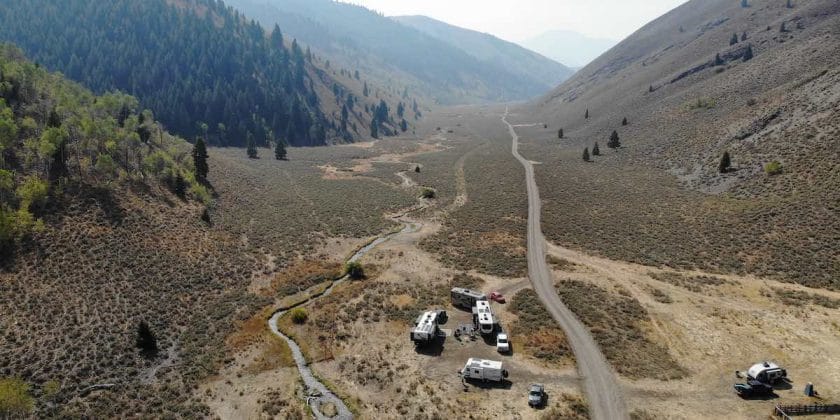
Table of Contents
How Much Does It Cost To Live In An RV?
If you are looking to travel and adventure and get out and see and do a lot it can cost you $5000 – $10,000 a month. If you are good boondocking and doing free things and traveling at a slower pace it can cost way less. Anywhere from $2000 – $5000.
In the end no one can really determine these costs for you. Instead you need to look at your current bills, spending habits and how you want to live and travel in the RV and work out your total from there.
Our post will get into all of this and will help answer all of these questions. We also have a post: Living In An RV Full Time: How Much Does It Cost?

Featured Retailer: etrailer.com
For almost anything you would need or want for your RV, no matter if it’s a motorhome, 5th wheel or travel trailer, etrailer.com has it! Click here to explore etrailer!
What are the top RV-friendly destinations or campgrounds?
Exploring new places is a significant part of RV living and one we highly recommend and love about this lifestyle! Our top scenic destinations include almost anywhere out West. From Glacier National Park to Yellowstone National Park and doing an Utah Road Trip . The West has so many great RV trips to offer.
If you are looking for RV specific trips check out: RV Itinerary West Coast – 26 Epic Places To Stop and East Coast RV Trip Itinerary – 16 Awesome Stops To Make !
Can You Live Full Time In An RV?
Absolutely! Plus you can do it long term too! We did it for 8 years with our 4 kids. The community of people living full time in an RV is growing like crazy. People are looking for the freedom and love the idea of traveling the country. Read on to see if full time camping life is for you!
There is no way I can share all about RVing with kids in a blog post so I wrote a book!
Full-Time RVing With Kinds – An Insider’s Guide To Life On The Road!
That is 257 pages packed full of the information you want to know before starting your RV living full time adventure!
What RV Is Best For Full Time Living?
The answer really varies depending on how you want to travel in your RV. If you plan to stay put for long stretches go as big as you can. If you want to travel a lot and visit National and State Parks something smaller makes more sense.
We cover more of this in our post see keep reading to find out!
How much does it cost to buy an RV, and what are the ongoing expenses?
How much it costs to buy an RV really depends on what kind of RV you want to get. We know of people who bought a $4000 dollar RV to start their full time RV adventure. We also know others who spent over $100,000 on their RV.
There are even rigs that are in the half million range! It really depends on the money you have, what luxuries you want, and how much you want to spend.
In our case we started with a $70,000 RV (our 2006 Newmar Kountry Star Class A diesel Pusher) but got a 15 year loan so we had a monthly payment of about $500 a month.
On going expenses of RV living will vary depending on how you want to travel and live. If your goal is to get out and see and do a lot it is going to cost more versus if your goal is to stay in one place and save money. For us we have spend between $5,000 – $10,000 a month.
How do I handle mail and receive packages while living in an RV?
There are a variety of mail services like Escapees where you can set up a mailing service. This can be more difficult depending on what state you live in and if they offer this service. But Escapees is very helpful in getting it all figured out for you.
We were lucky to have parents that would do this for us! Same as the mail service about once a month they would send us our mail and would also keep an eye out and would ask if it was OK to open it if something came that looked like it should be opened and read immediately.
Is RV living more cost-effective than traditional housing?
The short answer is it can be! The long answer is it depends on how you want to live the lifestyle. If you want to move into an RV to save money you can. Especially since you won’t have a mortgage and all the bills.
However, this also means you will want to find places you can stay for a reasonable amount each month. The best way to lower the cost of living is to stay at places for a month at a time. A lot of campgrounds give you a discount if you stay for a month.
Hitting the road
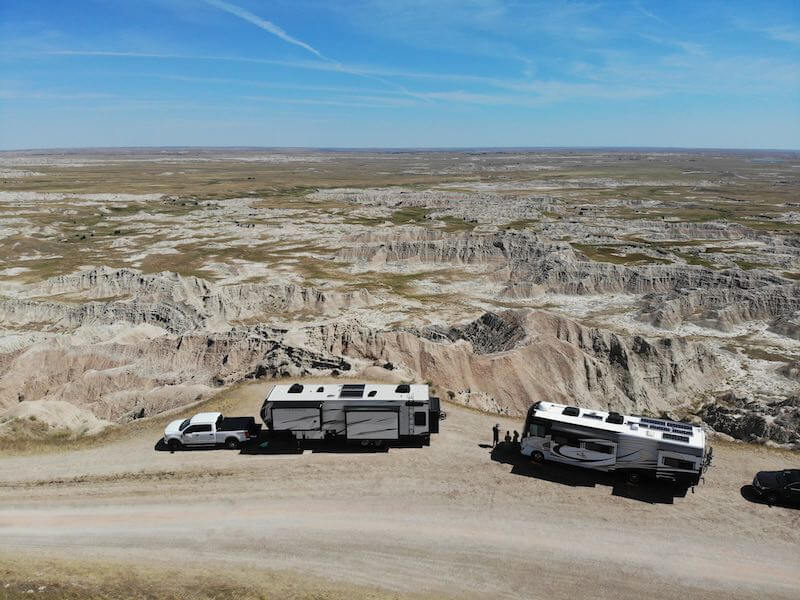
Knowing your Why
I can’t stress how important this is. When we hit the road we quickly found out it is not all rainbows and sunshine and if we didn’t know our reason for choosing this lifestyle, it makes the hard times even harder.
Our why was to spend more time together as a family with less distractions from things and activities.
Here is our story about how we became a Full Time RVing Family .
This isn’t vacation
There is a difference between being on vacation and traveling full time. Your home is always with you, which means so are all the worries and chores that come with it . . . Plus when you go to a new location you don’t have a vacation budget to blow on doing all the fun and cool things. You have to get creative and find as many free things to do as you can!
How will you travel
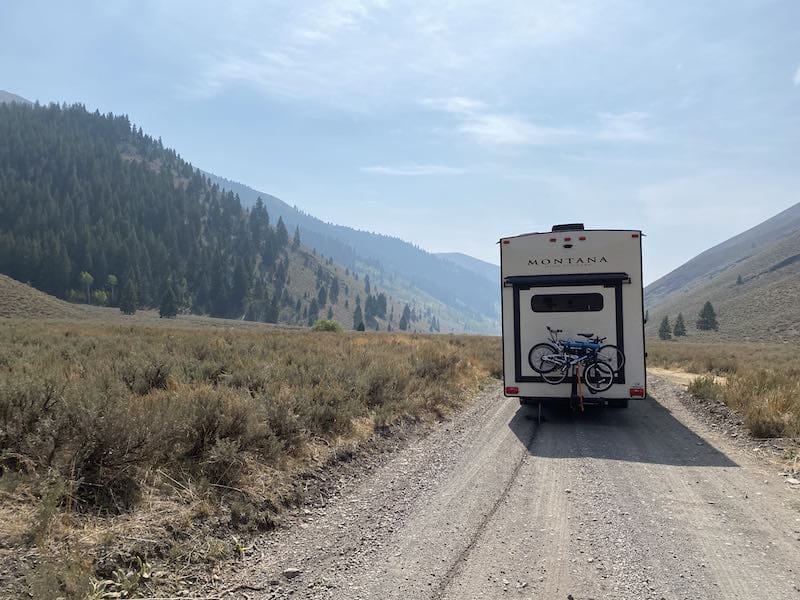
There is such a variety of ways that families do full time RVing. You have your slow travelers who stay in one place for weeks or months, your boondockers who try to rarely ever pay for camping, your Thousand Trails group who only stays at Thousand Trails parks, the list goes on (more on all these different styles below).
Be ready to plan
There is a whole lot of trip planning that goes into this style of living. It isn’t like having a house that you know you can go back to every night. Instead you have to be sure you have a campsite booked or somewhere in mind to stay for the night – each and every night! You become a full time RV trip planner!
In the Summer when kids are out of school there are a lot of people traveling which means places book up and they book up early (like again 6-12 months). So keep that in mind when looking at summer travel.
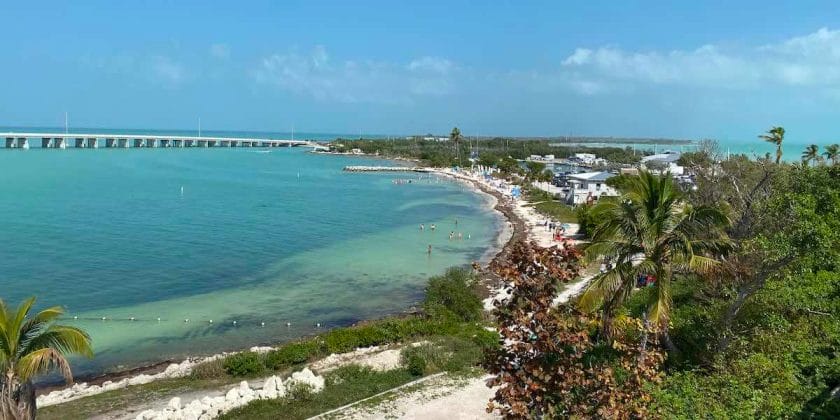
This came as a surprise to me (being from Wisconsin I just assumed most places down south were warm all winter! Not the case.) If you are looking for warm swimming weather with shorts and tank tops all year your options are pretty limited.
To get that type of weather, you usually have to be south of Orlando, in Arizona or Mexico . . . Not saying you can’t stay further north, but just know that the weather is going to be cooler the further north you get.
This being the case, Florida and Arizona are PACKED in winter with RVers. Both families and retirees. This means that planning ahead is usually a necessity. If you want to get the exact places you are looking for.
With a Thousand Trails membership we are able to book sites online up to 90 days out (memberships vary with this number) and then we can cancel them. So if we aren’t 100% sure what we are doing we may book a set of dates and then go and change them or cancel them if we change our plans.
You have to be comfortable with uncertainty and also comfortable with the fact you may end up boondocking somewhere for a few days if nothing is available. It is up to you to decide how that feels to you.
Expectations
We highly recommend setting realistic expectations. If you think living in a small space with your family 24/7 isn’t going to be hard at times, you aren’t preparing yourself. This lifestyle has its challenges. If you accept that and anticipate it you will be more prepared when they happen.
Here is a post we wrote on the evolving emotions of full time RV travel .
Here is a great post about safe RVing .
RV Purchase – What type of RV is best for my needs? (Class A, Class B, Class C, travel trailer, camper van, etc.)
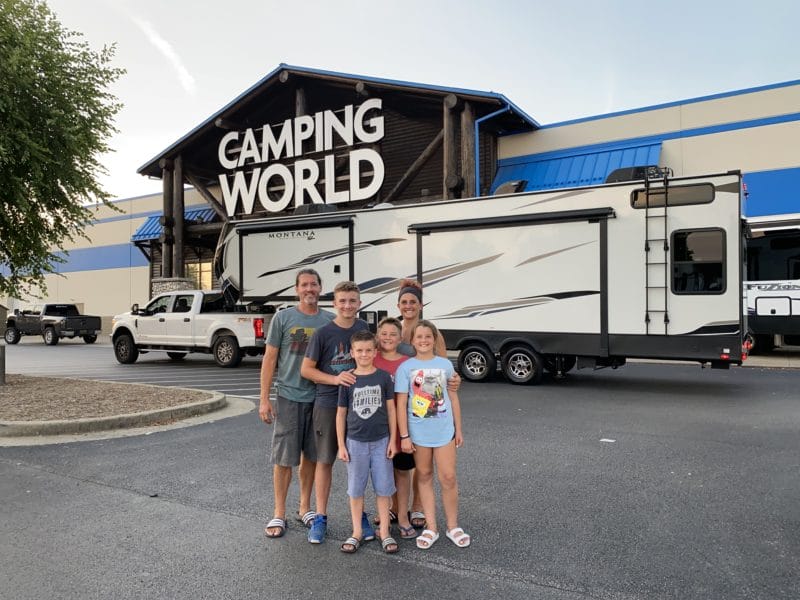
Buying an RV
This is such a fun part on this journey, but also stressful! This isn’t just your place to go on the weekends, it is where you are going to be living. That adds a little more pressure to picking the right RV camper.
There is everything from camper vans to gigantic 5th wheels ! It can be hard to pick.
Another option is to do an RV rental first. To help you decide what you like. We have a post here on tips for renting an RV and one here on tips for planning an RV trip .
What are the essential amenities and features I should look for in an RV?
We put a lot of thought into our purchases (We have had 5 RV’s since getting on the road in 2014) and for the most part were happy with what we chose each time. Really think through where everything is going to go that you want/need to bring with you. Do you have a lot of camping gear , Kayaks, Paddle-boards, indoor toys, kitchen products?
Where will everyone sleep – will that work? What about the dogs bed – is there a spot on the floor for it? Is there a place for all the clothes to go? Is there a desk area or place for the computer?
Thinking about the things that we knew we were going to want and need room for was helpful in narrowing down our decision.
The big question is always what size RV you should get.
We wrote a post to help you figure that out: Everything You Need To Know To Pick An Awesome Family RV.
Our first RV:
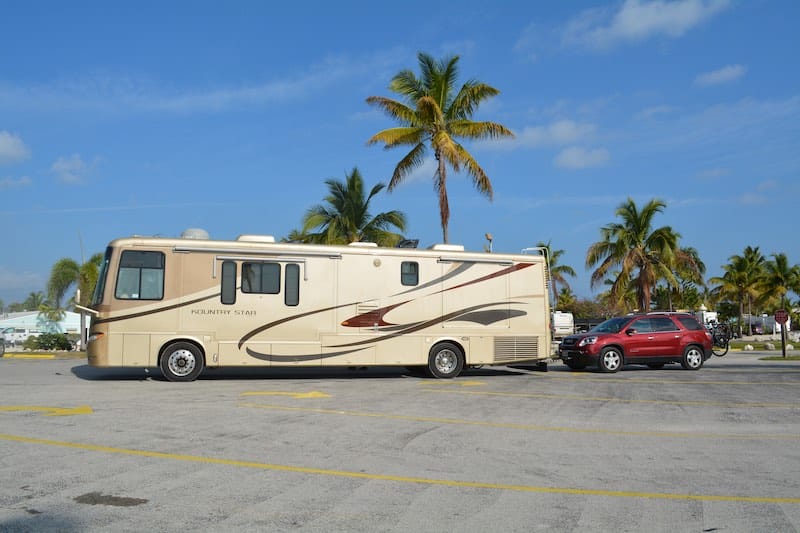
Our 2nd RV:
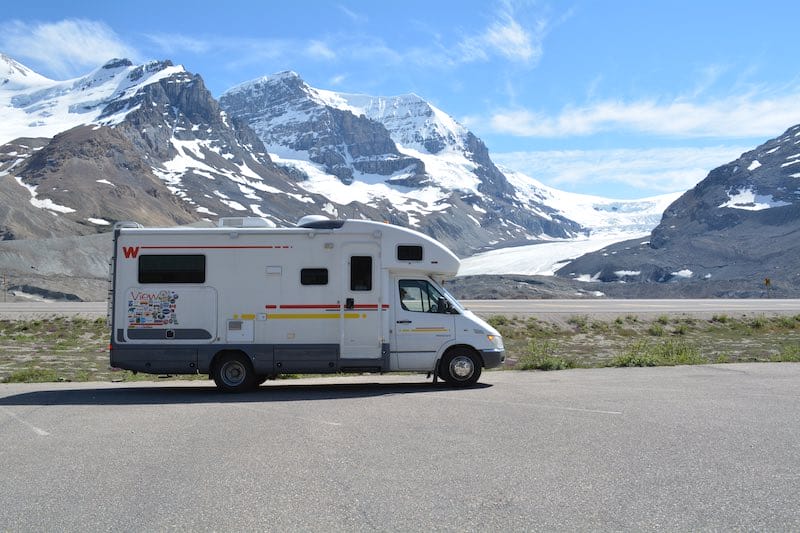
Our 3rd RV:
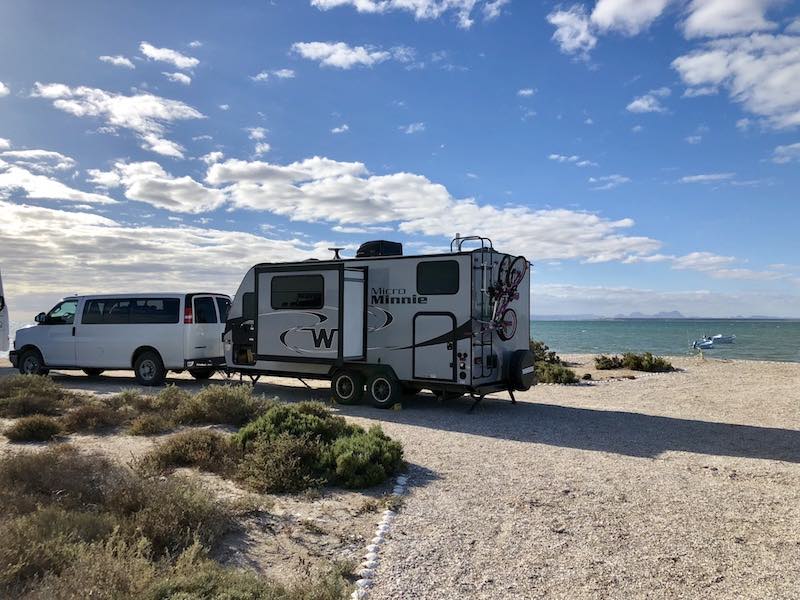
Our 4th RV:
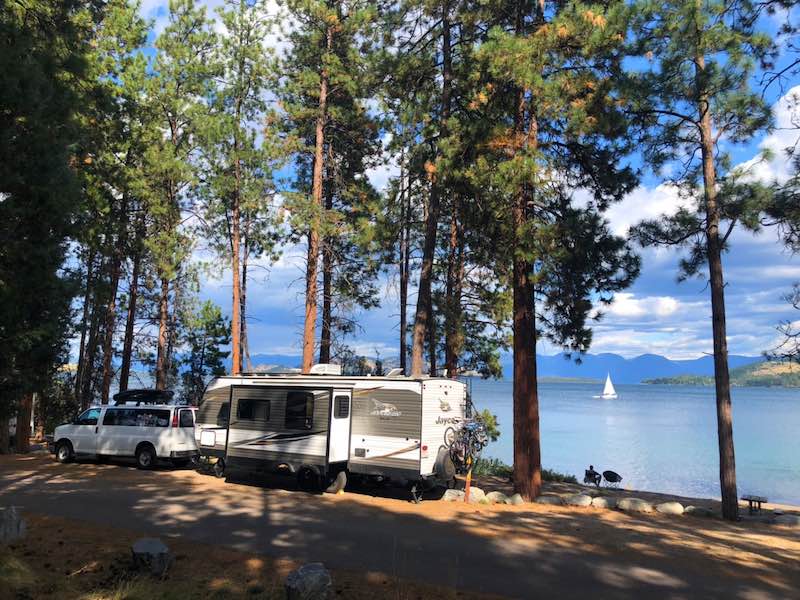
Our 5th RV – Keystone Montana 5th Wheel:
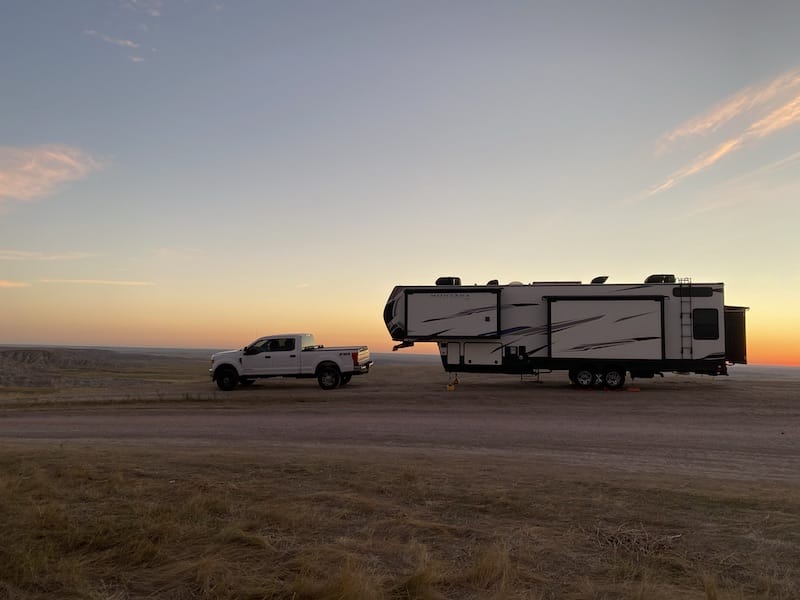
We chose to start BIG and got a 39 foot motorhome with 4 slides, then went small and are now back up to a 36 footer.
Our post on downsizing: Why We Decided To Downsize Our RV
Here is a video of us shopping for our last RV:
Be sure to follow us on Youtube, Instagram, Facebook, TikTok, Pinterest, all the places!!
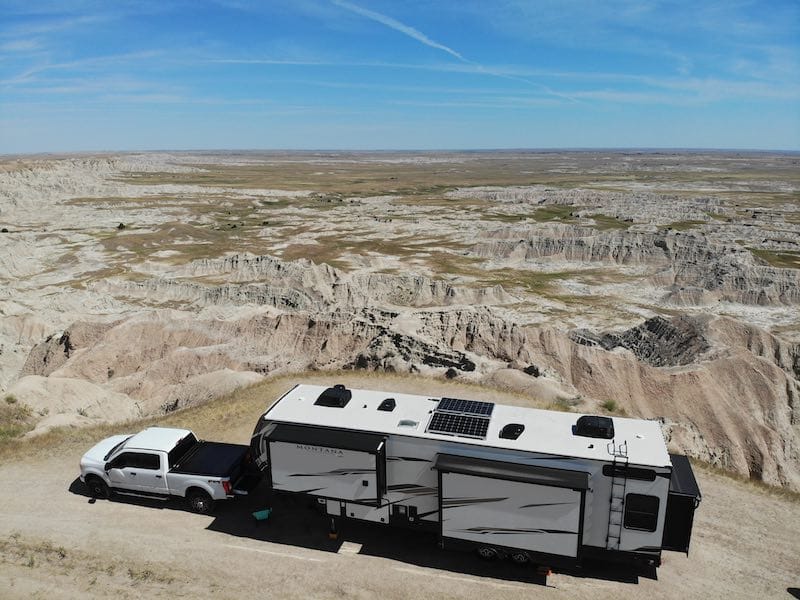
If you can, add solar to your rig ASAP! It will give you the opportunity to go out and boondock (camp without hookups). We have been to so many amazing places boondocking.
We had our current solar setup installed by Future Solutions in Indiana and they did an amazing job!
With our Keystone Montana High Country 335BH it came pre-wired for solar which saved a lot of time and money on the whole process of getting solar installed.
We currently have:
- Precision Circuits Battery Guard
- Magnum MS2000 Inverter
- Victron MPPT Solar Controller
- Magnum Remote
- 2 x 300 watt panels
- 4 Battle Born GC2 Lithium Batteries
We plan on expanding on this system since our usage demands more panels and batteries…full-time living!
Making it your own
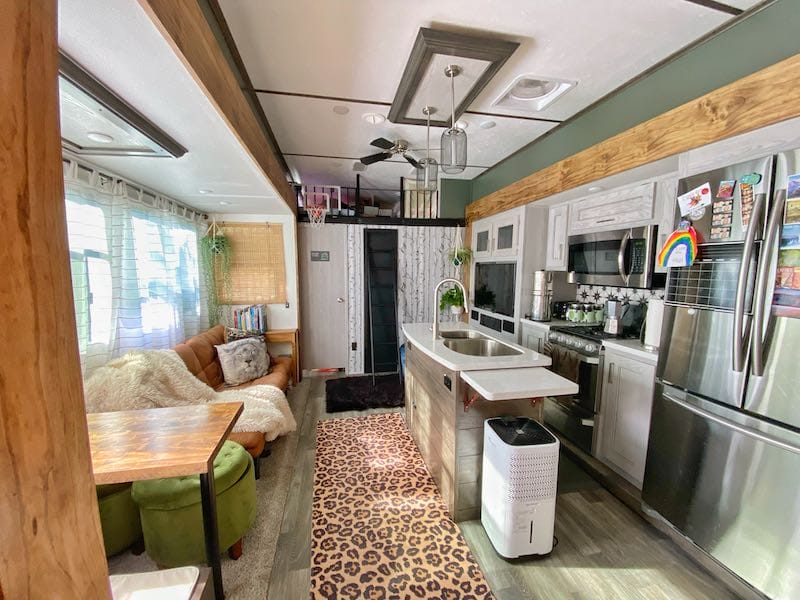
Moving into an RV (which is now your tiny house on wheels) you still want to make it your own! We had so much fun doing this with every rig we have had. With our first rig we took out closets and sinks and added bunks and shelves. We also ripped out all of the old fashioned looking decor and made curtains to hang.
Plus we painted the whole RV. Nothing really different here. Craig just primed the walls and we painted them with normal paint. Nothing special.
We were very happy with everything we did and really enjoyed living in it that way, but when it came time to sell we had to repaint everything back to a neutral color. I guess we didn’t have to, but the majority of people shopping for an RV are going to be looking for a more factory style. Just something to keep in mind.
You can check out our posts on our remodels here:
RV Remodel: How to fit 6 people and 2 large dogs in a Class A RV
Awesome Travel Trailer Remodel Ideas [Video Included!]
2 Week Complete RV Remodel For Under $2000 [Video Included]
Fun And Simple RV Remodel Ideas For Your 5th Wheel
Check out RV Inspiration for RV decorating and redesign ideas.
Have some fun here and come up with a name for your house on wheels. We still haven’t done this and just call ours The Rig, but I know other people have come up with some really cool and unique names! We would love to hear yours so shoot us a message!
Towing a car or buying a Vehicle to tow it with
Pretty late in the game we learned that there are only certain vehicles that can be towed 4 down behind a motorhome. Wait you can’t tow a minivan?! Crap! I think there are a few older models you can, but it is a pretty small list.
Here is a great list to determine what vehicles can be dinghy towed – 4 down.
If you are buying a truck to tow your 5th wheel or trailer just remember this is also the vehicle you will be driving around to attractions, the grocery store, parking structures, etc. Nothing like driving a dually in a busy city, but hey, sometimes that’s just what you got to do.
Also be aware of weight and how much your trailer/5th wheel will weight with EVERYTHING in it. Here is a post we wrote for Winnebago that talks more about this: Picking A Family Friendly Vehicle To Tow A Travel Trailer
RVing Full Time
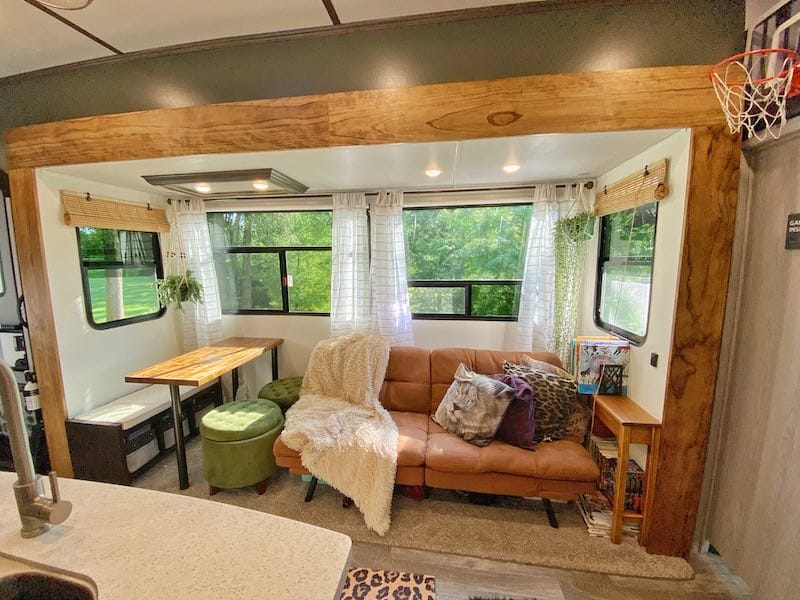
Simplifying
Over the years we have learned that the less things we have the more space we have and that is a good thing. Plus almost everything we have gotten rid of we haven’t wanted back and don’t miss.
Same thing goes for outside toys – things like a big grill, a ton of lawn chairs, yard decorations, things like that. Believe me setting them up and taking them down starts to get really old really fast.
That being said we are really happy when it is cold and our friends have a clam tent and we do borrow my parents grill for grilling now and then :).
Here are a few tips on how we keep our life simplified: simplified . And check out these tips on tiny living!
Kitchen accessories
It is all about minimizing. Unfortunately, a lot of big kitchen appliances probably aren’t going to work. Instead we focused on things we were going to use day in and day out. If we didn’t use it in a month it was gone.
Here are our recommended Kitchen Accessories .
I can’t believe how many clothes I use to have in our old house. I had 2 closets full! Now I have one bin full and a few hangers and that is it.
It really is kind of crazy, but what I have learned is that I really only wear a small number of clothes. Granted if I had to go into work every day or dress nice, I would probably need more, but that is one of the many benefits of this lifestyle. I can wear yoga pants or work out clothes every day!
Craig always laughs at me, but going to a new grocery store every few weeks has its challenges! This means I can’t always buy the same brand or don’t know where the exact food I want is – since it is a new store with a new layout.
But all that aside, it really is like shopping for groceries when you live in a house minus having the basement or garage space to stock pile when there is a great sale. Other than that, it is all about getting use to the space you have and then learning how much you can and can’t buy.
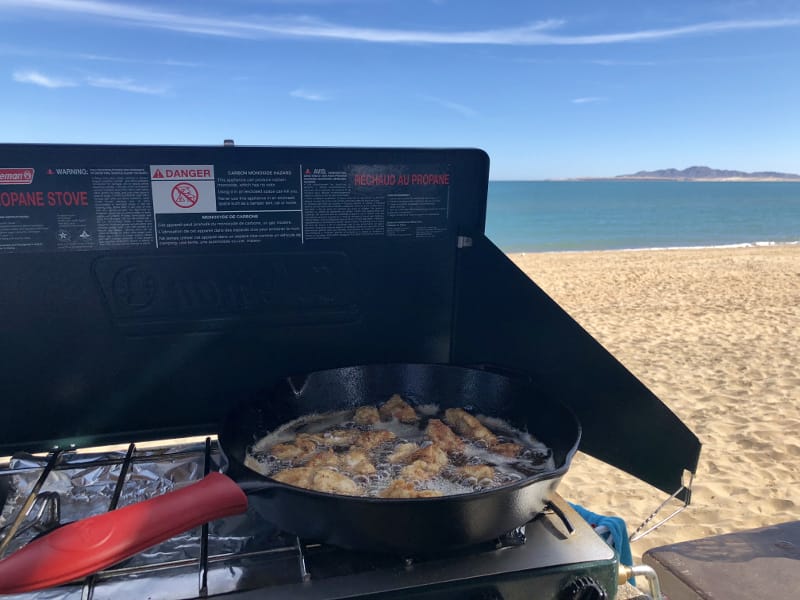
I can’t tell you how many people have said to me “What do you eat?!” The funny thing is we pretty much eat the same things we ate when we lived in a house. We have a fridge, oven, and stove top, plus appliances like a toaster, donut maker, Instant Pot etc.
The difference is you probably won’t have a huge kitchen to spread out in. I will say I also bake a lot less in the RV. Just not as much room for all that.
The fridge will probably be smaller (unless you get a residential fridge – which people do) and overall storage space for food is usually less, so your shopping style may change – no more stock piling those canned goods!
Internet – How can I stay connected to the internet while on the road?
Oh the Internet . . . I think it is a good thing that we left our house right after we got rid of cable and moved to internet TV watching. Also before our kids started wanting to stream from their iPads. Reason being we don’t know what we are missing not having reliable internet all the time to handle all that bandwidth!
If you need internet to run your business, DON’T rely on campground wifi. SERIOUSLY. It rarely works and when it does you normally have to be at the club house or a designated area for it to really work.
Instead we recommend getting your own hotspot. If you always need a connection and don’t want to stress about having to drive to a location (hello Starbucks), then you may want to get a Verizon and an AT&T plan. Plus a booster. . .
I will say we have made it work (running multiple online businesses) with just a Verizon hotspot, but there have been campgrounds and locations where it was a total nightmare and a booster or AT&T would have worked.
Here is a post from the amazing Technomadia team (not saying you need all of this – we don’t have it all – but interesting to see what is possible!).
Our Mobile Internet Setup – 15 Years Of Staying Online
Pets – Is it possible to have pets while RV living, and what are the considerations for their well-being?
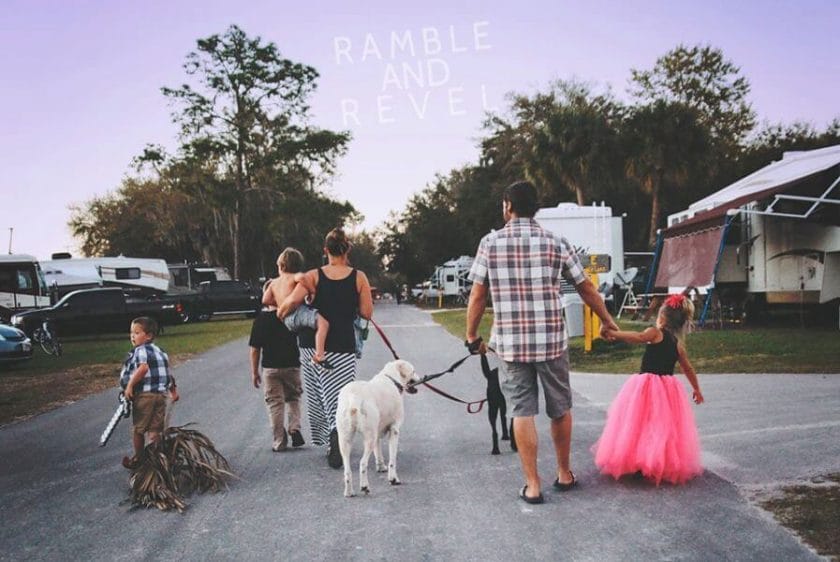
When we decided to RV full time, we knew we would be bringing our pets with us. That was part of the reason we went with RVing since they could come with us. It has its challenges, but what you will find is most RV parks are filled with people with pets.
You can check out our post about it here RVing with dogs .
We have had to put both of our dogs down while being on the road. They both were getting old when it happened and not doing well, so we had to make the hard decision to put them down. Both times we found a vet and made sure to find a place we could get them cremated so we didn’t have to leave them behind. For us it was the best solution in the situation.
It was horrible and sad, but it was all possible. We had no idea if cremation would be an option. Had it not been where we were we would have gone somewhere where it was.
Cost of Full Time RVing
There are so many different ways to live this lifestyle. Some do it for saving money, other do it because they want to get out and travel and saving money isn’t why they choose the RV life. For is it was never about saving money.
We have heard you can do the full time RV lifestyle for $2,000 – $3,000 a month. We fall more into the $7,000 – $8,000 range but if we really try we could probably do about $4,000 – $5,000 a month.
Please note we move a lot. If we choose to stay put in places for longer things would cost less. Instead we normally move every 4 days or so. If your goal is to save money by living full time in an RV it can be possible. Below we hit the costs of full time rving that we have seen.
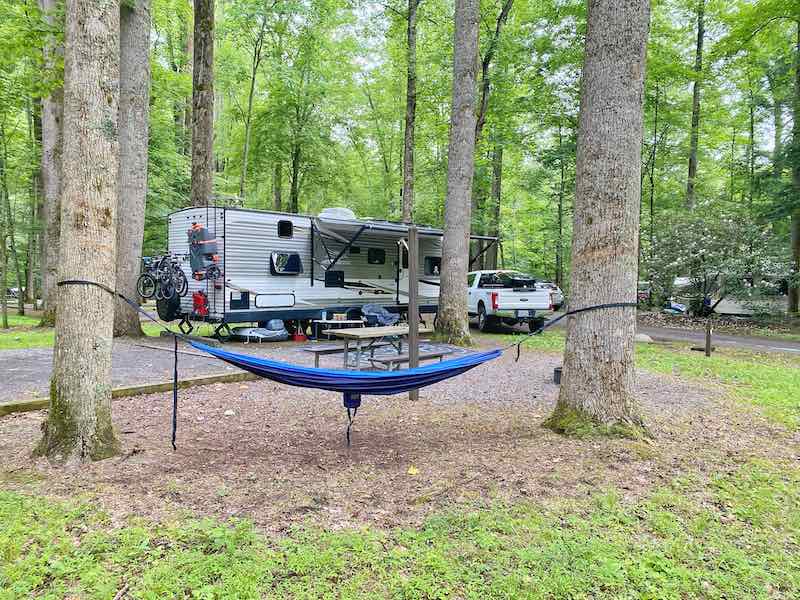
I think we thought living in an RV was going to be a lot cheaper than living in a house . . . It can be.
In our case we have an RV payment – on our first RV it was $532 then for the next few it was around $300. Plus if we stay at campgrounds that can be a $600 – $800 a month so right there we are getting close to what our mortgage was (minus property taxes).
Here are detailed write-ups on how we afford full time travel. Plus a couple months of detailed budgeting for our family. Our goal when we started was $4000 a month but we were closer to $7000 – now as the kids have gotten older it is closer to $8000 or sometimes more.
How We Afford Full Time Family Travel
Full Time Family Travel Budget For A Family Of 6 Plus 2 Dogs – September 2016
Full Time Family Travel Budget For A Family Of 6 Plus 2 Dogs – October 2016
Video with us talking about how we afford full time family travel:
Campgrounds
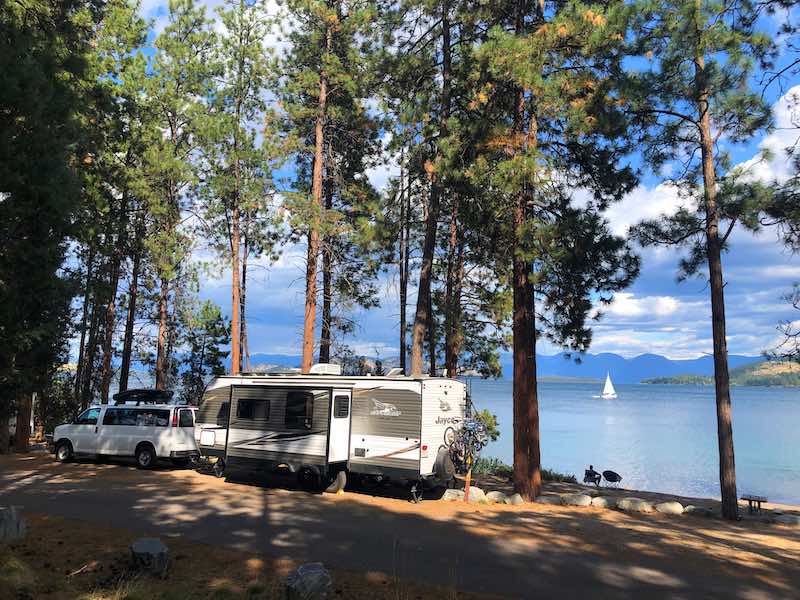
Campground prices range from $0 a night to $200 a night. It all depends what you are looking for. If you purchase a membership like Thousand Trails – you pay a flat one time fee to buy the membership.
In our case we bought a used one for $3000 then we pay $545 a year. We bought our used membership here: Campground Membership Outlet.
Once that yearly fee is paid we can stay for “free” at these campgrounds around the US. We have mixed feelings about them. Some are really nice, others are not so great. They are normally pretty far from attractions and a lot of the time our Verizon hotspot does not get coverage . . .
However they are great for meeting other full time traveling families!
We love staying at state and national parks which can range from $25 – $60 a night and normally don’t have full hook ups, but instead just electric and maybe water.
Then there are private RV parks. There are times we really like these concrete centric RV parks with full hook ups and a nice clean setup – and cable – the kids love cable :).
Then there is BLM land and boondocking opportunities where you can stay for free but have no hook ups. You find most of the BLM land on the west coast – not as much on the east coast. Here is a post we did on how to camp for free or close to it in the US .
Here is a post we have on our top 15 favorite RV campsites in North America .
Memberships
There are a decent amount of RV memberships sites out there. We belong to:
Fulltime Families – all about families traveling fulltime in their RV. Lots of great resources and rallies! Click here to join Fulltime Families !
Thousand Trails – as mentioned above. Great for inexpensive camping (once you buy the membership) and for meeting other full time traveling families.
Passport America – great discounts on campgrounds (usually for one to two nights, but sometimes more).
Good Sam – We don’t really use this one, but when you RV full time you have Good Sam . . . you can be the judge of that one.
Harvest Host – Great opportunity for staying for free at wineries and breweries!
Boondockers Welcome – An awesome way to find unique stays on people’s property around the US!
Reciprocal Museum Membership – a great one for deals on science museums , natural history museums, children’s museums and more!
I know there are more out there but that is what we do for now.
Have an RVer in your life? Check out these Best Gifts for RV Owners – 43 Gifts They Will Love
Health Insurance
If you work for a company you probably have health insurance through them, so you are good to go. If you don’t you may need to get insurance elsewhere. We have gone the route of the Marketplace/healthcare.gov – https://www.healthcare.gov and it has worked great for us. Just make sure you know where you coverage works – ER visits are the only thing that works out of state for us.
We also purchased a Teledoc plan, which I would HIGHLY recommend.
Here is a great post about Healthcare Options .
For RV insurance I recommend you research which companies currently will cover full time RVers and also get a plan to cover your things in the RV.
RV Maintenance and Repairs
RV’s take a lot of maintenance and repairs. What we have learned over the years and lots of repairs and maintenance is the more you can do yourself the better!
YouTube university has almost everything you need. You just have to be willing to go out and learn.
If that isn’t your gig there are a lot of mobile RV techs around the country. A lot of them are full time travelers themselves so it is a good way to get help if you need it.
For maintenance, always be sure to stay on top of it. It will help eliminate potential issues.
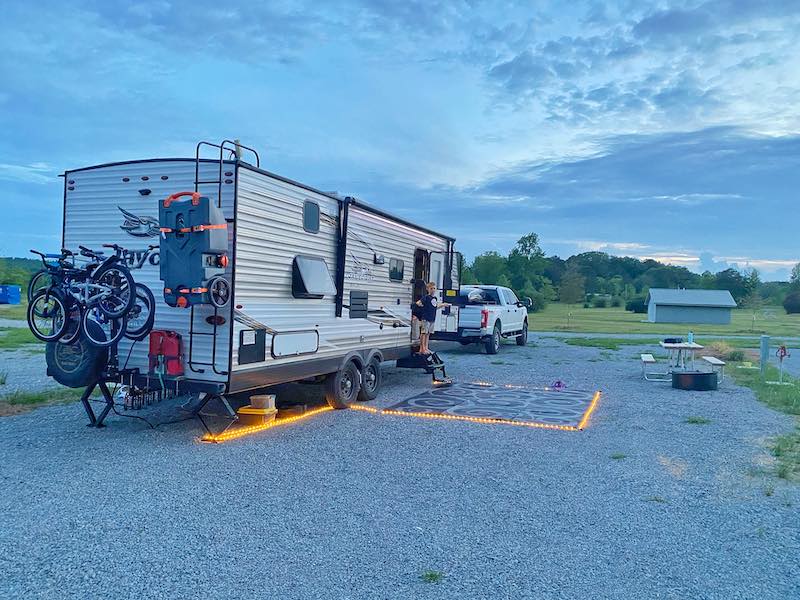
Here is a list of our favorite RV blogs that we come back to time and time again:
Technomadia.com
Winnebago.com
The Republic of Nomads
Escapees RV Club
OR else we google it :).
Full Time RVer Blogs
Here is a list of our favorite blogs of other families or couples who are (or have) traveled full time in an RV:
Follow Your Detour
Drivin’ & Vibin’
Fulltime Families
Ditching Suburbia
The Wanderpreneurs
YouTube RVers
Looking for inspiration through You Tube? Here are some great channels from full time RVers!
Our Channel :)!
Less Junk More Journey
Keep Your Day Dream
Project Trek
Our Podcast 🙂 – we come and go with it but will be adding more episodes soon!
Check out this post by Boondockers Welcome: Top 5 Podcasters For RVers
Instagrams To Follow
Us – Crazy Family Adventure
The Mom Trotter
Lanes Less Traveled
Big Hearts Tiny Spaces
The Wanderprenuers
Elementary Explorers
The Runaway Parents
Restless_Russells
Facebook Groups To Join
Full Time RV Family
RVE Entreprenuer
Technomadia
What Happens When You Want To Get Off The Road?
After 8 years of full time RV travel with our 4 kids we knew it was time for our family to get off the road. It wasn’t an easy decision in some ways. In other ways it was easy since we knew it was time. When you know you know.
Here is a post we wrote about it: Getting Off The Road After 8 Years Of Full Time Travel
Want even more content on Full Time RV Living?! We have you covered:
Crazy Family Adventure Podcast
How We Keep Our Life Simplified
Full Time Entrepreneurs
The Hardest Thing About Life On The Road
RV Living With Kids – What We’ve Learned After 2 Years
10 Unexpected Things About Living In A RV Full-time
How I started my business
10 things we learned from 365 days of living and traveling in an RV
7 Things We Love About Full Time RVing
7 Things We Hate About Full-Time Family Travel
43+ Best Gifts For RVers
How To Make A Successful Income While Full Time RVing
How To Make Friends On The Road
10 Helpful Tips For Making Friends While Living Fulltime In An RV
Keystone Montana – 7 Owners Share What They Love About It
29 RV Kitchen Accessories For The Best RV Kitchen
Top 15 Best Things To Do With Kids In Austin
Pin This Post:
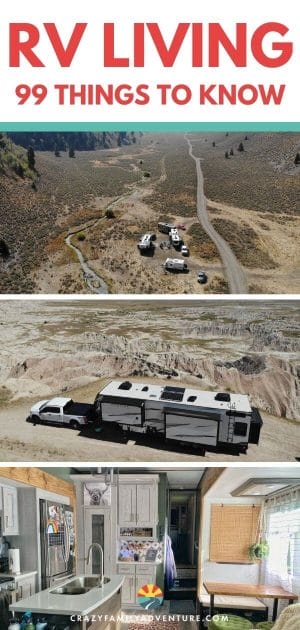
This post may contain affiliate links.
- Recent Posts
- 18 Tips On How To Rent An RV - March 25, 2024
- Dog Sledding in Quebec City - March 20, 2024
- Touring The Ice Hotel In Quebec City - March 20, 2024
DISCLOSURE : This post may contain affiliate links, meaning I get a commission if you decide to make a purchase through my links, at no cost to you. Please read my disclosure for more info.
29 thoughts on “Our Best RV Living Tips After 8+ Years On The Road”
We are getting our travel trailer in January and I’m looking forward to getting on the road and out of our comfort zones.
Awesome! You’ll find those comfort zones getting pushed very quickly when you start your journey. Best of luck!
Loved the article but it took forever to load and scroll scroll scroll and read because of sooo many ads 😊 Thanks!
Thanks for the feedback. We updated some settings on the ads.
Hi! We are a family of five. We started traveling in our RV in 2014 and have grown the travel to about eight months out of the year but still have not let go of our house. We hope to get it on the market in April and take the leap! So scared, excited, unsure etc. Thanks for your inspiration and I’ll look to your blog whenever I get the jitters!
It’s definitely a tough leap to sell the house, but it’s worth it. Best of luck!
It is great to read an article from someone like minded. We are on the same page with you all the way!
WOW! I mean seriously WOW! What a wonderful experience and I’ve been dreaming about travelling with my family like this one day. Well done on the photos, they are great captures.
Thanks Ken!
Thanks so much for the shout-out! This is a great summary not only of your “what” (RVing the states) but your “why” – why it’s really important to you and what it means for your family. You are an inspiration to many to go out there and take life by the horns and have some fun! We’ve so enjoyed getting to know ya’ll. 🙂
Thank you Ashley!
I just found your blog and full-time RV-ing/roadschooling is a dream of mine and my husbands. I love your site because you have a “big” family and so do we. I love seeing someone in our same situation making it happen. We hope to make the dream a reality in the near future!
Thanks Charlynn! Hope to see you on the road 🙂
Thank you for sharing your experiences! We are preparing to retire early and set off on an RV lifestyle adventure in about 18 months. Seeing others making it work is invaluable.
And to add some encouragement for you, years ago when my children were young, I homeschooled/unschooled them for the majority of their education. We were fortunate to have moved across the country for work a few times and had the opportunity to do a lot of camping. They are now both rising seniors in college and doing extremely well. They are pursuing their passions instead of checking a box. I know their unconventional formative years are a contributing factor to their life choices.
Keep enjoying the gift of time. Maybe we’ll see you around a campfire one day.
That’s great to hear Tracey. It’s great to hear of kids who have had the same schooling method are thriving! Best of luck to you all.
Hi Bryanna,
Thank you for sharing your full-time mobile lifestyle story. You have a darling family!
Since 2010 it’s also been my choice to live a mobile lifestyle — in a boat and a renovated Airstream — because I love the freedom and serendipity.
My son and his wife (who are in their mid-30s) have also been living mobile. We’ve all experienced the same steep learning curve. What we found unbelievable was that we couldn’t find an RV on the market that checked off all the boxes for full-timers. The manual even said, “Not suitable for full-time living.” (Really?!?)
Since we love to create things, this past year we took our combined experiences and produced a full-time “Living Vehicle” that’s made for full-timers. It’s spacious, well-equipped for the real world, and is truly off-grid capable with large dual paned windows, built-in solar panels, and 4-season-friendly designs and extra foam insulation.
We’ve included central vacuum system, large storage spaces, built an expandable outdoor porch, and created a Tech Bay so our phones and handheld devices are charged and easily stored out-of-sight.
Our Living Vehicle comes with a free 1/3/5 year bumper-to-bumper service plan that includes regular check-ups, Good Same Club emergency road service, and nationwide campground membership.
Check it out at https://www.LivingVehicle.com
Happy trails!
Super cool product, best of luck with it.
We sold the house, have the RV and are preparing to take the leap of faith with our 4 almost teenage kids and dog. We are excited and scared! Can u give some ideas of jobs that my husband could pursue so we can stay mobile? Sometimes we get mental blocks when we r thinking about something we haven’t done before.
Depending on your entrepreneurial spirit, you can always start a business of your own. We do have a course that helps narrow down the search for what is right for you. You can check that out here – http://www.crazyfamilyadventure.com/how-to-start-your-virtual-business-so-you-can-travel-full-time/ .
Hope that will help you! Good luck!
This article was very insightful. We just bought an RV this summer . We have 5 kids and besides a week camping trip here and there we weren’t planning on any extended stays. Now my wife is trying to relocate her job. We wondered if it was possible with all of our kids to make RV living work for a while. I feel better about it now. We moved from an ocean state to a desert state 6 years ago and neither of us have been happy living here. We try and get away as often as possible. Living near water is the key. Thank you for the insight!
Glad it helped David!
- Pingback: How 24 Full Time RVers Make Money On the Road | RV Inspiration
i only wished the RV’ing lifestyle would have been a thought when my children were young. I think it is awesome how your family has handled all of the changes. I am almost 50 and my husband is 53. We are hoping to be on the road by June of this year. My question is this: Do you know the easiest way to handle doctor visits and medication needs (such as insulin and seizure medication) when we don’t plan to return to our hometown on any schedule?Trying to eliminate having a zipcode is where i stand. Secondly, do you believe 2 people could afford to live on a disability check income for all the necessities? I truley believe that some of our health issues may love the adventure and appreciate what i can only see as a healthier, happier lifestyle.
There are plenty of people who get prescriptions filled while on the road. We usually take care of doctor visits when we go back to our home town. Our insurance still works there. We also have a teledoc service which is a doctor we do a videoconference with and they are able to diagnose and prescribe based on that call. It helps with small things and saves a trip to hospital/urgent care.
Regarding budgets – families (big and small) live this lifestyle on all different budgets. I think you could make do on disability.
My family has technically been RV compatible for 50 plus years. All of our surviving family members currently own one, but all for different purposes.
My parents chose to travel full time after retirement, but without a long term plan their traveling stopped when their money ran out. Because they continually “ upgraded” their coach in the first few years they died nearly penniless, still owning on their last class A which was tragically falling apart from 10 years of constant habitation.
My brother also lives full time in his motor home, but he owns the land where he lives, and still is living in his first coach. He realizes it won’t last forever, but it will last much longer not being stressed by road travel.
My sister recently purchased a travel trailer strictly for vacationing. She owns land and a home, so her use will be limited to only a few weeks a year.
My use of a travel trailer will also be limited to about six months of living while we build a new home. I spent three years in my first travel trailer saving to buy my first house over 35 years ago. If I learned one thing about this life it is that no lifestyle is without cost. What seems cheap today may end up costing you in the future.
All good points! This has not been a cheap way of living for us and we are aware of that.
Hello from Wisconsin guys!! My wife and I are in our late 20s both have very good jobs , college graduates, nice cars, and a very nice house. We’ve put the majority of our time/energy into achieving where we are now and what we have today. We have a four year old daughter and a almost nine month old son, we’re increasingly worried great jobs and all the extras we have aren’t what it’s all cracked up to be hahaha! We love Wisconsin but are always planning the next trip and trying to figure out how to spend more time with the kids and less at work. My wife recently became a consultant for a company allowing her to work from home and is growing her team which has us thinking about traveling for a few years until our sons ready for school. But the fear of leaving everything we’ve accomplished is overwhelming. We need a good push to make the leap lol any words of wisdom?
YOLO. Sounds funny, but it’s true. For us, it was asking ourselves the question – in 10 years will we regret not taking the opportunity to travel or if we do travel, will we regret the decision to leave everything? We opted to travel 🙂
Comments are closed.
Travel Trailers
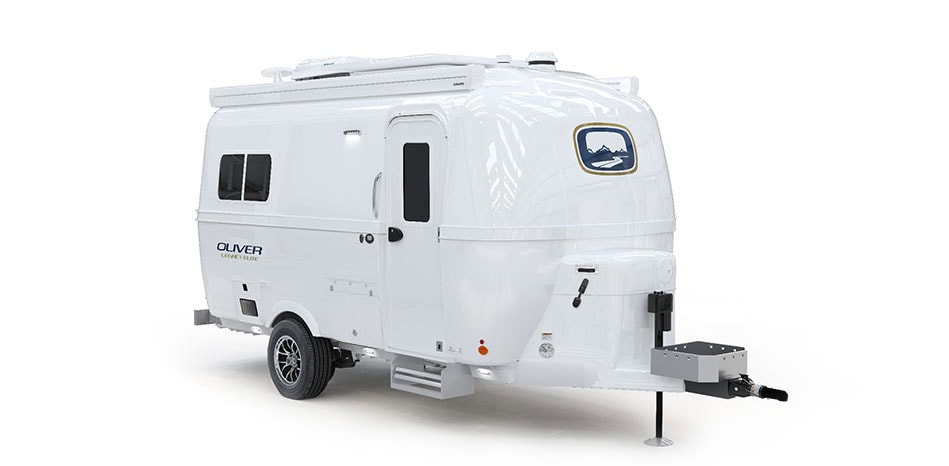
Shopping Tools
Owner resources, about our company, the beginner’s guide to full-time rv living.

Get Started Living in Your RV Full-Time
Living in your travel trailer during a road trip or short-term vacation can be an enjoyable experience when everything is done correctly, and your plans fall into place. It may even convince you that you are cut out for full-time RV living. Contrary to popular opinion, though, full-time RV living is not as easy as it may seem – especially to those with limited experience or knowledge of everything included in this hefty package. This beginner’s guide will at least help you to get started on the right foot by outlining everything you need to know to be successful.
Take Multiple Test Runs of Various Lengths
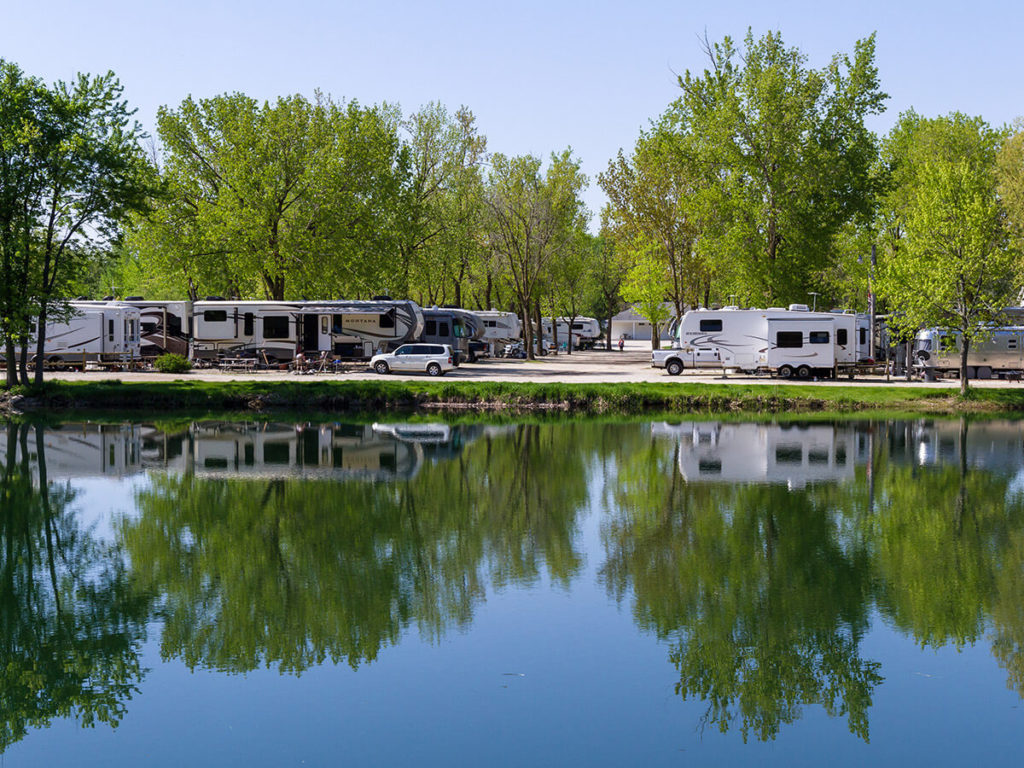
Before you dive into the wonderful world of full-time RV living, you should schedule a series of trial runs. This is not the type of lifestyle where you can go from 0-60 overnight. For instance, if your only experience with RV living is the weekend road trip that you took with your family across state lines, that is simply not enough. You should “test the waters” first by planning a series of test runs.
Extend your stays gradually in length to get a more accurate demonstration of what you will experience full-time. For instance, you may start with 3-5 day test runs. However, you should also ramp up those trials to 3-5 weeks and even 3-5 months before walking away from your typical home life for good.
Analyze the Size of Your RV vs. Space Requirements
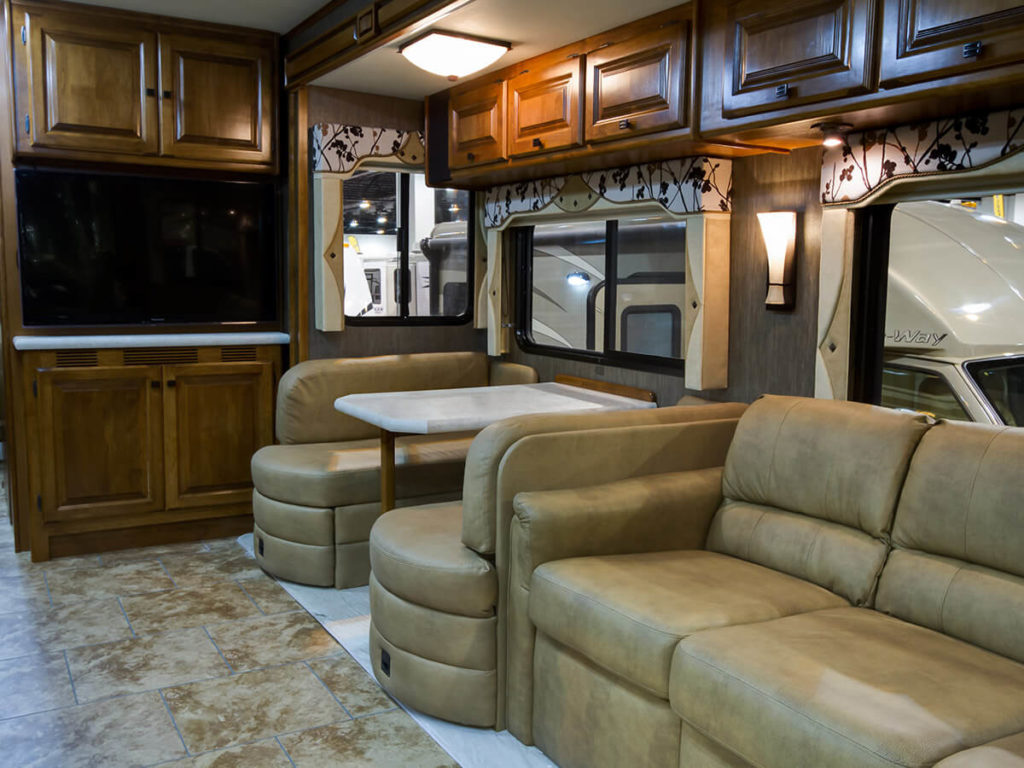
Another important part of the process to prepare you for full-time RV living is to analyze the size of your RV. Size does matter when it comes to packing up and literally taking your life on the road. For instance, you may have rented a more compact RV just to get from Point A to Point B during your last vacation. However, you must remember that your space requirements will drastically change with full-time RV living.
It is highly recommended to test different rig sizes when scheduling your trial runs and short-term vacations. This will get you comfortable with the various options available to you and help you to accurately determine which option is the most practical fit for your specific needs. See a few travel trailers for sale .
Shop Around and Simulate RV Life Before Purchasing One
Once you identify your specific RV needs for this full-time life change, it is time to go shopping! Keep in mind that this is not the same as shopping for any other vehicle. You are not buying a new car or minivan – you are essentially buying a home. Therefore, you should approach this shopping experience as you would any real estate transaction.
- Shop around with a few different dealerships/agencies to find the best deals available.
- Visit and explore the RVs in person. Online listings and photos will not tell you everything you need to know about your future home.
- Simulate RV life within each option that you seriously consider. For instance, lay on the bed to test its space limitations and comfort duration. Pretend to use the kitchen as if you were cooking a meal. Use the bathroom, sit in the tub, stand in the shower, etc.
One part that the RV shopping experience does have in common with vehicle shopping is the test drive. In addition to sitting in the driver’s seat, you need to be able to take the RV out on the road for a test drive to ensure it is a solid match.
Work Under the Hood & Become Comfortable with the Mechanics
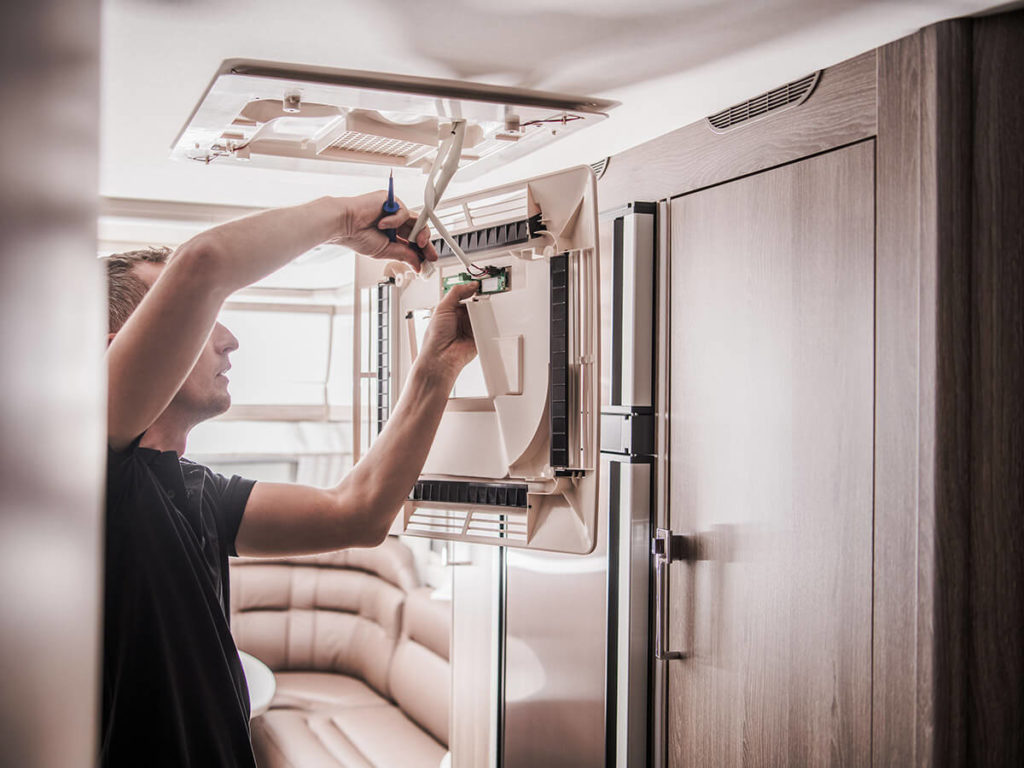
When renting an RV for a short-term vacation, you do not have to worry about the maintenance side of the equation very much. Depending on the conditions of your contract, the rental company may be able to bear the bulk of this weighty burden on your behalf. When you are living in an RV full-time, though, that full burden is placed on your shoulders.
Does this mean that you should be an expert mechanic (or at least have one living with you) to be successful? No! You should spend quality time with the RV , though – getting to know your future “home on wheels” a lot more than you currently do. For instance, focus on the fuse box, electrical system, and other key elements under the hood.
Familiarize yourself with all aspects of maintenance and repair that your RV may need along the way. From poorly sealed windows and roof leaks to wiring issues and engine tune-ups, you must be able to identify the various telltale signs & warning signals long before they escalate into RV life-threatening disasters.
Examine Your Inventory Closely & Cut the Fat
You may not realize it, but the old saying that “you can’t take it with you” applies to full-time RV living as well. As you walk throughout your home, you need to accept the grim reality that you will not be able to take everything with you. You must change your perspective regarding your expanding collection of “closet clutter” and general belongings. In fact, instead of viewing them as your “personal belongings,” refer to them as part of your inventory. This will help you to remove (or at least reduce ) your emotional and mental attachments, allowing you to view it more as a business owner instead of a homeowner.
Determine the high-priority essential items that will require a space within your RV.
More importantly, prepare yourself to “cut the fat” and sever ties with the nonessential items . Perhaps you can donate those items to charity or give them away to family & friends. You could even sell them in a yard sale or online auction. You should also consider investing in a self-storage option to store the items that you cannot get rid of completely but also cannot fit in your RV.
A cornerstone of successful full-time RV living is simplicity. If you are not able to simplify your belongings, then perhaps you are not quite ready for this major lifestyle change.
Budget, Budget, and Budget Some More
First-time RV travelers and other novices of full-time RV living may not fully understand the vital role played by their budget. A common misconception is that you will spend a lot less money on the road than when you lived in a home that could not hit the highway. This is the type of trap that will lead you to burn a large hole in your bank account and perhaps killing your dream of full-time RV living.
Create a strict budget before you hit the road . More importantly, calculate the various streams of income that you will still be able to generate behind the wheel.
For instance, you should consider your:
- Current balance of checking & savings accounts
- Income from interest-bearing financial accounts
- Income from remote work that you can do on the road
- Residual income (perhaps from commissioned sales)
- Retirement/disability/Social Security income (if applicable)
You must also focus on the short-term and long-term expenses you must pay at different stages of your life on the road.
It is easy to think about the standard vehicle-related expenses, such as oil changes, engine tune-ups, and gasoline fill-ups. However, the broad scope of full-time RV living includes quite a few additional expenses.
For instance, you must consider the:
- Campground expenses (if you plan to stay in RV parks and campsites each night)
- RV ownership expenses (i.e., monthly payments, insurance premiums)
- Maintenance, repairs and other unexpected/unscheduled expenses
- Groceries, clothing and other basic living expenses
- Comforts and recreation (i.e., dining out, entertainment, shopping, etc.)
Consider the Needs of Your Whole Family
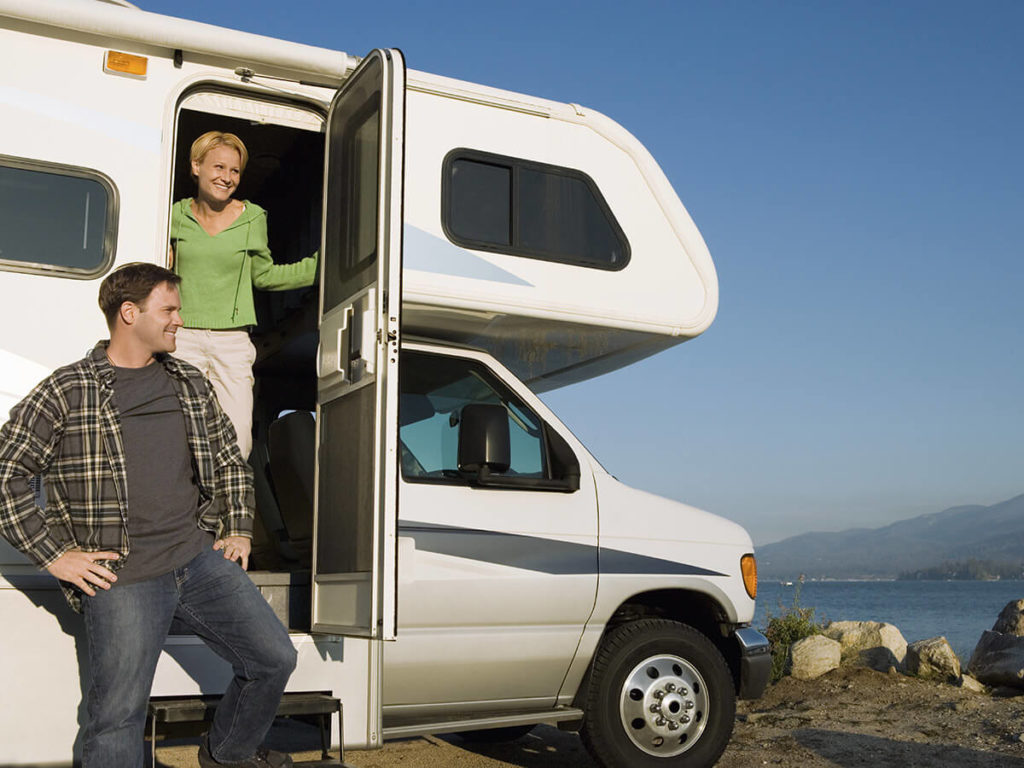
You must carefully consider the short-term and long-term needs of your family before you commit to full-time RV living. Once again, it is easy to think, “My family loved the RV lifestyle during our last vacation!” However, spending a weekend, week, or even a couple of summer months in an RV does not automatically mean that your family can handle full-time RV living.
Take the time to consider the needs of each family member. For instance, you should think about such areas as:
- Healthcare (i.e., in-network vs out-of-network medical costs, etc.)
- Education (i.e., homeschooling children, online college courses, etc.)
- Social life and personal development
You should also consider the needs of your canine and/or feline family members as well. This will play a major role in your campground selections because not all campsites are pet-friendly. In addition, there are additional expenses associated with having pets on the road. Fortunately, there are veterinary providers with branches and locations throughout the country.
However, you will still have to consider such factors as the temperature of your RV, microchips, vaccinations, waste disposal, and the various stops you will need to make just to cater to their needs. Therefore, an even bigger question to ask yourself is, “Will my pet(s) need to find a new home?” You may be able to answer that question with a resounding, “NO!” Nonetheless, it is still a question that you must ask and honestly answer.
Prepare for Life “Off the Grid”
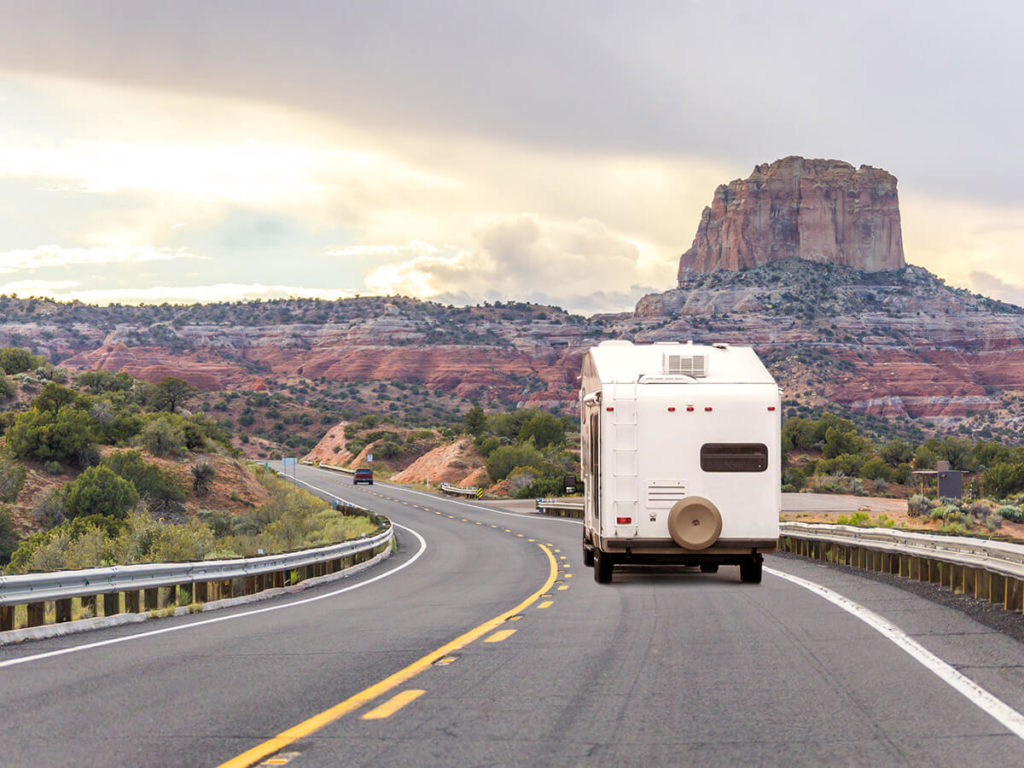
The popularity and prevalence of the Internet make it nearly impossible to imagine living life “off the grid” . Fortunately, even when living in an RV full-time, you can remain connected to the outside world. However, you may need to get creative and make a few wise investments before you hit the road to prevent extended periods of downtime.
For instance, you may need to use your smartphone as a Wi-Fi hotspot on the road. Therefore, you may need to reexamine your existing data plan to see if any upgrades are required. Perhaps you could also benefit from buying a cell signal booster or investing in a satellite option to keep you connected – especially if remote work will play a major role in your monthly income streams. Remember to consider the wide variety of coffee shops; rest stops, libraries and other public Wi-Fi hotspots that you will encounter on the road.
A good tip is to get used to living your life detached from the Internet and “the grid” now. Regardless of the signal boosters and hotspots, you may have, you will inevitably encounter dead zones along the way where you will have no other choice but to live offline for a while.
Continue to Research and Network with Other RV Owners
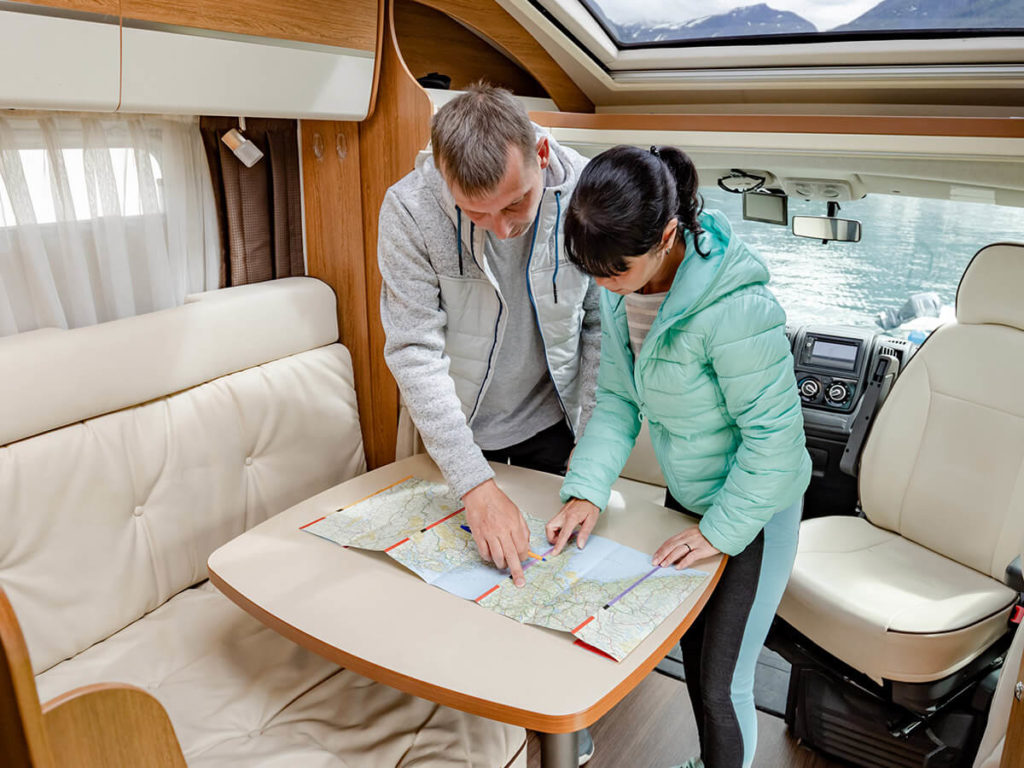
Once you have made the commitment and started to “live the life” of a full-time RV resident, this does not mean that your research and learning opportunities must end. You should continue to research RV life thoroughly because there will always be new aspects of this adventure for you to explore.
The community of RV owners will continue to grow year-after-year, especially with the increasing numbers of home-based businesses, telecommuting workers, and retirees that want to enjoy life on the road. This means that there will always be people that can teach you new tricks & tips or that will even pick your brain to learn the rules of the road themselves. Take the time now to research and bookmark a variety of online resources, forums, groups and even social media pages that can help you along the way. As the old saying goes, “many hands will make the load light” when it comes to managing a full-time RV lifestyle.
In addition to receiving a lot of help to benefit your family, think about the vast number of families that you will be able to help!
Maintain Realistic Expectations
It is easy to look at the overall burden associated with full-time RV living and say, “You know what? Never mind!” Realistically, though, the same could be said about any major life decision – such as buying a car, buying a home, moving to a different state/country, or even having a baby. The key is to take the necessary steps to prepare yourself and your family for the expected (and the unexpected) and maintain realistic expectations along the way.
As most full-time RV residents will tell you, the benefits can far outweigh the overall burden.
You just need to be honest with yourself and understand that it is not a decision that should ever be taken lightly or made on impulse.
More Articles
Related articles, oliver a pet-friendly travel trailer: a comprehensive analysis.
Discover the key factors that make Olivers pet-fri...
32 Frequently Searched Questions about Travel Trailers
Travel trailers are becoming increasingly popular ...
Ringing in the New Year in an RV: Roam, Revel, and RV Your Way to an Epic Celebration!
Explore the ultimate guide to ringing in the New Y...
Camping for Christmas with a Travel Trailer
As the holiday season approaches, what better way ...
Working Remotely From Your RV: The Ultimate Beginner’s Guide to Productive Travel
Discover the ultimate beginner's guide to working ...
Holiday Camping: Swapping Your Dinner Table for a Travel Trailer
Embrace the wilderness this Thanksgiving with our ...
Hard Alee Adventures with Their Oliver!
This is Jason, Kelly, and their poodle companion, ...
The Rising Trend of RV Living: Top Travel Trailer Blogs
Discover the rising trend of RV living with our to...
Boondocking: Essential Items for a Memorable Adventure
Are you looking to explore the great outdoors with...
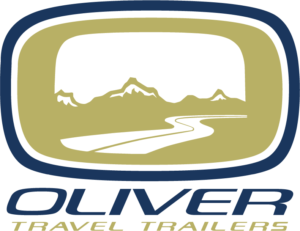
- Privacy Overview
- Strictly Necessary Cookies
- 3rd Party Cookies
We use cookies to provide the best possible experience with our web sites. This includes cookies that are Strictly Necessary for the site to work, help us understand site usage, help manage your preferences, and deliver advertising relevant to your interests. Cookie Policy .
Strictly Necessary Cookie should be enabled at all times so that we can save your preferences for cookie settings.
If you disable this cookie, we will not be able to save your preferences. This means that every time you visit this website you will need to enable or disable cookies again.
This website uses Google Analytics to collect anonymous information such as the number of visitors to the site, and the most popular pages.
Keeping this cookie enabled helps us to improve our website.
Please enable Strictly Necessary Cookies first so that we can save your preferences!
We have emailed you a PDF version of the article you requested.
Can't find the email?
Please check your spam or junk folder
You can also add [email protected] to your safe senders list to ensure you never miss a message from us.
FAA Issues Warning Of Air Travel Disruption During Total Solar Eclipse
Complete the form below and we will email you a PDF version
Cancel and go back
IFLScience needs the contact information you provide to us to contact you about our products and services. You may unsubscribe from these communications at any time.
For information on how to unsubscribe, as well as our privacy practices and commitment to protecting your privacy, check out our Privacy Policy
Complete the form below to listen to the audio version of this article
Advertisement
Sign up today to get weekly science coverage direct to your inbox
© 2024 IFLScience. All Rights Reserved
Newsletters in your inbox!
Subscribe today for our Weekly Newsletter in your inbox!
Air travelers could see delays and reroutes before, during, and after the event.
Holly Large
Jr Copy Editor & Staff Writer
Holly is a graduate medical biochemist with an enthusiasm for making science interesting, fun and accessible.
Book View full profile
Book Read IFLScience Editorial Policy
Maddy Chapman
Editor & Writer
Maddy is a Editor and Writer at IFLScience, with a degree in biochemistry from the University of York.
DOWNLOAD PDF VERSION

Lots of people could be traveling by air to witness the eclipse.
Image credit: RKrysko/Shutterstock.com
The US Federal Aviation Administration (FAA) has warned of disruption to air travel along the path of April 8’s total solar eclipse.
According to a statement released by the agency, air traffic and airports should prepare for disruption to normal proceedings before, during, and after the event, starting from 10:00 am UTC on April 7 through to 4:00 am UTC on April 10.
Though the eclipse itself will only cover the US between around 6:30 pm to 7:40 pm on April 8, this extended period is likely because it’s expected that lots of people will be descending upon areas in the eclipse’s path of totality , via plane, in order to get the rare opportunity of seeing a total solar eclipse. After all, the next one in the contiguous US isn’t scheduled to be until 2044.
“There may be a higher traffic volume than normal anticipated at airports along the path of the eclipse. Traffic should anticipate delays during peak traffic periods. Parking may be limited – particularly at the smaller, uncontrolled airports,” reads the FAA’s statement, with the agency listing over 400 airports that could be affected.
It’s not just delays on the roads around airports that could be a problem for people either. The statement also warns that aircraft “should be prepared for potential airborne holding, reroutes, and/or Expect Departure Clearance Times (EDCTs)”. That’s not just helpful information for pilots – if you’re planning on traveling by air in this area during this timeframe, you may well end up delayed.
Airports and air traffic aren’t the only ones to have been on the receiving end of a warning about the eclipse. Recent weeks have seen emergency officials put out warnings to residents in the path of totality to stock up on essential supplies , including for pets , whilst some schools in affected areas have been asked to close.
For those heading into the crowds, whether by plane or by other means, you could be in for a spectacular sight – as long as the weather doesn’t end up being cloudy .
“During the 2024 eclipse, the Sun will be in or near solar maximum, when the magnetic field is more like a tangled hairball. Streamers will likely be visible throughout the corona,” according to NASA . “In addition to that, viewers will have a better chance to see prominences – which appear as bright, pink curls or loops coming off the Sun.”
“With lucky timing, there could even be a chance to see a coronal mass ejection – a large eruption of solar material – during the eclipse.”
Sounds pretty great – so don’t forget to pack your eclipse glasses so you can watch in wonder safely.
ARTICLE POSTED IN
United States,
air travel,
total solar eclipse
More Space and Physics Stories

Rare Dust Particle Trapped In Ancient Meteorite Is Older Than The Sun

How To Best Photograph The Upcoming Solar Eclipse

A Neutron Star’s Jet Speeds Have Been Measured For The First Time

Childbirth Vs Pain In The Balls

What Happens During A Post-Mortem? Find Out In This "Living Autopsy"

What Does The "H" In Jesus H. Christ Mean? A Bible Scholar Explains All
Ohio mother who left toddler alone when she went on vacation is sentenced in child’s murder
An Ohio woman whose toddler died after she left her alone for more than a week while she went on vacation was sentenced to life in prison without parole Monday, the Cuyahoga County prosecutor said.
Kristel Candelario, 32, pleaded guilty last month t o aggravated murder and endangering children in connection with the death of her 16-month-old daughter, Jailyn, last year.
Candelario left for vacation June 6 and left Jailyn alone. She visited Detroit and Puerto Rico, the prosecutor’s office said.
When she returned on June 16, she found Jailyn dead and called police, authorities said.

Jailyn died of starvation and severe dehydration due to pediatric neglect, Dr. Elizabeth Mooney, the deputy Cuyahoga County medical examiner, said in court Monday. The manner was ruled homicide.
The child was extremely dehydrated and emaciated, weighing 13 pounds, 7 pounds less than in her last doctor's visit less than two months before, Mooney said.
Mooney, who conducted the autopsy, called Jailyn's death "one of the most tragic and unfortunate cases I’ve had in my career thus far." She said the child could have suffered for possibly a week.
In a statement Monday, prosecutor Michael C. O’Malley called Jailyn “a beautiful baby girl who was taken from this world due to her mother’s unimaginable selfishness.”
Candelario told the court Monday that “every day I ask forgiveness from God and from my daughter Jailyn.”
She also asked forgiveness from her other daughter and from her parents.

Candelario’s attorney, Derek Smith, said that no one was trying to excuse her behavior but that Candelario was struggling emotionally and was overwhelmed as a single mother of two children.
Candelario had tried to harm herself earlier in 2023 and she had been placed on antidepressants, which she stopped taking without tapering down in dosage as required, which can cause side effects, Smith told the court. Candelario was "not thinking clearly," he said.
“I am not trying to justify my actions, but nobody knew how much I was suffering and what I was going through,” Candelario said through an interpreter.
Assistant Cuyahoga County Prosecutor Anna Faraglia told the court Monday that Candelario had left Jailyn alone for two days immediately before she left on vacation.
"The thought of this child dying every day while she's having fun — humanity can't stomach that," Faraglia said. "And those are the actions that need to be punished. She abandoned her daughter and left her for dead."
In sentencing Candelario, Cuyahoga County Common Pleas Judge Brendan Sheehan noted that the police and the medical professionals involved called it one of the most horrific cases they’d ever seen.
“It stunned people across this world, because it defies one of the basic human responsibilities,” Sheehan said. He called it “the ultimate act of betrayal.”
Phil Helsel is a reporter for NBC News.
Reddit's IPO is set to make the 'front page of the internet' public
- The "front page of the internet" is finally ready to go public.
- Reddit shares start trading on the New York Stock Exchange on Thursday.
- Here's what you need to know about its IPO as it targets a $6.4 billion valuation.

Reddit might have been self-anointed the "front page of the internet" almost two decades ago, but its time to face the public has just arrived.
The social-media forum is set to list Thursday on the New York Stock Exchange — marking a milestone for the company created in 2005 by a pair of college roommates from the University of Virginia.
Back then, Steve Huffman and Alexis Ohanian, its cofounders who'd go by the usernames spez and kn0thing, respectively, worked under the stewardship of the veteran Silicon Valley investor Paul Graham to build a social platform just as Mark Zuckerberg was taking Facebook mainstream.
After bringing Aaron Swartz on board — the late computer programmer then known as a developer behind RSS feeds — the company was ready to capture the attention of people using news-aggregation services like Digg by offering its own take.
The launch of subreddits in 2008 made for a turning point as communities grew around interest-based groups on the site. However, the freedom given to anonymous users to roam without oversight has left it to contend with a reputation of being social media's underbelly.
While it grew through a sale to the media giant Condé Nast in 2006, before being spun out to its parent company, Advance Publications , Reddit has struggled to find a path to profitability.
Though it has taken its time, Reddit finally seems ready to prove its doubters wrong.
On Wednesday Reddit priced its shares at $34 , at the top of the range, implying a $6.4 billion valuation. The IPO is set to be one of the largest listings in recent memory in a test of investor appetite.
There's a lot of uncertainty in the run-up to the day.
Related stories
Despite being created at a similar time to rivals such as Facebook and X, Reddit's platform has an average of 73.1 million daily active users, a far cry from the roughly 2 billion and 245 million daily users those two services have respectively.
Lower losses
Meanwhile, the IPO market more broadly has suffered a drought in recent years as uncertain market conditions have threatened to chop down ambitious valuation targets. Investors must weigh Reddit's current health to determine whether its target valuation is valid.
In its IPO filing last month, Reddit revealed that revenue had grown by about 21% last year, while its net loss at the end of 2023 was $90.8 million, down from $158.6 million the previous year.
Those losses haven't dissuaded investors just yet, it seems. Reddit's IPO is between four and five times oversubscribed, Reuters reported Sunday citing unnamed sources.
Still, as my colleague Peter Kafka has noted , that's still a lot of money for Reddit to burn. In part, it's been spending heavily on engineering talent: about $439 million, or 55% of its revenue, went to research and development, which included engineer salaries.
No doubt, part of the bet investors will be making is that the R&D spend is focused on the technology of the moment: artificial intelligence .
In its S-1 filing with the Securities and Exchange Commission, Reddit positioned itself as an indispensable component of the generative-AI boom. It described its content as a "foundational part of how many of the leading large language models ("LLMs") have been trained."
Reuters reported last month that Reddit had sought to monetize that content by striking a licensing deal with Google to make its data available to the search giant's AI models for $60 million a year.
That could boost those with a stake in the IPO, like OpenAI CEO Sam Altman, whose holding of Reddit shares could be worth between $51.4 million and $56.4 million .
Reddit plans to list 22 million shares raising about $750 million, with loyal Redditors getting a chance to purchase stock in addition to the usual crowd of institutional investors.
The internet's front page is about to become much more visible.
Watch: What happens when Elon Musk moves markets with a tweet
- Main content
- Share full article
Advertisement
Supported by
Reddit Prices I.P.O. at $34 a Share, in a Positive Sign for Tech
The social media company raised $748 million in the offering. Its shares begin trading on the New York Stock Exchange on Thursday.

By Mike Isaac and Lauren Hirsch
Mike Isaac has covered Reddit since 2010 from San Francisco. Lauren Hirsch reports for DealBook from New York.
Reddit on Wednesday priced its shares at $34 for its initial public offering, at the high end of expectations, in a sign of investor demand for growing tech companies.
The San Francisco-based social media company had estimated that its shares would be priced at $31 to $34. The $34 price put Reddit’s value at $6.4 billion, below the $10 billion valuation it fetched in a private fund-raising round in 2021. The company raised $748 million in the offering.
Its shares will begin trading on Thursday on the New York Stock Exchange under the ticker symbol RDDT.
The pricing was a favorable signal for start-ups and venture capitalists, who have been closely watching Reddit’s offering as a test for private tech companies angling to brave the public markets. Activity has been slow, with just over 100 companies going public in the United States last year, roughly a quarter of the number that went public in 2021, according to data compiled by Renaissance Capital, which manages exchange-traded funds that focus on I.P.O.s.
“There was some concern over the demand for tech heading into 2024,” said Matt Kennedy, a senior strategist at Renaissance Capital. But Reddit’s pricing, alongside a successful first day of trading on Wednesday for Astera Labs, an artificial intelligence company, was a “good sign for the rest of the pipeline,” he added.
Shares of one of last year’s hottest tech company debuts — Instacart , the grocery delivery company — are up roughly 58 percent this year. Shares of Arm, a chip designer that also went public last year, are up about 90 percent in the same period.
The offering is a boon to Reddit’s largest shareholders. They include a co-founder, Steve Huffman, who holds a 3.3 percent stake; Advance Magazine Publishers, which is affiliated with the parent company of Condé Nast; and a unit of Tencent, the Chinese internet giant, called Tencent Cloud Europe. Alexis Ohanian, the other co-founder, was not listed in Reddit’s filings as a principal shareholder.
Reddit’s path to the public markets has been long. Founded in 2005, the company was an early form of a social network, growing up when Facebook was still nascent and MySpace was in its heyday.
Reddit relied on old-school-style message boards, which were largely text-based, divided by topics and browsed by pseudonymous commenters. The company was sold to Condé Nast in 2006 for $10 million, then was spun out after years of stagnation under previous management.
For years, Reddit’s revenues were scant. It experimented with different forms of moneymaking, including a community-based gifting economy that some enjoyed but that did not yield robust results. After a series of community revolts and a revolving door of chief executives, by 2015 Reddit had more than 100 million users but only $12 million in annual revenue. That year, Mr. Huffman, who had left in 2006, returned to lead the company.
In the years since, Reddit has built its advertising business, which now accounts for the vast majority of the company’s income. Revenue was $804 million last year, up about 21 percent from a year earlier. Net loss was $90 million, compared with a $158 million loss the year before.
Reddit has also built out a data licensing business, selling information on its users’ discussions and trends across the site to hedge funds and Wall Street firms, which use the information to gain an edge in trading.
More recently, Reddit has tapped into its vast troves of conversation data to market itself as a repository for training large language models, which help artificially intelligent computers learn speech abilities that are more human. The company expects to make more than $200 million over the next three years in these kinds of deals it has struck with Google and others.
Perhaps Reddit’s biggest obstacle to a smooth I.P.O. has been its users. The thousands of forums, or “subreddits,” that make up the site are overseen largely by a volunteer force of moderators. Some have resisted the idea of Reddit’s being a public company, concerned that market forces and the quarterly demands of shareholders will corrode some of the features that made the site so attractive to them.
Mr. Huffman has said the anxiety over going public has been a part of a normal “maturation process.”
“We have the same love for Reddit — and the same fear of losing Reddit — that our community does,” he told The New York Times last year .
Among the investment banks that led Reddit’s offering were Morgan Stanley and Goldman Sachs.
Mike Isaac is a technology correspondent for The Times based in San Francisco. He regularly covers Facebook and Silicon Valley. More about Mike Isaac
Lauren Hirsch joined The Times from CNBC in 2020, covering deals and the biggest stories on Wall Street. More about Lauren Hirsch

COMMENTS
It also helps to be in Europe where buses and flights and Airbnb are pocket change, you can get a nice place for $150 a week and a flight for $15, unlike North America where good budget flights are pretty rare and a cheap room is $75/night. You can get by on $1000 a month. Less in many other places.
I traveled 80% of the time, US only, in 2023 and I agree with this post. Sure, it was neat visiting cities I've never been to and going to art museums and other cultural things I enjoy, but nothing beats chilling with friends even in less remarkable towns. And work travel can be pretty lonely! pepperoni93.
UK here. 25 days annual leave days but as I've been at my job over 5yrs I get 28 days per year. Usually take 5 days off at a time with weekends on both sides which gives you 9 days. Been to Copenhagen, Stockholm, Bilbao, Sicily so far this year and heading to Porto in a couple of weeks. Will still have 5 annual leave days up my sleeve.
I'm working on this myself - still a year or two out, I think, but my goal is to be full time traveler (by some definition) by 2025, 2026. Since I'm not there yet and only have my moderate amount of research, planning, and daydreaming to rely on, take this with all the salt in Utah.
I actually have free time to do things I want. Now some cons. -its a small space and you will feel cramped sometimes. Almost like you cant have "me" time. -when traveling, your constantly looking out for people who might hit your house. -changing drivers license can be a huge pain in the ass in most states.
Before our rental over the summer, we'd only done one previous RV relocation for $1 a day. So we had a lot to learn about RVing. Today, I'll share nine things I learned in my first six months of full-time RVing. Get the latest points, miles and travel news by signing up for TPG's free daily newsletter.
Life as a full-time traveler is a bit of everything. It's complex, ever-changing, exciting, and even nerve-wracking at times. In this series you'll find a variety of posts that follow my personal journey of life as a full-time traveler since 2006, through 65+ countries. Come along with me!
Tip #6: Create prioritized itineraries. This is huge because limited vacation = less time to explore. So, prioritize what you want to see and tackle those things by creating detailed itineraries. Fast vs. slow travel is a matter of personal preference but the more you can squeeze in, the more you will see.
How to travel while working. When we first started traveling together almost 20 years ago, my husband Charles and I had full time jobs. We started out taking weekends off to travel, then two week vacations, working remotely while spending months in Mexico, and eventually a year long trip through Southeast Asia, Australia, and New Zealand.
Thinking about embracing full-time RV living? Get the inside scoop on what it's really like from a couple who have been living on the road since 2019. From the thrill of exploring new places to the not-so-glamorous task of emptying the black tank, this article covers the pros and cons of full-time RV living. There were a lot of things I loved about living tiny in an RV for a year traveling the ...
5. Short-Term Contract (2-6 months) Contract work is often a great way to gain international experience and travel while maintaining a 9 to 5. Essentially this means that your company sends you to a different country for a brief amount of time to complete a specific project.
Seriously get insurance. None of us are invincible and the last thing you want while traveling is to be detained in a country because you can't pay your medical bills. For full time travelers there is no better company out there than World Nomads. 9. Go to the Doctors & Stock Up on Medication.
Heather may have started the Great Resignation movement. In 2017, she quit her job to travel the world full time. Since then, she's been to six continents and 33 countries (and counting) enjoying adventures such as seeing the Big 5 in Africa, watching the sun rise and set over the Moai on Easter Island, ziplining in Costa Rica, drinking malbec in Mendoza, and getting stuck in New Zealand ...
Money is the biggest hurdle people face when it comes to leaping into the full time travel lifestyle. Surprisingly, for Heath and Alyssa, full timing opened a lot of doors for their business. Since moving into an RV, they've visited all 50 states, filmed a documentary, been on live national and international television, filmed a tv show ...
Here are some ways to travel whether you're a full-time worker or a college student. 1. CHANGE YOUR MINDSET. Studies show that employees are happier when they take vacations (DUH!) and have increased productivity when they return to work. If travel is something you really want, you've gotta start prioritizing it!
Full time RVing can be surprisingly expensive. Lastly, what no one tells you about living in an RV full time is that it may be more expensive than you originally thought. This may not be true for everyone, but our personal experience is that it is significantly more expensive. You try to anticipate your costs, RV insurance, car/truck payments ...
Full-time travel allows us the time to learn a little of the language, meet locals and go beyond the tourist attractions and hopefully understand more about everyday life in a new place. Of course, a full-time traveler is still an outsider looking in, but if you use the opportunity full-time travel provides to go a little deeper then your ...
Our FAQ is constantly being updated with more information and you can start here with regards to trip planning if you need tips, advice, or have questions about planning your travel to Japan. You can also join our Discord community, comment in our stickied weekly discussion thread, or check out r/JapanTravelTips for quick questions. Thank you!
Traveling full time means you are stripping away and leaving a community of friends and family who can help to alleviate the stresses of parenting. You can't call a friend or babysitter to watch your kids for a few hours. You can't send them to their best friend's house so you can have two hours of quiet to decompress.
Not first time, but one time my gf and I got the clearance from the homeowner to use an upstairs bedroom and a friend of ours that was there heard and came up was shaking the knob and saying stuff. She didn't care and told him to fuck off. That girl was awesome.
Travel Trailer - 21′ Winnebago Micro Minnie 2100BH. Our 4th RV: Travel Trailer - 30′ Jayco JayFilght 26BHSW. Our 5th RV - Keystone Montana 5th Wheel: 5th Wheel - Keystone Montana High Country 335BH. We chose to start BIG and got a 39 foot motorhome with 4 slides, then went small and are now back up to a 36 footer.
Extend your stays gradually in length to get a more accurate demonstration of what you will experience full-time. For instance, you may start with 3-5 day test runs. However, you should also ramp up those trials to 3-5 weeks and even 3-5 months before walking away from your typical home life for good.
Image credit: RKrysko/Shutterstock.com. The US Federal Aviation Administration (FAA) has warned of disruption to air travel along the path of April 8's total solar eclipse. According to a ...
The child died. An Ohio woman whose toddler died after she left her alone for more than a week while she went on vacation was sentenced to life in prison without parole Monday, the Cuyahoga County ...
A highly fatal form of avian influenza, or bird flu, has been confirmed in U.S. cattle in Texas and Kansas, the Department of Agriculture announced on Monday. It is the first time that cows ...
Reddit might have been self-anointed the "front page of the internet" almost two decades ago, but its time to face the public has just arrived.. The social-media forum is set to list Thursday on ...
You can RV full-time with fewer than 40 bath towels. Trading a 30,000-pound coach for a 3,000-pound travel trailer means just what the math says: Get rid of 90 percent of your stuff. You now have roughly a dozen tiny storage cabinets, where you may have had 20-30 or more large residential-style ones before. So carefully, carefully plan and load ...
The San Francisco-based social media company had estimated that its shares would be priced at $31 to $34. The $34 price put Reddit's value at $6.4 billion, below the $10 billion valuation it ...